International Conference on Applied Sciences and Smart Technologies
2nd InCASST 2025 (International Conference on Applied Sciences and Smart Technologies) will be held on October 15th, 2025 in Yogyakarta, Indonesia on hybrid mode. The theme of this conference is "Innovating for Sustainability: Digitalization, Green Energy, and Achieving Energy Independence for a Greener Future". We would like to invite researchers and practitioners in the fields of applied Mathematics, Electrical Engineering, Informatics, and Mechanical Engineering.
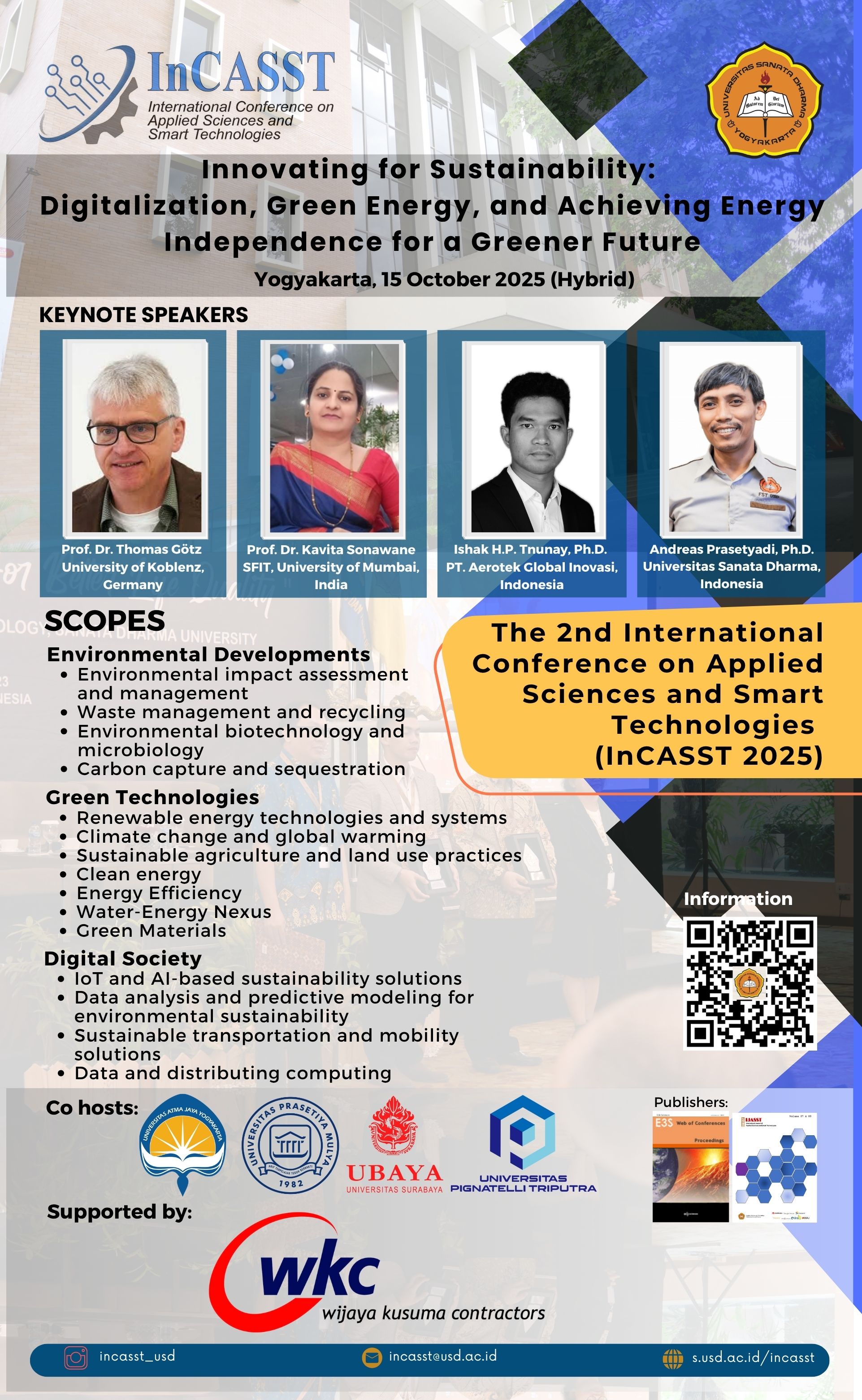
-
INCASST 2025
October 15, 2025 – October 15, 2025ABOUTIn the face of pressing global challenges such as climate change, energy security, and environmental sustainability, innovation plays a crucial role in shaping a greener future. Recognizing the urgent need for transformative solutions, this conference, "Innovating for Sustainability: Digitalization, Green Energy, and Achieving Energy Independence for a Greener Future," aims to provide a platform for knowledge exchange and collaboration among academics, industry leaders, policymakers, and researchers worldwide.
The conference will take place in Yogyakarta on October 15th, 2025 in hybrid mode, bringing together experts to discuss the latest advancements in digitalization, green energy technologies, and strategies for achieving energy independence. As the world transitions towards sustainable energy solutions, integrating digital technologies—such as artificial intelligence, IoT, and smart grids—has become a key enabler of efficiency, resilience, and innovation in the energy sector.
This event will feature insightful keynote speeches, panel discussions, and paper presentations on various topics related to digital transformation and sustainability. Participants are invited to share their research findings, innovative solutions, and best practices that contribute to a more sustainable and energy-independent future. All selected papers will be submitted for publication in either E3S Web of Conferences (Scopus Indexed) or International Journal of Applied Sciences and Smart Technologies (IJASST) indexed by Copernicus and Sinta 3 (the Indonesian Publication Index), ensuring that impactful ideas and research findings reach a broader audience.
Join us in exploring how digitalization and green energy can drive sustainability and energy independence. Through collaboration and knowledge-sharing, we can create meaningful change and build a cleaner, more resilient world for future generations.
THEMEINNOVATING FOR SUSTAINABILITY: DIGITALIZATION, GREEN ENERGY, AND ACHIEVING ENERGY INDEPENDENCE FOR A GREENER FUTURESCOPE- Environmental Developments
- Environmental impact assessment and management
- Waste management and recycling
- Environmental biotechnology and mircrobiology
- Carbon capture and sequestration
- Green Technologies
- Renewable energy technologies and systems
- Climate change and global warming
- Sustainable agriculture and land use practices
- Clean energy
- Energy Efficiency
- Water-Energy Nexus
- Green Materials
- Digital Society
- IoT and AI-based sustainability solutions
- Data analysis and predictive modeling for environmental sustainability
- Sustainable transportation and mobility solutions
KEYNOTE SPEAKER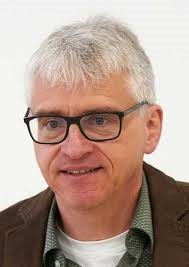
Prof. Dr. Thomas Götz (University of Koblenz, Germany)
Prof. Dr. Thomas Götz received his Ph.D. in Mathematics from TU Kaiserslautern, Germany in 2000. From 2001–2008, he was a visiting researcher (Post-Doc C1) at the same university. From 2003–2004, he was a visiting scientist at ICTP Trieste, Italy. He has already published more than 120 scientific papers in the fields of Mathematical Modelling, Numerical Methods, Epidemiology, and Differential Equations. He delivered hundreds keynotes and invited talks at symposia, seminars, and international conferences during his carriers. Since 2011 Professor Götz is a full professor in Mathematics of University of Koblenz, Germany. In 2016 He was appointed as Managing Director MTI Mittelrhein.
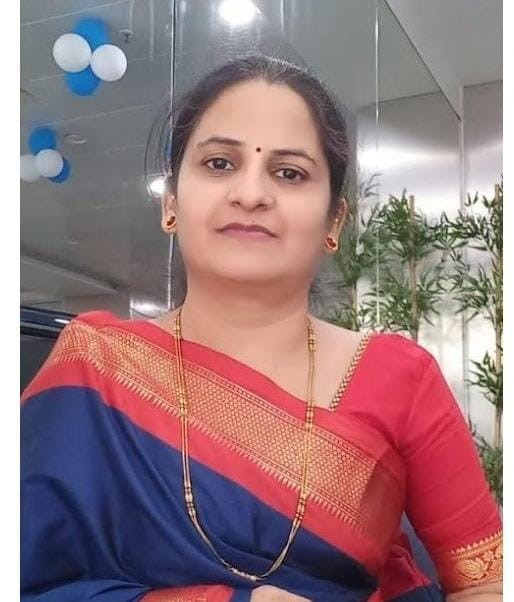
Prof. Dr. Kavita Sonawane (SFIT University of Mumbai , India)
Dr. Kavita Sonawane is a Professor and Head of Computer Engineering Department at St. Francis Institute of Technology, University of Mumbai, India. Dr. Kavita Sonawane received her Ph.D. in Computer Engineering from Mukesh Patel School of Technology Management & Engineering, NMIMS University, India, in 2015. She is a senior IEEE member with more than 65 published papers in the areas of image retrieval, medical image processing, machine learning, and data analytics. She has also positively contributed to the department and institute through continuous improvement in academic results, student activities (project competitions, Smart India Hackathons, industry-sponsored projects, etc.), faculty upgradation (FDPs, STTPs, and invited talks etc.), research grants (minor and major-University, AICTE and IEEE) and publications.
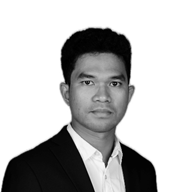
Assist. Prof. Ishak Hilton Pujantoro Tnunay, Ph.D. (Chief Technology Officcer -PT Aerotek Global Inovasi-)
Assist. Prof. Ishak Hilton Pujantoro Tnunay earned Doctor of Philosopy (Ph.D.) in Control Systems from Department of Electrical and Electronics Engineering, The University of Manchester, UK. During 2021, he became a postdoctoral researcher in the Control, Perception, Robots, Navigation and Intelligent Computing (COPERNIC) group at GIPGSA (Grenoble Images Parole Signal Automatique) Lab, France, a joint research unit of CNRS, Grenoble INP and University of Grenoble-Alpes. Presently, Dr. Tnuhay is Chief Technology Officer of Beehive Drones (PT. Aerotek Global Inovasi), and also lecturer in School of Electrical Engineering and Informatics, Institut Teknologi Bandung, Indonesia.
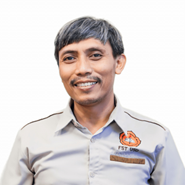
Assoc. Prof. Andreas Prasetyadi, Ph.D (Sanata Dharma University)
Assoc. Prof. Andreas Prasetyadi, Ph.D. is a full time lecturer at Department of Mechanical Engineering, Universitas Sanata Dharma, Indonesia. He received his Ph.D. in Mechanical and Process System Engineering from Department of Mechanical Engineering, Suranaree University of Technology, Thailand in 2019. In 2024 Dr. Prasetyadi was appointed as Deputy Head of Institute of Researches and Community Services at the same institution. His research interest covers Energy-Water Nexus, Water and Energy Conservation, and Drying Technology.
EDITOR BOARDSAssoc. Prof. Peerapong Uthansakul, Ph.D. (Guest Editor)
Dr. Uthansakul is an Associate Professor and the Dean of the Research Department, Suranaree University of Technology, Thailand. He received the Ph.D. degree in information technology and electrical engineering from The University of Queensland, Australia in 2007. He has more than 100 research publications and the author/coauthor of various books related to MIMO technologies. He is the editor of Suranaree Journal of Science and Technology and other leading Thailand journals related to science and technology. He was also the member of guest editor of International Journal of Renewable Energy Development – Special issue on Renewable Energy for Smart Electric Vehicle Charging Infrastructure.Assoc. Prof. Dr. Eng. Ir. I Made Wicaksana Ekaputra (Editor)
Dr. Ekaputra is an Associate Professor and the Head of Materials and Mechanical Design Laboratory in Department of Mechanical Engineering, Universitas Sanata Dharma, Indonesia. He received the doctoral degree (Dr.Eng.) in mechanical design engineering from Pukyong National University, South Korea, in 2016. Currently, he is the editor in chief of International Journal of Applied Sciences and Smart Technologies.
Assoc. Prof. Ir. Damar Widjaja, Ph.D. (Editor)
Dr. Widjaja is an Associate Professor in Department of Electronics Engineering, Universitas Sanata Dharma, Indonesia. He received his Ph.D. degree from Department of Telecommunication Engineering, Suranaree University of Technology, Thailand in 2016. He is the former editor of the 1st InCASST conference proceeding published by E3S Web of Conference.
SCIENTIFIC COMMITTEE- Prof. Hideki Kuwahara (Sophia University, Japan)
- Prof. Dr. Willy Susilo ((Wollongong University, Australia)
- Associate Prof. Dr. Shi Bai (Florida Atlantic University, U.S)
- Dr. Uday Pandit Khot (St. Francis Institute of Technology, University of Mumbai, India)
- Tri Hieu Le, Ph.D. (Ho Chi Minh University of Technology (HUTECH), Vietnam)
- Alex Baenaorama, Ph.D. (St. Paul University Dumaguete, Philipine)
- Dr. Farah Suraya Md Nasrudin (Universiti Teknologi MARA, Malaysia)
- Ignasia Handipta Mahardika, Ph.D. (Sogang University, South Korea)
- Parkpoom Phetpradap, Ph.D. (Chiang Mai University, Thailand)
- Prof. Dr. Eng. Ir. Deendarlianto, S.T., M.Eng. (Gadjah Mada University, Indonesia)
- Prof. Bambang Soelistijanto, Ph.D. (Sanata Dharma University - Indonesia)
- Prof Dr. rer. nat. Herry Pribawanto Suryawan (Sanata Dharma University - Indonesia)
- Prof. Ir. Sudi Mungkasi, Ph.D. (Sanata Dharma University - Indonesia)
- Prof Dr. Ir. Feri Yusivar, M.Eng (Universitas Indonesia, Indonesia)
- Dr. Irma Saraswati, M.Sc. (Universitas Sultan Ageng Tirtayasa, Indonesia)
- Dr. Imamul Muttakin (Universitas Sultan Ageng Tirtayasa, Indonesia)
- Dyonisius Dony Ariananda, S.T., M.Sc., Ph.D. (Gadjah Mada University, Indonesia)
- Dr. I Gusti Ngurah Bagus Catrawedarma, M.Eng. (Politeknik Negeri Banyuwangi, Indonesia)
COMMITTEESteering Committee
- Chairperson : Ir. Drs. Haris Sriwindono, M.Kom, Ph.D. (Sanata Dharma University - Indonesia)
- Member :
- Dr. Ir. I Gusti Ketut Puja (Sanata Dharma University - Indonesia)
- Prof. Dr. Frans Susilo, SJ, (Sanata Dharma University - Indonesia)
- Dr. Ir. Bernadeta Wuri Harini (Sanata Dharma University - Indonesia)
- Dr. Ir. Anastasia Rita Widiarti (Sanata Dharma University - Indonesia)
- Dr. Lusia Krismiyati Budiasih (Sanata Dharma University - Indonesia)
Organizing Committee
- Conference chair : Dr. Ir. Achilleus Hermawan Astyanto (Sanata Dharma University - Indonesia)
- Member
- Dr. Sri Hartati Wijono, M.Kom (Sanata Dharma University - Indonesia)
- Ir. Kartono Pinaryanto, S.T., M.Cs. (Sanata Dharma University - Indonesia)
- Regina Chelinia Erianda Putri, M.T. (Sanata Dharma University - Indonesia)
- Ir. Rosalia Arum Kumalasanti, M.T. (Sanata Dharma University - Indonesia)
- Michael Seen, M.T. (Sanata Dharma University - Indonesia)
- Ir. Robertus Adi Nugroho, M.Eng. (Sanata Dharma University - Indonesia)
- Eduardus Hardika Sandy Atmaja, Ph.D. (Sanata Dharma University - Indonesia)
- Gilang Arga Dyaksa, M. Eng. (Sanata Dharma University - Indonesia)
- Heryoga Winarbawa, M.Eng. (Sanata Dharma University - Indonesia)
IMPORTANT DATEAbstract Submission Deadline : July 4th, 2025Full paper submission onlyAcceptance Abstract Notification : July 7th, 2025Early Bird Payment Deadline : July 14th, 2025Full Paper Submission Deadline : August 15th, 2025- Extended Full Paper Submission Deadline : August 29th, 2025
- Acceptance Notification : September 12th, 2025
- Late Payment Deadline : September 15th, 2025
- Conference Day : October 15th, 2025
CONFERENCE VENUECampus III, Sanata Dharma University (Hybrid)
REGISTRATION FEEPresenter
Types of Presentation IDR USD Early Late Early Late Online*) 2.500.000/paper 2.750.000/paper 175/paper 195/paper Offline**) 2.650.000/paper 2.900.000/paper 185/paper 205/paper *) Includes a Proceedings and a certificate.
Non Presenter
Types of Audience IDR USD Offline**) 150.000/person ORGANIZED BY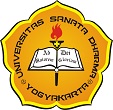
Co-Host
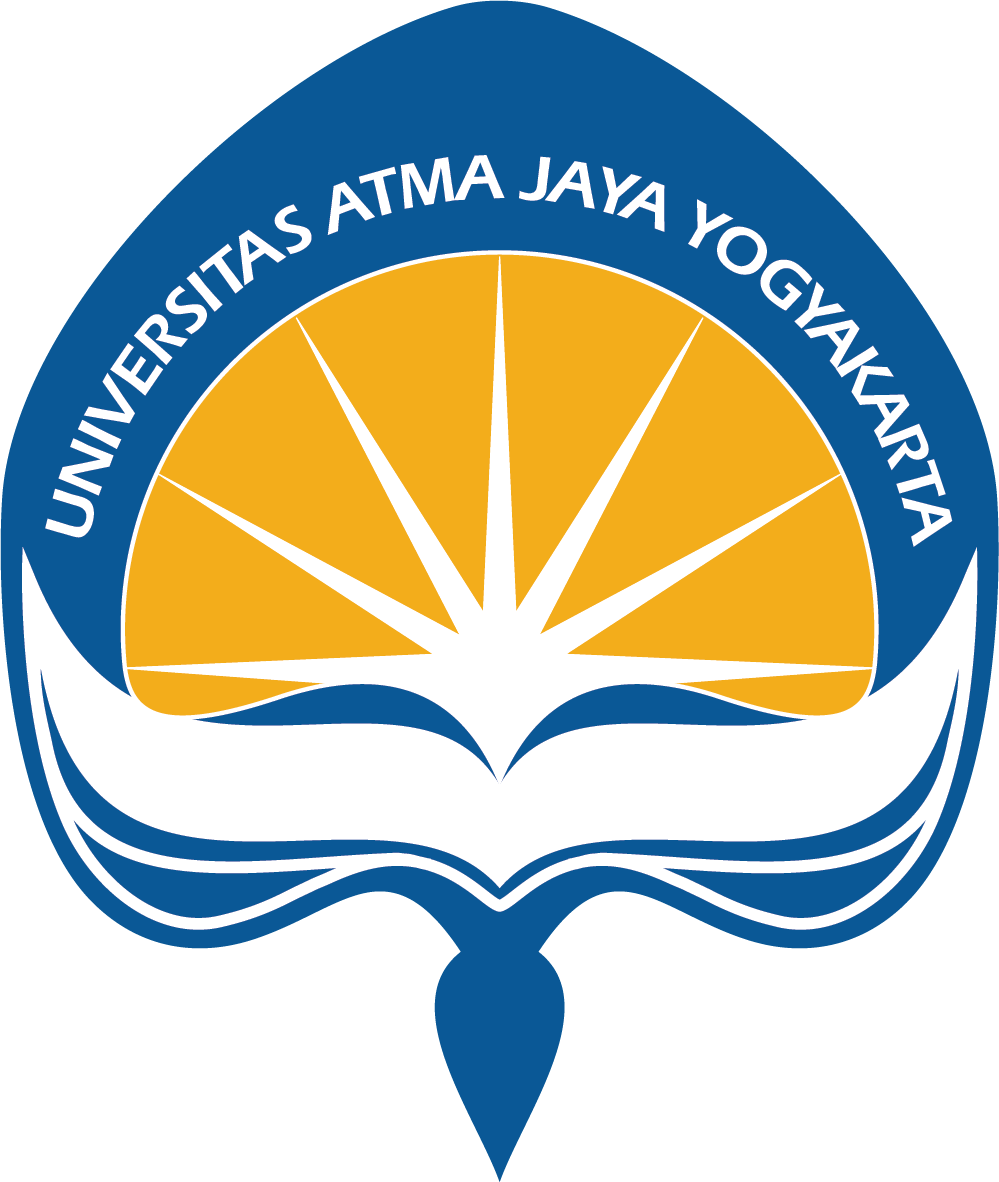
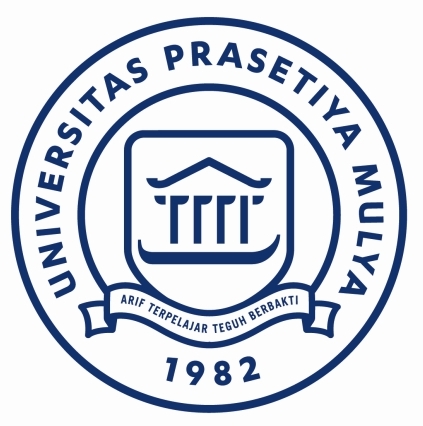
_(1).png)
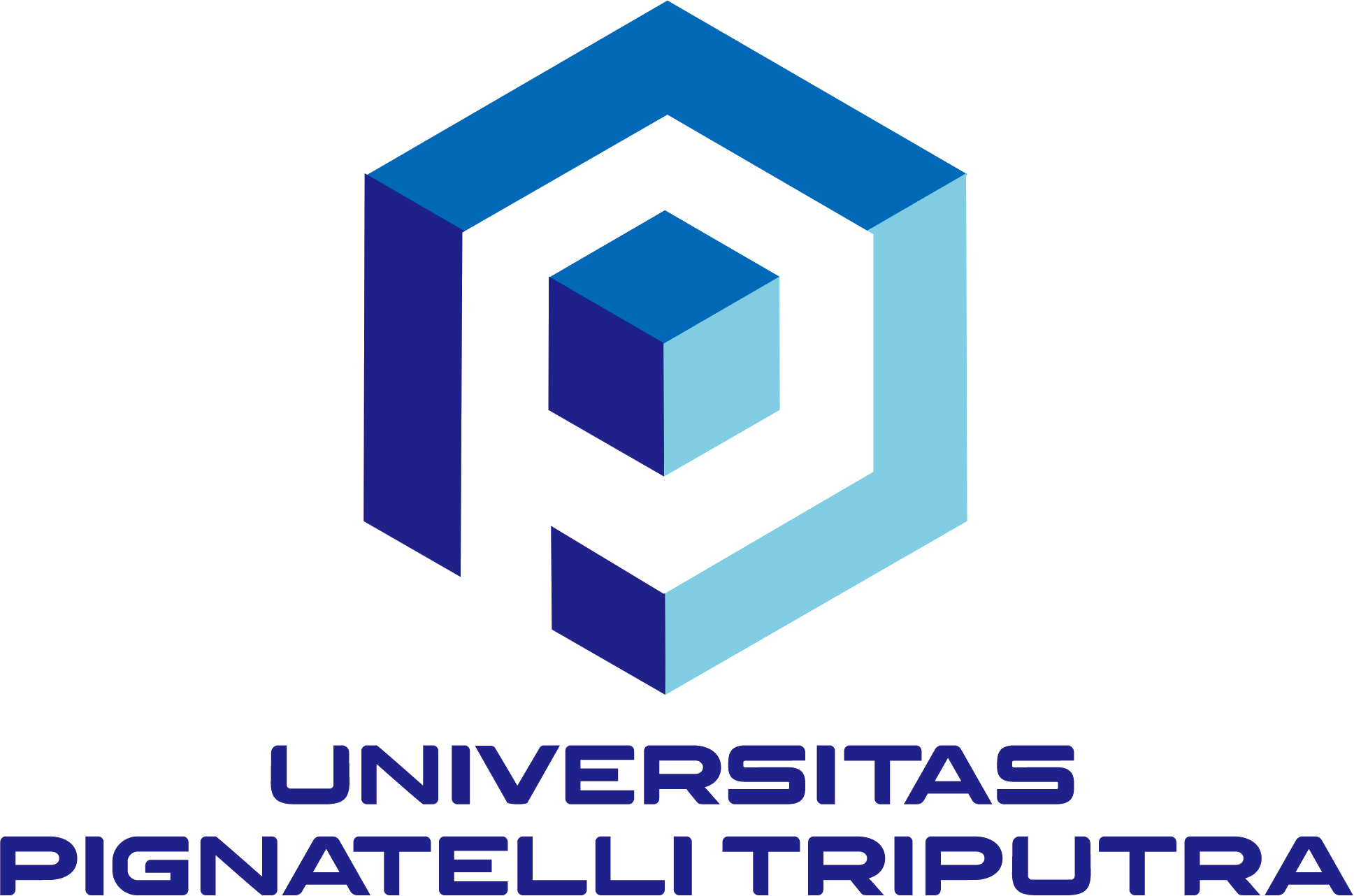 SUPPORTED BY
SUPPORTED BY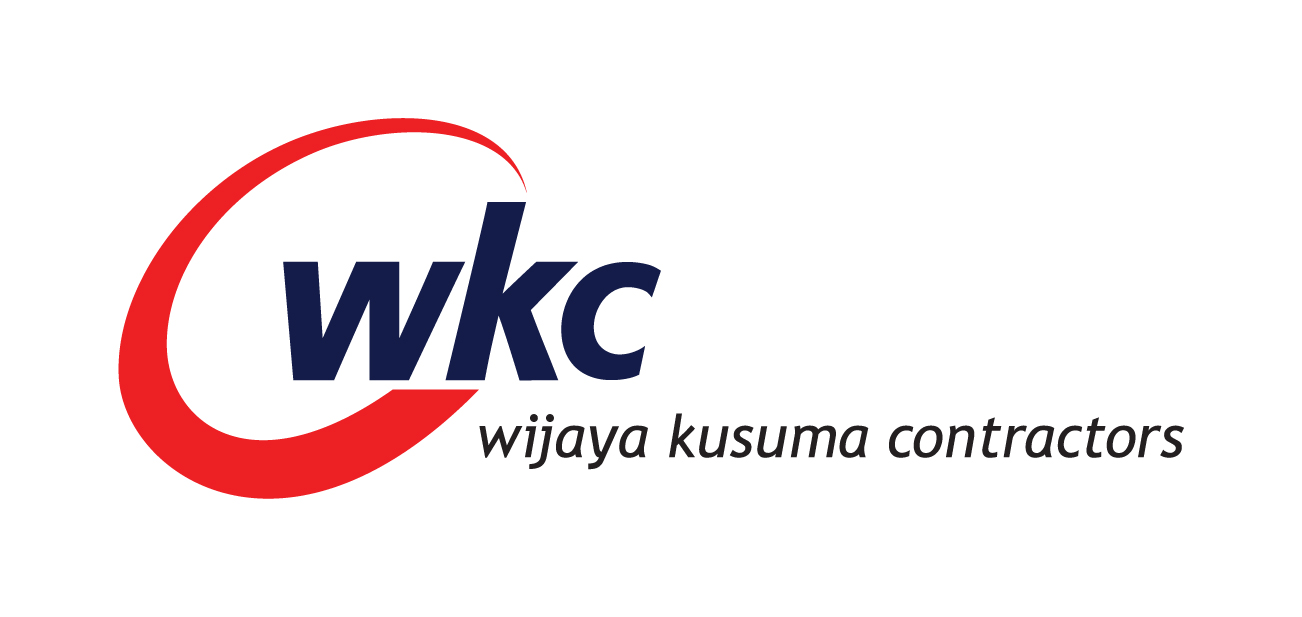 PUBLISHED BY
PUBLISHED BYScopus Indexed Conference Proceeding 
International Journal of Applied Sciences and Smart Technologies (IJASST) 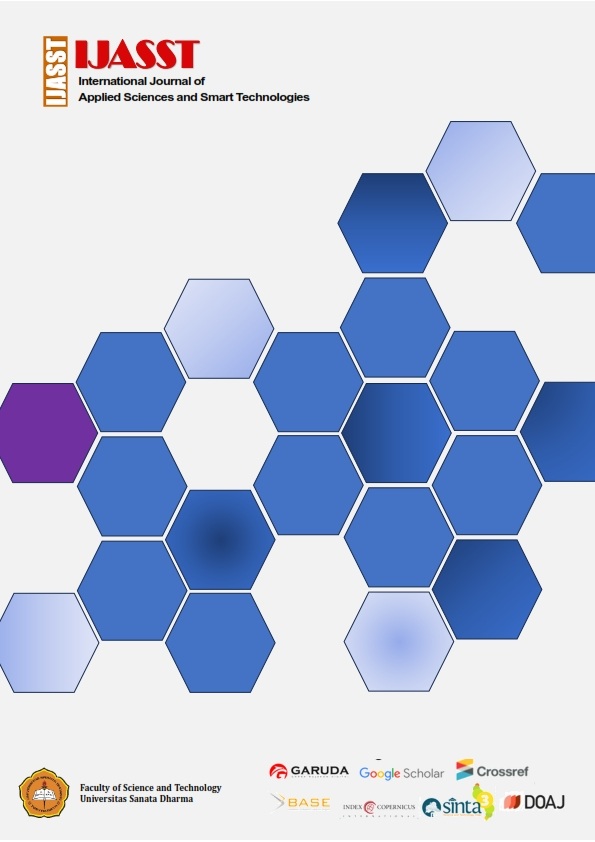
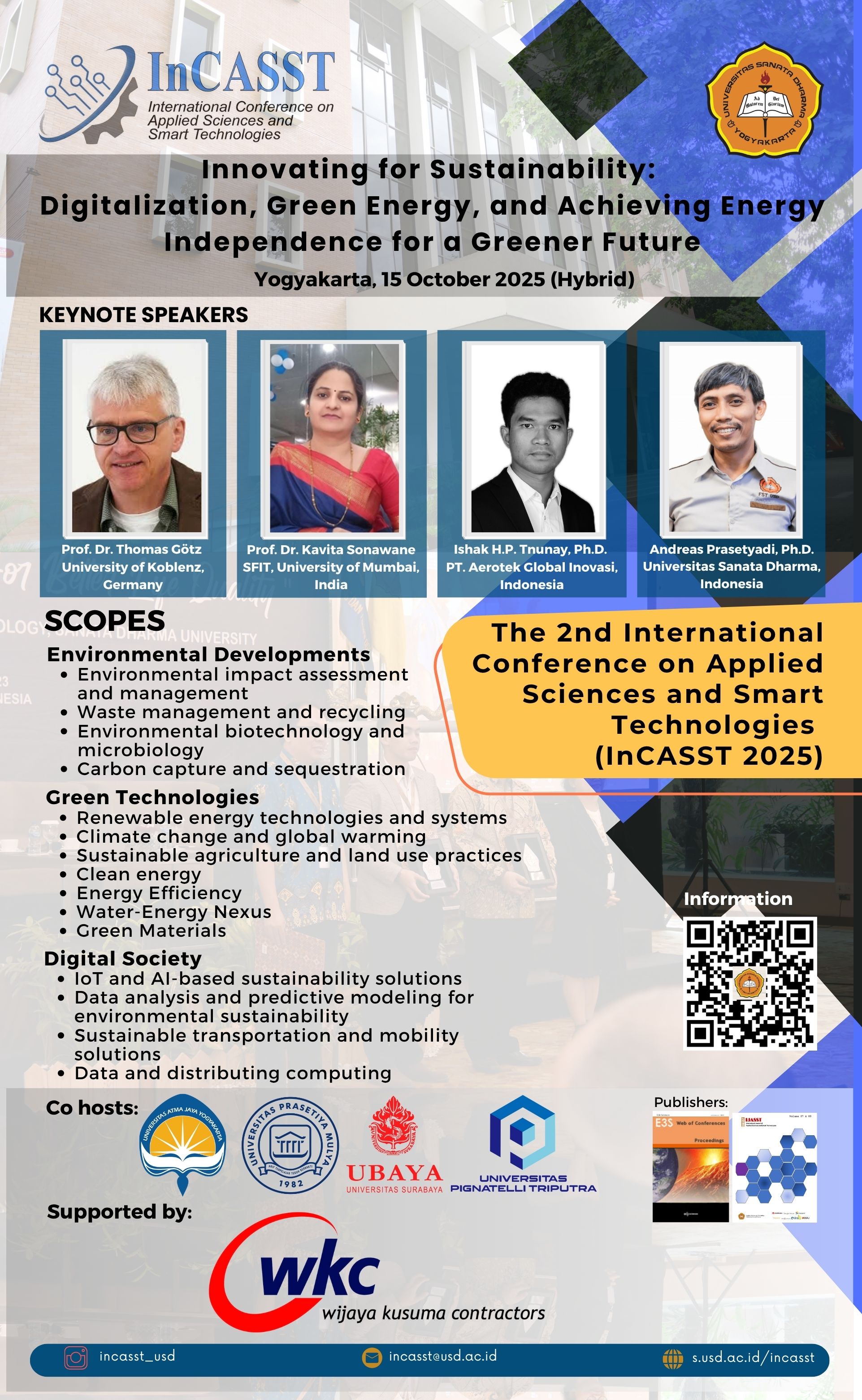
- Environmental Developments
-
InCASST 2023
October 18, 2023 – October 19, 2023About
In 2020, the world faced the COVID-19 pandemic which causes various problems. Now in 2023, the pandemic has subsided and many activities have returned to normal. Even so, there are still many problems left behind, including economic, social, educational, health, and so on. As an academic community engaged in science and technology, the Faculty of Science and Technology, Sanata Dharma University (FST SDU) is called to participate in overcoming various problems caused by this pandemic.
Therefore, FST USD intends to hold the international seminar InCASST 2023 (International Conference on Applied Sciences and Smart Technologies) in Yogyakarta, Indonesia, on October 18 2023 with the theme "Science and Technology Disruption in the Post Pandemic Era with Sustainable Development for Better Life Quality". The InCASST 2023 international seminar is also part of the 30th Anniversary of FST USD.
In this seminar, academics and practitioners around the world are invited to share ideas and best practices relevant to the theme of the seminar above in various appropriate fields of knowledge. Selected papers will be proposed to be submitted for publication to a reputable international proceeding. Through these publications, the dissemination of ideas can be expanded so that they become a contribution to solving various post-pandemic problems towards a better quality of life.
All selected paper will be published by E3S Web of Conferences (Scopus Indexed). Papers that are not selected will get back a publication fee.
Theme
Science and Technology Disruption in the Post Pandemic Era with Sustainable Development for Better Life Quality
Scope :
- Renewable energy technologies and systems
- Climate change and global warming
- Sustainable agriculture and land use practices
- Environmental impact assessment and management
- Energy policy and planning
- Clean energy and green technologies
- Waste management and recycling
- Air and water pollution control
- Environmental biotechnology and microbiology
- Carbon capture and sequestration
Keynote Speaker :

Prof. Ir. Sudi Mungkasi, Ph.D. (Sanata Dharma University-Indonesia)
Prof. Ir. Sudi Mungkasi is a full professor at the Department of Mathematics, Faculty of Science and Technology, Sanata Dharma University, Yogyakarta, Indonesia. He obtained the degree of Sarjana Sains (S.Si.) in Mathematics from Gadjah Mada University, Yogyakarta, Indonesia in 2004. He received the degrees of Master of Mathematical Sciences (M.Math.Sc.) and Doctor of Philosophy (Ph.D.) in Mathematical Sciences from The Australian National University, Canberra, Australia in 2008 and 2013, respectively. He was a postdoctoral fellow at the Mathematical Sciences Institute of The Australian National University in 2013. The professional degree of Insinyur (Ir.) in Engineering Sciences was obtained from Sanata Dharma University in 2021. His research interests include applied and computational mathematics as well as modeling and simulation for physical, biological, chemical, and engineering problems. Currently, he serves as Vice Rector for Academic Affairs of Sanata Dharma University
Prof. Tokuro Matsuo (Advanced Institute of Industrial Technology - Japan)
Prof. Tokuro Matsuo is currently a Full Professor (tenured) at the Advanced Institute of Industrial Technology (AIIT) in Public University Corporation Tokyo Metropolitan University since 2012. Also, he is currently a Director of the Research Center for Artificial Intelligence and Service Science at AIIT and CEO of the International Institute of Applied Informatics (IIAI). His current research interests include agent-based electronic commerce, qualitative reasoning and simulation, material informatics, IT and business management, and IoT. He delivered 150 keynotes and invited talks at international conferences, symposia, and seminars in this decade. He also received over 10 awards on research and over 30 research grants from the government, research foundations, and companies.

Assoc. Prof. Dr. Peerapong Uthansakul (Suranaree University of Technology - Thailand)
Peerapong Uthansakul has been working as the Associate Professor at the School of Telecommunication Engineering and the Director of the Institute of Research and Development, Suranaree University of Technology, Thailand. He has got more than one hundred research publications and is the author/co-author of various books related to MIMO technologies. Furthermore, he is the editor of “Suranaree Journal of Science and Technology” and other leading Thai journals related to Science and Technology. He has won various national awards from the government of Thailand due to his contributions and motivation in the field of Science and Technology. His research interests include green communications, wave propagation modeling, MIMO, Massive MIMO, Brain Wave Engineering, OFDM and advanced wireless communications, wireless sensor network, embedded systems, the internet of things, and network security. His current research interest is in Artificial Intelligence and Bio-Signal studies.

Assist. Prof. Dr. Eng. Rando Tungga Dewa (The Republic of Indonesia Defense University-Indonesia)
Dr. Eng. Rando Tungga Dewa focuses on the fracture mechanics field in advanced technology. He is an Assistant Professor in the Mechanical Engineering Department, RIDU (The Republic of Indonesia Defense University). He has done some research topics including Nuclear Reactor Gen-IV design, vibration fatigue on structures, and advanced additive manufacturing technologies on energetic materials. He, at least published more than 20 peer-reviewed articles and attended 50 symposiums with H-index 8Advisory board
- Prof. Dr. Willy Susilo (Wollongong University, Australia)
- Apichate Maneewong, Ph.D. (Institute of Nuclear Technology, Thailand)
- Pham Nhu Viet Ha (Vietnam Atomic Energy Institute, Vietnam)
- Dr. rer. nat. Wolfgang Bock (Department of Mathematics, Rheinland-Pfalz Technical University, Germany)
- Dr. Bambang Dwi Wijanarko, S. Si, M.Kom. (Universitas Bina Nusantara, Semarang, Indonesia)
- Dr. Ir. Feri Yusivar, M.Eng (Universitas Indonesia, Indonesia)
- Dr. Irma Saraswati, M.Sc. (Universitas Sultan Ageng Tirtayasa, Indonesia)
- Dr. Imamul Muttakin (Universitas Sultan Ageng Tirtayasa, Indonesia)
- Dyonisius Dony Ariananda, S.T., M.Sc., Ph.D. (Universitas Gadjah Mada, Indonesia)
- Dr. Ir. Ford Lumban Gaol, S.Si., M.Kom. (Universitas Bina Nusantara, Indonesia)
Steering Committee
- Conference Chairperson : Ir. Drs. Haris Sriwindono, M.Kom, Ph.D. (Sanata Dharma University - Indonesia)
- Conference Co-chair : Ir. Damar Widjaja, Ph.D (Sanata Dharma University - Indonesia)
- Member
- Dr. Ir. I Gusti Ketut Puja (Sanata Dharma University - Indonesia)
- Prof. Frans Susilo, SJ, (Sanata Dharma University - Indonesia)
- Prof. Ir. Sudi Mungkasi, Ph.D (Sanata Dharma University - Indonesia)
Organizing Committee
- Conference chair : Dr. Ir. Bernadeta Wuri Harini (Sanata Dharma University - Indonesia)
- Conference co-chair : Dr. Eng. I Made Wicaksana Ekaputra (Sanata Dharma University - Indonesia)
- Member
- Dr. Sri Hartati Wijono, M.Kom (Sanata Dharma University - Indonesia)
- Ir. Theresia Prima Ari Setiyani, M.T. (Sanata Dharma University - Indonesia)
- Ir. Augustinus Bayu Primawan, D.Tech.Sc. (Sanata Dharma University - Indonesia)
Important Dates :
- Extended New Submission : September 18, 2023 (Full Paper only)
- Acceptance Notification : September, 20 2023
- Early Bird Payment : April 30, 2023
- Late Payment : September 25, 2023
- Full Paper Submission of Accepted Abstract : September 18, 2023
- Conference Day : October 18, 2023
Registration Fee

Payment Procedure
After the acceptance notice of your abstract, you can directly make a payment by transfer via PayPal or bank account transfer.
1. Paypal : suryagovinda@yahoo.com
2. Bank Transfer
- Account No : 0373733749
- Account Name : I Gusti Ketut Puja
- Bank Name : Bank Central Asia (BCA) Yogyakarta Branch
Overseas Transfer :
- Bank Central Asia Indonesia
- Jakarta 10310, Indonesia
- BCA swift code : CENAIDJA
After completing the payment, please kindly submit your payment receipt to this form. Payment receipt will be sent by e-mail.
Organized by

Co-Host



Published by
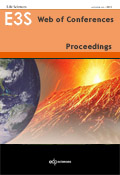
The manuscript preparation as follows here. This is the two column paper template.
Conference Venue

ROOM RATE EASTPARC HOTEL
Deluxe Room ( Twin Bed Only ) Rp. 1.000.000 nett/R/N - with 2 Pax breakfast
Premier Room ( Twin or King Bed )Rp. 1.384.000 nett/R/N - 2 Pax Breakfast
Junior Suite ( King Bed Only )Rp. 2.000.000 nett/R/N - 2 Pax Breakfast
Executive Suite ( King Bed Only )Rp. 3.000.000 nett/R/N - 2 Pax Breakfast
Presiden Suite ( King Bed Only )Rp. 4.000.000 nett/R/N - 2 Pax BreakfastInclusions : Room with private balconyBuffet BreakfastBakpia Jogja Istimewa upon check inWifiAccess to fitness center & swimming pool
Seminar Nasional Sanata Dharma Berbagi
Tema :
70 Tahun Sanata Dharma Menggali Makna dan Membangun Harapan: Paradigma Keberlanjutan dan Tantangan Perubahan Iklim
Latar Belakang :
James Robertson pada tahun 1978 menerbitkan buku yang menjadi semakin relevan pada masa sekarang, yaitu “The Sane Alternative”. Buku ini mengkritik kebijakan ekonomi ekspansionis yang mengeksloitasi sumber daya dan meninggalkan kerusakan mendalam pada bumi dan sistem sosial. Paradigma ekspansionis yang menjadi arus utama dalam seluruh sistem masyarakat membawa bumi pada kondisi tidak mampu lagi melakukan self-recovery dan menghasilkan ancaman nyata yang sekarang dikenal sebagai perubahan iklim. Paradigma ini juga menghasilkan kekerasan sosial yang berdampak pada kehilangan kohesifitas dan meningkatkan kerentanan di masyarakat. Struktur sosial, ekonomi, maupun teknologi yang dikembangkan tidak mampu menjawab kebutuhan untuk merespon volatilitas yang muncul karena paradigma yang tidak sesuai.
Adil, manusiawi, dan berkelanjutan merupakan ukuran utama dalam paradigma alternatif yang ditawarkan oleh Robertson. Hal ini muncul dalam indikator kemerataan akses, efektivitas pendekatan, toleransi dan inklusivitas, lokalitas dan kontekstualitas, kesejahteraan dasar, kesehatan mental dan sosial, resiliensi, dampak ekologis, dan berfokus pada kualitas. Paradigma ini bergayut dengan prinsip ekologi integral yang dipromosikan oleh Paus Fransiskus dalam Laudato Si sebagai undangan universal untuk merespon perubahan iklim.
Perubahan iklim merupakan fenomena alam yang terkait dengan keseimbangan energi dan materi di sistem biosfer. Pola iklim telah berlangsung dalam waktu yang lama dengan aliran energi yang berasal dari matahari sebagai sumber energi utama sistem tata surya merupakan faktor dominannya. Pemanfaatan energi fosil pada tingkat yang ekstensif dan perubahan lahan untuk pemenuhan kebutuhan manusia menjadi penyebab utama penumpukan gas- gas rumah kaca di stratosfer yang berdampak pada meningkatnya temperatur bumi dan disebut sebagai pemanasan global. Pola iklim berubah karena keseimbangan aliran energi dan materi bergeser karena pemanasan global. Sanata Dharma sebagai Universitas Jesuit mengemban misi untuk mewujudkan harapan melalui UAP.
Sanata Dharma berbagi ini hendak mencoba merefleksikan perubahan iklim dan paradigma berkelanjutan yang relevan bagi masyarakat dan implementasinya, terutama kaum muda dan mereka yang berada dalam kondisi rentan. Tantangan ekonomi, Pendidikan, Sosial dan Teknologi, maupun Kesehatan direfleksikan untuk memberikan perspektif yang lebih jernih tentang keberlanjutan dan aplikasinya. Refleksi ini diwujudkan dalam kegiatan seminar utama dengan topik perubahan iklim dan simposia pendukung dengan tema – tema yang terkait upaya berkelanjutan sesuai dengan bidang bahasan.
Kegiatan – kegiatan Sanata Dharma Berbagi diselenggarakan dalam bentuk Pesta Akademik yang dilakukan oleh group riset, lembaga, prodi di USD dalam satu tema besar. Pesta Akademik ini dinyatakan dalam rangkaian Seminar, Simposium, dan Workshop.
Tujuan Kegiatan :
- Menghadirkan sebuah ruang refleksi bagi upaya – upaya keberlanjutan
- Mendorong civitas dan masyarakat untuk berkolaborasi menciptakan upaya berkelanjutan
- Perayaan Akademik dalam rangka 70 tahun Sanata Dharma
Ruang Lingkup dan Simposium :
- Environmental, Social, and Governance (ESG)
- Mitigasi Perubahan Iklim
- Peningkatan Kesadaran dan Pendidikan Berkelanjutan
- Bidang Sastra dan Sosial Humaniora
- Sustainable Development Goals (SDGs)
- Pustakawan Cerdas di Era Artificial Intelligence (AI)
Tanggal Penting :
- Pengumpulan Abstrak: 31 Juli 2025
- Pengumuman Penerimaan Abstrak: 11 Agustus 2025
- Pengumpulan Artikel Lengkap: 10 September 2025
- Pengumuman Artikel Lengkap diterima: 30 September 2025
- Pengumpulan PPT Presentasi: 6 Oktober 2025
- Hari Seminar: 10 Oktober 2025
- Pengumuman Revisi Artikel untuk Publikasi: 17 Oktober 2025
-
Seminar Nasional Sanata Dharma Berbagi 2025
October 10, 2025 – October 10, 2025Tema :
70 Tahun Sanata Dharma Menggali Makna dan Membangun Harapan: Paradigma Keberlanjutan dan Tantangan Perubahan Iklim
Latar Belakang :
James Robertson pada tahun 1978 menerbitkan buku yang menjadi semakin relevan pada masa sekarang, yaitu “The Sane Alternative”. Buku ini mengkritik kebijakan ekonomi ekspansionis yang mengeksloitasi sumber daya dan meninggalkan kerusakan mendalam pada bumi dan sistem sosial. Paradigma ekspansionis yang menjadi arus utama dalam seluruh sistem masyarakat membawa bumi pada kondisi tidak mampu lagi melakukan self-recovery dan menghasilkan ancaman nyata yang sekarang dikenal sebagai perubahan iklim. Paradigma ini juga menghasilkan kekerasan sosial yang berdampak pada kehilangan kohesifitas dan meningkatkan kerentanan di masyarakat. Struktur sosial, ekonomi, maupun teknologi yang dikembangkan tidak mampu menjawab kebutuhan untuk merespon volatilitas yang muncul karena paradigma yang tidak sesuai.
Adil, manusiawi, dan berkelanjutan merupakan ukuran utama dalam paradigma alternatif yang ditawarkan oleh Robertson. Hal ini muncul dalam indikator kemerataan akses, efektivitas pendekatan, toleransi dan inklusivitas, lokalitas dan kontekstualitas, kesejahteraan dasar, kesehatan mental dan sosial, resiliensi, dampak ekologis, dan berfokus pada kualitas. Paradigma ini bergayut dengan prinsip ekologi integral yang dipromosikan oleh Paus Fransiskus dalam Laudato Si sebagai undangan universal untuk merespon perubahan iklim.
Perubahan iklim merupakan fenomena alam yang terkait dengan keseimbangan energi dan materi di sistem biosfer. Pola iklim telah berlangsung dalam waktu yang lama dengan aliran energi yang berasal dari matahari sebagai sumber energi utama sistem tata surya merupakan faktor dominannya. Pemanfaatan energi fosil pada tingkat yang ekstensif dan perubahan lahan untuk pemenuhan kebutuhan manusia menjadi penyebab utama penumpukan gas- gas rumah kaca di stratosfer yang berdampak pada meningkatnya temperatur bumi dan disebut sebagai pemanasan global. Pola iklim berubah karena keseimbangan aliran energi dan materi bergeser karena pemanasan global. Sanata Dharma sebagai Universitas Jesuit mengemban misi untuk mewujudkan harapan melalui UAP.
Sanata Dharma berbagi ini hendak mencoba merefleksikan perubahan iklim dan paradigma berkelanjutan yang relevan bagi masyarakat dan implementasinya, terutama kaum muda dan mereka yang berada dalam kondisi rentan. Tantangan ekonomi, Pendidikan, Sosial dan Teknologi, maupun Kesehatan direfleksikan untuk memberikan perspektif yang lebih jernih tentang keberlanjutan dan aplikasinya. Refleksi ini diwujudkan dalam kegiatan seminar utama dengan topik perubahan iklim dan simposia pendukung dengan tema – tema yang terkait upaya berkelanjutan sesuai dengan bidang bahasan.
Kegiatan – kegiatan Sanata Dharma Berbagi diselenggarakan dalam bentuk Pesta Akademik yang dilakukan oleh group riset, lembaga, prodi di USD dalam satu tema besar. Pesta Akademik ini dinyatakan dalam rangkaian Seminar, Simposium, dan Workshop.Tujuan Kegiatan :
- Menghadirkan sebuah ruang refleksi bagi upaya – upaya keberlanjutan
- Mendorong civitas dan masyarakat untuk berkolaborasi menciptakan upaya berkelanjutan
- Perayaan Akademik dalam rangka 70 tahun Sanata Dharma
Ruang Lingkup dan Simposium :
- Environmental, Social, and Governance (ESG)
- Mitigasi Perubahan Iklim
- Peningkatan Kesadaran dan Pendidikan Berkelanjutan
- Bidang Sastra dan Sosial Humaniora
- Sustainable Development Goals (SDGs)
- Pustakawan Cerdas di Era Artificial Intelligence (AI)
Tanggal Penting :
- Pengumpulan Abstrak: 31 Juli 2025
- Pengumuman Penerimaan Abstrak: 11 Agustus 2025
- Pengumpulan Artikel Lengkap: 10 September 2025
- Pengumuman Artikel Lengkap diterima: 30 September 2025
- Pengumpulan PPT Presentasi: 6 Oktober 2025
- Hari Seminar: 10 Oktober 2025
- Pengumuman Revisi Artikel untuk Publikasi: 17 Oktober 2025
Pembicara Utama :

Rev. Christoforus Bayu Risanto, S.J. - Observatorium Vatikan
Christoforus Bayu Risanto lahir pada bulan Januari 1981 di Bogor, Indonesia. Ia tumbuh dan bersekolah di kota tersebut hingga tahun 1996 ketika ia masuk seminari menengah St. Petrus Kanisius di Magelang, Indonesia. Setelah lulus dari seminari menengah tersebut, ia bergabung dengan Serikat Yesus pada tahun 2000 dan memulai studi filsafatnya pada tahun 2003. Tesisnya dalam bidang filsafat adalah pemahaman waktu dalam matematika-fisika Newtonian dan Einsteinian serta dampaknya terhadap epistemologi.
Bayu mengajar fisika senior, geometri mahasiswa tahun kedua, dan sains umum mahasiswa tahun pertama selama dua tahun (2007 – 2009) di Sekolah Menengah Atas Xavier, Negara Federasi Mikronesia sebelum menyelesaikan gelar masternya dalam teologi pada tahun 2012.
Segera setelah ditahbiskan sebagai presbiteral pada tahun 2012, ia ditugaskan untuk melanjutkan studi meteorologi dan klimatologi di Amerika Serikat. Ia menyelesaikan gelar Ph.D.-nya dengan dua dana proyek yang berbeda (yaitu, proyek asimilasi data Meksiko yang didukung oleh UNAM, dan proyek prakiraan submusiman Arab Saudi yang didukung oleh KAUST). Setelah lulus, ia terus bekerja di Universitas Arizona sebagai rekanan peneliti pascadoktoral hingga Juli 2024 ketika ia bergabung dengan Observatorium Vatikan.
Minat Penelitian:
Bayu tertarik pada prediksi cuaca numerik (NWP) di lingkungan semi-kering hingga gersang dan medan yang kompleks. Ia berfokus pada pencarian solusi untuk meningkatkan prakiraan curah hujan melalui pendekatan asimilasi data dan pemodelan ansambel.
Penghargaan:- Beasiswa Krider Endowment dalam Ilmu Atmosfer/Fisika 2020 diterima pada tahun akademik 2020/2021 dari Universitas Arizona.
- Hibah Perjalanan 2019, diterima pada Semester Musim Gugur 2019 dari Dewan Mahasiswa Pascasarjana dan Profesional (GPSC), Universitas Arizona.
- Penghargaan Beasiswa 2018, diterima pada Semester Musim Gugur 2018 dari Departemen Hidrologi dan Atmosfer, Universitas Arizona.
- Penghargaan Beasiswa Galileo Circle 2018 diterima pada bulan Mei 2018 dari Universitas Arizona.

Dr. Aquilina Tanti Arini - Dosen Universitas Sanata Dharma
Dr. Aquilina Tanti Arini adalah dosen pada Fakultas Psikologi, Universitas Sanata Dharma (USD) Yogyakarta, aktif mengajar dan melakukan penelitian di bidang psikologi dengan pendekatan kultural/indigenous dan komunikasi risiko. Ia menempuh pendidikan tinggi (S1– S3) di Universitas Gadjah Mada (UGM) dan meraih gelar doktor dengan fokus penelitian yang meliputi persepsi risiko, komunikasi risiko, dan topik terkait perubahan iklim serta isu-isu psikologi budaya. Beberapa karya ilmiahnya antara lain studi tentang persepsi perubahan iklim di Yogyakarta dan penelitian lain yang dipublikasikan pada jurnal-jurnal nasional; daftar publikasi dan dokumen akademisnya tercatat pada repositori SINTA/halaman institusi USD. Dr. Aquilina juga aktif sebagai pembicara pada seminar dan kegiatan akademik di USD dan institusi lain, serta terlibat dalam kegiatan pengabdian masyarakat dan seminar tentang bias budaya, kesehatan mental, dan komunikasi risiko.
-
Seminar Nasional Sanata Dharma Berbagi 2024
September 20, 2024 – September 20, 2024Tema
“Pendidikan Masa Depan”
Latar Belakang
“Sains adalah Seperangkat Bahasa atau Peta Untuk Memahami Secara Kritis Realitas Yang Kompleks”
(M. Sastrapratedja)
Manusia dipahami oleh Rama Sastrapratedja sebagai makhluk historis yang bersifat kontekstual. Namun, manusia tidak semata – mata merupakan kumpulan perilaku aktual yang bersifat datum. Manusia juga memiliki potensi – potensi bawaan. Manusia terwujud melalui transformasi atas semua potensi kemanusiaannya melalui interaksi dengan kosmosnya. Pada saat yang sama, proses transformasi itu dipengaruhi oleh kosmos yang manusia ikut kembangkan juga, sehingga Pendidikan merupakan hal yang penting bagi seorang manusia.
Pendidikan dalam perspektif Rama Sastrapratedja merupakan proses pemanusiaan yang terus menerus. Proses ini mencakup semua dimensi kemanusiaan seseorang pada tataran individu dan sosial. Pendidikan juga mensyaratkan terbangunnya visi kehidupan seseorang. Melalui visi ini tergambar watak, karakter dan wawasan pada konteks keberadaannya. Hal ini menunjukkan bahwa Pendidikan merupakan upaya yang sangat dinamis dan memiliki aspek profetik.
Salah satu gagasan yang dibagikan oleh Rama Sastrapratedja sebagai pendidik adalah kompleksitas yang perlu disadari dan diperlakukan sebagai realitas, di antaranya adalah isu-isu besar yang kontekstual, seperti: Artificial Intelligence (AI) dan berbagai peluang akses berbagai teknologi yang ada saat ini. Kompleksitas ini membawa implikasi pada aneka hal. Konsep universitas tidak lagi relevan karena menempatkan civitas academica sebagai pembangun pengetahuan. Multiversitas yang melibatkan lebih banyak unsur perlu terlibat dalam membangun pengetahuan yang merupakan demokratisasi pengetahuan. Pendekatan non tradisional dengan melibatkan aneka elemen dalam pengetahuan, seni dan budaya menjadi relevan dalam mengembangkan perguruan tinggi yang semakin berdampak. Dalam praksis Pendidikan, multidimensionalisme perlu dihargai untuk mewujudkan Pendidikan yang mampu mentransformasi intelektual, moral, dan religiusitas.
Kompleksitas realitas merupakan ruang yang terbuka bagi kerjasama aneka ilmu, pendekatan, seni dan budaya. Kolaborasi yang didorong oleh kesediaan untuk saling menghargai dan berbagi menjadi aspek penting untuk mencari solusi dalam menjawab aneka tantangan yang mendesak pada masa kini. Perubahan iklim, keadilan, kecerdasan buatan merupakan sebagian tantangan tersebut. Kegagalan menanggapi hal – hal tersebut dapat membawa kepada musnahnya kehidupan manusia di bumi ini.
Refleksi kritis multiversitas hendak ditawarkan untuk dikaji dalam seminar untuk mengenang Rm. M. Sastrapratedja, SJ. Interdisiplinaritas dan demokratisasi pengetahuan yang melampaui bidang – bidang konvensional dapat menjadi kajian baru yang memberi tawaran segar bagi solusi tantangan kemanusiaan masa kini.
Pembicara Utama

Pater Dr. Otto Gusti Ndegong Madung, SVD - Rektor IFTK Ledalero
Pater Dr. Otto Gusti Ndegong Madung, SVD, lahir di Lengko Elar, Kecamatan Elar, Kabupaten Manggarai Timur pada 20 Mei 1970. Beliau memulai studi filsafat di STFK Ledalero pada tahun 1991. Pada tahun 1994, ia melanjutkan studi teologi di Philosophisch-Theologische Hochschule St. Gabriel, Mödling bei Wien, Austria, dan meraih gelar "Magister der Theologie" pada tahun 1999. Pada bulan Juli di tahun yang sama, Pater Otto ditahbiskan menjadi imam.
Sebelum tahbisan, Pater Otto menjalani praktik diakonat dan bekerja sebagai imam pembantu di sebuah paroki di Kota Wina, Austria, dari Juli 1998 hingga September 2000. Setelah itu, dari Oktober 2000 hingga akhir September 2001, beliau bekerja di Institut Sosial Jakarta, sebuah LSM milik Serikat Jesuit yang bergerak di bidang advokasi masyarakat miskin di Jakarta.
Pada akhir tahun 2001 hingga Februari 2008, Pater Otto melanjutkan studi filsafat di Hochschule für Philosophie, München, Jerman. Pada 8 Februari 2008, beliau berhasil mempertahankan tesis doktoralnya yang berjudul "Politik und Gewalt. Giorgio Agamben und Jürgen Habermas im Vergleich" - "Politik dan Kekerasan. Sebuah Studi Perbandingan tentang Giorgio Agamben dan Jürgen Habermas".
Dr. Otto Gusti Ndegong Madung diangkat dan dilantik sebagai Ketua STFK Ledalero untuk periode 2018-2022. Pada 20 Agustus 2022, ia diangkat dan dilantik menjadi Rektor pertama Institut Filsafat dan Teknologi Kreatif Ledalero untuk periode 2022-2026. Selain itu, Pater Otto juga aktif menulis di media massa lokal dan nasional, serta menulis artikel untuk sejumlah jurnal ilmiah. Beliau bekerja sebagai dosen dan aktif dalam kegiatan advokasi serta pendidikan masyarakat luas dalam isu-isu gender, hak asasi manusia (HAM), dan kekerasan terhadap perempuan melalui Divisi Perempuan, Truk-F Maumere, dan JPIC SVD Ende.
Beliau telah menulis beberapa buku, antara lain:
- Politik: Antara Legalitas dan Moralitas (Maumere: Penerbit Ledalero, 2009)
- Politik Diferensiasi versus Politik Martabat Manusia (Maumere: Penerbit Ledalero, 2011)
- Post-Sekularisme, Toleransi dan Demokrasi (Maumere: Penerbit Ledalero, 2017)
Selain itu, Pater Otto juga aktif menulis di media massa lokal dan nasional, serta menulis artikel untuk sejumlah jurnal ilmiah. Beliau bekerja sebagai dosen dan aktif dalam kegiatan advokasi serta pendidikan masyarakat luas dalam isu-isu gender, hak asasi manusia (HAM), dan kekerasan terhadap perempuan melalui Divisi Perempuan, Truk-F Maumere, dan JPIC SVD Ende.

Prof. Concilianus Laos Mbato, M.A., Ed.D. - Guru Besar Pendidikan Bahasa Inggris, Universitas Sanata Dharma
Conciliaus Laos Mbato lahir di Kampung Terong, Riung, Ngada, Flores, NTT pada tanggal 9 Juli 1967. Beliau menerima pendidikan menengah atas di SMA Seminari St. Yohanes Berchmans, Mataloko, dan menyelesaikannya di SMA Syuradikhara, Ende, Flores, pada tahun 1988. Ia menyelesaikan gelar Sarjana Pendidikan Bahasa Inggris dari IKIP Makassar pada tahun 1992. Ia kemudian menjadi guru di SMA Katolik Rajawali, Makassar hingga tahun 1996 dan menerima beasiswa Ausaid untuk melanjutkan studi Magister dalam bidang Linguistik Terapan di Griffith University, Australia, dari tahun 1997-1998.
Sejak tahun 1998 hingga saat ini, beliau menjadi dosen Pendidikan Bahasa Inggris di Program Studi PBI, Universitas Sanata Dharma. Dari tahun 2009-2013, ia menerima beasiswa DIKTI untuk studi Doctor of Education di Southern Cross University, Lismore, Australia. Beliau aktif dalam berbagai skema penelitian dan publikasi, terutama di bidang strategi pembelajaran seperti metakognisi dan regulasi diri, serta pengembangan profesional guru. Ia juga terlibat dalam berbagai kegiatan pemberdayaan guru, termasuk Program Pendidikan Profesi Guru (PPG). Karya-karya yang telah diterbitkan dapat diakses melalui platform publikasi ilmiah Google Scholar.

Yanuar Nugroho, Ph.D. - STF Driyarkara
Yanuar Nugroho adalah Dosen di STF Driyarkara, Visiting Senior Fellow di ISEAS Singapura, dan Penasihat di Centre for Innovation Policy & Governance (CIPG). Beliau lahir di Indonesia pada tahun 1972. Yanuar menyelesaikan gelar PhD pada tahun 2007 dalam inovasi teknologi dan perubahan sosial dengan fokus pada peran Internet dalam aktivisme masyarakat sipil.
Yanuar memperoleh gelar PhD di bidang inovasi teknologi dan perubahan sosial dari University of Manchester pada tahun 2007. Ia memegang Hallsworth Fellowship dalam Ekonomi Politik Inovasi & Perubahan Sosial, dan saat ini bekerja di Manchester Institute of Innovation Research (MIoIR/PREST), Manchester Business School, University of Manchester. Sebelumnya, Yanuar belajar sebagai insinyur industri di ITB Indonesia (1990-1994) dan meraih gelar master dalam rekayasa sistem informasi dari UMIST (2000-2001).
Sebelum memulai studi doktoralnya, Yanuar aktif di tiga LSM Indonesia: Business Watch Indonesia, Uni Sosial Demokrat, dan ELSPPAT/Institute for Rural Development and Sustainable Agriculture. Ia juga pernah menjadi dosen tamu di beberapa universitas swasta di Indonesia (1998-2004) dan kontributor reguler untuk surat kabar besar di Indonesia seperti The Jakarta Post, English Daily (2002-2004), Kompas, Media Indonesia, dan Suara Pembaharuan (2001-2005).
Selama bekerja di University of Manchester, Yanuar terlibat dalam sekitar 20 proyek yang didanai oleh Komisi Eropa, Pemerintah Inggris, dan lembaga amal internasional. Ia aktif membimbing mahasiswa doktoral, magister, dan sarjana dalam isu-isu yang mempertautkan teknologi, masyarakat, dan perubahan sosial.
Ruang Lingkup
Seminar dilakukan dalam bentuk multisimposium dengan ruang lingkup yang meliputi (namun tidak terbatas) :
- Kajian seni dan budaya
- Kajian bahasa, sastra, dan linguistik
- Kajian filsafat dan teologi
- Kajian sains dan etno sains
- Kajian matematika dan etnomatematika
- Kajian teknologi dan etnoteknologi
- Kajian ekonomi dan sirkular ekonomi
- Kajian biologi dan ekologi
- Kajian Pendidikan
- Kajian post human teknologi (AI, Ilmu kesehatan)
- Kajian psikologi dan neurosains
Selain itu, diselenggarakan juga simposium yang secara khusus dikelola dan desikasikan pada minat studi yang tengah berkembang di USD, antara lain:
- STAMP – Artati : Smart Technology for Ancient Manuscript Preservation
- Tim UB: SDGs (Sustainable Development Goals)
Tangga Penting
- Batas Pengumpulan Abstrak: 13 Juli 2024 20 Juli 2024
- Pengumuman Penerimaan Abstrak: 20 Juli 2024 30 Juli 2024
- Batas Pengumpulan Full Paper: 20 Agustus 2024
- Batas Pengumuman Artikel Lengkap Diterima: 7 September 2024
- Batas Pengumpulan Presentasi: 10 September 2024
- Seminar: 20 September 2024
Publikasi
Luaran kegiatan seminar ini berupa Prosiding ber-ISSN dan selected paper yang akan diterbitkan dalam jurnal USD.
Jurnal terbitan USD yang akan berkolaborasi dan dilibatkan dalam seminar ini adalah jurnal-jurnal nasional yang terindeks SINTA:
- LLT Journal: A Journal on Language and Language Teaching - Terindeks Scopus
- Journal of Language and Literature (JOLL) – Sinta 2
- International Journal of Humanity Studies (IJHS) – Sinta 3
- IJIET (International Journal of Indonesian Education and Teaching) – Sinta 4
- Jurnal Teologi (Journal of Theology) – Sinta 4
- Sintesis – Sinta 4
- Journal of Asian Orientation in Theology (JAOT) – Sinta 4
- Indonesian Journal of English Language Studies (IJELS) – Sinta 4
- UC Journal: ELT, Linguistics and Literature Journal – Sinta 4

-
Seminar Nasional Sanata Dharma Berbagi 2022
November 25, 2022 – November 26, 2022Tema
"Pengembangan, Penerapan dan Pendidikan 'Sains dan Teknologi' Pasca Pandemi"
Latar Belakang
Pandemi yang melanda dunia beberapa tahun belakangan ini secara tidak langsung juga menjadi kesempatan hadirnya refleksi terhadap dinamika pengetahuan, terlebih berkenaan dengan eksistensi Sains dan Teknologi. Peranan Sains dan Teknologi akhirnya menjadi kata magis dalam memaknai kehidupan, terlebih di era pasca pandemi ini.
“Sanata Dharma Berbagi” adalah wadah atau tempat atau kesempatan bagi insan-insan akademis untuk bertemu dan berdiskusi demi maksud tersebut. Adapun tema yang diambil adalah “Pengembangan, Penerapan, dan Pendidikan ‘Sains dan Teknologi’ Pasca Pademi.” Secara khusus, seminar ini diarahkan bagi berkembangnya kualitas dan kuantitas karya ilmiah yang dilakukan para dosen, dan oleh karenanya ini terbuka untuk mereka yang menekuni bidang sains, teknologi, dan juga pendidikan. Seminar ini pun bisa menjadi sarana pemenuhan bidang penelitian.
“Sanata Dharma Berbagi” pada dasarnya merupakan program rutin yang dilaksanakan oleh Lembaga Penelitian dan Pengabdian kepada Masyarakat Universitas Sanata Dharma (LPPM USD), yang pada awalnya untuk menampilkan dan mempromosikan para doktor baru di lingkup USD. Secara khusus tema-tema yang diangkat disesuaikan dengan bidang-bidang kajian yang ditekuni para doktor baru tersebut, dan untuk tahun ini tema tentang ‘Sains dan Teknologi,’ termasuk juga pendidikannya, yang dipilih. LPPM, sebagai pelaksana program, bekerja sama dengan berbagai jurnal, yang dimiliki USD, untuk menerbitkan artikel-artikel ilmiah yang dihasilkan lewat forum ini. Namun demikian, LPPM pun juga menyiapkan prosiding ber-ISBN untuk artikel-artikel ilmiah yang tidak tertampung dalam jurnal-jurnal tersebut.
Tujuan
- Tersedianya ‘wadah’ untuk menampung dan me-desiminasikan karya ilmiah dosen dan mahasiswa, baik di internal maupun eksternal USD
- Meningkatkan kuantitas dan kualitas karya ilmiah para dosen dan peneliti.
- Membantu dosen dan peneliti agar dapat segera menerbitkan karya ilmiahnya, baik dalam prosiding ber-ISBN maupun artikel dalam jurnal terbitan USD.
Ruang lingkup (scope) meliputi, tetapi tidak terbatas pada:
- Matematika
- Ilmu Komputer
- Teknik Elektro
- Teknik Mesin
- Pedidikan Matematika
- Pendidikan Fisika
- Pendidikan Biologi
- Pendidikan Kimia
- Teknologi Pembelajaran
Tanggal Penting:
- 9 Oktober 2022 : Deadline Abstrak
- 17 Oktober 2022 : Pengumuman abstrak yang diterima
- 7 November 2022 : Deadline penerimaan naskah
- 29 Oktober s/d 12 November 2022 : Review artikel
- 19 November 2022 : Pengumpulan naskah yang sudah direvisi
- 26 November 2022 : Seminar Day
Artikel:
- Semua Artikel dalam seminar ditulis dalam Bahasa Indonesia
- Semua Artikel yang diterima (setelah review) akan diterbitkan pada prosiding ber-ISBN.
- Artikel Terpilih (Selected paper) akan di terbitkan pada Journal IJASST/IJIET
Link:
- IJASST : https://e-journal.usd.ac.id/index.php/IJASST *
- IJIET : https://e-journal.usd.ac.id/index.php/IJIET *
*Template jurnal mengikuti aturan pada jurnal tersebut

International Conference on Research in Education
International Conference on Research in Education (ICRE) 2025 adopts the theme "AI and the Future of Global Education: Harnessing Technology for Human Dignity and Ecological Sustainability" This conference is conceived as an interdisciplinary scholarly forum that fosters rigorous academic inquiry into the integration of technological innovation, reflective pedagogy, and humanistic values within global education systems. By convening academics, practitioners, and policymakers from diverse national and disciplinary backgrounds, ICRE 2025 seeks to formulate educational strategies that are not only responsive to the dynamics of contemporary change but also fundamentally grounded in the principles of human dignity and ecological sustainability.
ICRE 2025's Theme: "AI and the Future of Global Education: Harnessing Technology for Human Dignityand Ecological Sustainability"
Focuses:
1. AI and the Transformation of Global Education
2. Curriculum, Learning, and Assessment for the Future of Education
3. Deep Learning and Innovation in the Digital Era
4. Humanism in Digital Education
5. Education Policy in the Digital Era
6. Teacher Competencies in the AI Era: Digital Literacy and Ethical Skills
7. Character Education in the Digital and AI Era
8. Other Topics in the Field of Education
-
International Conference on Research in Education 2025
November 27, 2025 – November 28, 2025International Conference on Research in Education (ICRE) 2025 adopts the theme "AI and the Future of Global Education: Harnessing Technology for Human Dignity and Ecological Sustainability" This conference is conceived as an interdisciplinary scholarly forum that fosters rigorous academic inquiry into the integration of technological innovation, reflective pedagogy, and humanistic values within global education systems. By convening academics, practitioners, and policymakers from diverse national and disciplinary backgrounds, ICRE 2025 seeks to formulate educational strategies that are not only responsive to the dynamics of contemporary change but also fundamentally grounded in the principles of human dignity and ecological sustainability.
ICRE 2025's Theme: "AI and the Future of Global Education: Harnessing Technology for Human Dignity and Ecological Sustainability"
Focuses:
1. AI and the Transformation of Global Education
2. Curriculum, Learning, and Assessment for the Future of Education
3. Deep Learning and Innovation in the Digital Era
4. Humanism in Digital Education
5. Education Policy in the Digital Era
6. Teacher Competencies in the AI Era: Digital Literacy and Ethical Skills
7. Character Education in the Digital and AI Era
8. Other Topics in the Field of Education
International Conference on Sustainable Natural Products in Healthcare
Welcome to ICSNPH
The Faculty of Pharmacy Sanata Dharma University proudly presents the International Conference on Sustainable Natural Products in Healthcare (ICSNPH) as part of our 30th Anniversary celebration. This prestigious conference brings together researchers, practitioners, and industry professionals to explore innovative approaches in natural product development and their implementation in healthcare.
Background
The growing interest in natural products within the healthcare sector has created new opportunities for developing safer and more sustainable therapeutic solutions. This conference aims to address the challenges in transitioning from laboratory research to clinical applications through interdisciplinary collaboration among biotechnology, pharmacy, chemistry, biology, and health sciences professionals.
In alignment with Indonesia's healthcare transformation goals and the emphasis on accessible healthcare services, ICSNPH provides a platform for innovative ideas and breakthroughs in developing natural products as part of national health independence.
Conference Theme
"Interdisciplinary Approaches from Lab. to Clinical Breakthroughs"
This theme emphasizes the importance of bridging laboratory research with clinical applications through multidisciplinary collaboration, focusing on sustainable natural products in healthcare.
Distinguished Speakers
Keynote Speaker
Dr. apt. Dra. L. Rizka Andalusia, M.Pharm., MARS
Director General for Pharmaceutical and Medical Devices – Ministry of Health of Republic of Indonesia
Plenary Speakers
- Prof. Dr. Tin Wui Wong
Universiti Teknologi MARA, Malaysia - Asst. Prof. Chanuttha Ploylearmsang, Ph.D.
Mahasarakham University, Thailand
Parallel Session Speakers
- Prof. Raymond R. Tjandrawinata, Ph.D.
PT Dexa Medica, Indonesia - Dr. apt. Yosef Wijoyo, M.Si.
Sanata Dharma University, Indonesia
Conference Date and Venue
Date: Friday, June 13th, 2025
Time: 08.00 AM (Western Indonesian Time)
Venue: The Alana Hotel & Convention Center, Yogyakarta, Indonesia
Abstract Section Categories
- Pharmaceutical Sciences
- Biomedical Sciences
- Public Health and Clinical Science
- Social Behavioral Administrative and Health Education
- Nursing, Midwifery, and Others
All registered participants will receive an e-certificate, along with the opportunity to have their work included in the conference's e-proceedings.
-
International Conference on Sustainable Natural Products in Healthcare
June 13, 2025 – June 14, 2025Welcome to ICSNPH
The Faculty of Pharmacy Sanata Dharma University proudly presents the International Conference on Sustainable Natural Products in Healthcare (ICSNPH) as part of our 30th Anniversary celebration. This prestigious conference brings together researchers, practitioners, and industry professionals to explore innovative approaches in natural product development and their implementation in healthcare.
Background
The growing interest in natural products within the healthcare sector has created new opportunities for developing safer and more sustainable therapeutic solutions. This conference aims to address the challenges in transitioning from laboratory research to clinical applications through interdisciplinary collaboration among biotechnology, pharmacy, chemistry, biology, and health sciences professionals.
In alignment with Indonesia's healthcare transformation goals and the emphasis on accessible healthcare services, ICSNPH provides a platform for innovative ideas and breakthroughs in developing natural products as part of national health independence.
Conference Theme
"Interdisciplinary Approaches from Lab. to Clinical Breakthroughs"
This theme emphasizes the importance of bridging laboratory research with clinical applications through multidisciplinary collaboration, focusing on sustainable natural products in healthcare.
Distinguished Speakers
Keynote Speaker
Dr. apt. Dra. L. Rizka Andalusia, M.Pharm., MARS
Director General for Pharmaceutical and Medical Devices – Ministry of Health of Republic of IndonesiaPlenary Speakers
- Prof. Dr. Tin Wui Wong
Universiti Teknologi MARA, Malaysia - Asst. Prof. Chanuttha Ploylearmsang, Ph.D.
Mahasarakham University, Thailand
Parallel Session Speakers
- Prof. Raymond R. Tjandrawinata, Ph.D.
PT Dexa Medica, Indonesia - Dr. apt. Yosef Wijoyo, M.Si.
Sanata Dharma University, Indonesia
Conference Date and Venue
Date: Friday, June 13th, 2025
Time: 08.00 AM (Western Indonesian Time)
Venue: The Alana Hotel & Convention Center, Yogyakarta, IndonesiaAbstract Section Categories
- Pharmaceutical Sciences
- Biomedical Sciences
- Public Health and Clinical Science
- Social Behavioral Administrative and Health Education
- Nursing, Midwifery, and Others
All registered participants will receive an e-certificate, along with the opportunity to have their work included in the conference's e-proceedings.
- Prof. Dr. Tin Wui Wong
The 2nd International Conference on Mathematics, its Application, and Mathematics Education (ICMAME) 2024
The 2nd International Conference on Mathematics, its Applications, and Mathematics Education (ICMAME) 2024 will be held at Sanata Dharma University, Yogyakarta, Indonesia, on 21 September 2024. Selected papers of this conference will be published in ITM Web of Conferences indexed in Google Scholar, DOAJ, Clarivate Analytics, Proquest, while other accepted presented papers will be published in Indonesian journals indexed in SINTA (Science and Technology Index) 2 (Barekeng) and 3 (Jupitek).
-
The 2nd International Conference on Mathematics, its Applications, and Mathematics Education (ICMAME) 2024
September 21, 2024 – September 22, 2024About the Conference
The 2nd International Conference on Mathematics, its Applications, and Mathematics Education (ICMAME) 2024 with the theme "21st Century Mathematics and Mathematics Education" ,will be held at Sanata Dharma University, Yogyakarta, Indonesia, on 21 September 2024. Selected papers of this conference will be published in ITM Web of Conferences indexed in Google Scholar, DOAJ, Clarivate Analytics, Proquest, while other accepted presented papers will be published in Indonesian journals indexed in SINTA (Science and Technology Index) 2 (Barekeng) and 3 (Jupitek).
Goals
This conference is conducted to bring together mathematicians and other scientists working on new trends of mathematics and mathematics education for 21st century. The aim of this conference is to promote research interests in different fields of mathematics as well as in mathematics education.
Topics of interest for submission include, but are not limited to:
-
Mathematics :
-
Analysis and Applied Analysis
-
Analysis and Applied Algebra
-
Graph Theory
-
Discrete Mathematics
-
Statistics and Probability
-
-
Applied Mathematics :
-
Cryptography
-
Dynamical Systems
-
Control Theory
-
Fuzzy Sets and Systems and Fuzzy Logic
-
Mathematical Modeling
-
Optimization and Operational Research
-
Machine Learning and Data Science
-
-
Mathematics Education :
-
Realistic Mathematics Education
-
Ethnomathematics
-
Learning Media
-
Curriculum
-
Learning Design
-
Pedagogical Content Knowledge
-
Schedule:
-
Submission Start: May 1, 2024 -
Deadline Abstract, Batch 1: July 31, 2024 -
Announcement Batch 1 : August 5, 2024 -
Deadline Abstract, Batch 2 : August 16, 2024 -
Announcement Batch 2: August 22, 2024 Deadline Abstract, Batch 3 : August 30, 2024Announcement Batch 3: August 31, 2024-
Full Paper Submission: September 2, 2024 -
Conference Day: September 21, 2024
Article regulations :
We welcome researchers to submit their original, unpublished work that hasn't been reviewed elsewhere, and that addresses cutting-edge research in Pure Mathematics, Applied Mathematics, and Mathematics Education.
- The review process involves the submission of a complete paper by the author(s) before the specified deadline, adhering to the provided template. Submission is conducted through an e-conference system.
- Each manuscript undergoes thorough peer review by at least two qualified reviewers. Only manuscripts approved by reviewers with relevant expertise in the field are accepted.
- Evaluation criteria include the paper's contribution to the respective field, originality and suitability of the research method, technical proficiency in research development and execution, as well as paper structure and language quality.
- The peer review process entails manuscript submission, review and selection by editors who may approve, reject, or directly review submissions.
- Plagiarism checks are performed using Turnitin.
- Authors are notified of acceptance, revision requirements, or rejection based on reviewer feedback.
- Authors revise the manuscript according to reviewer suggestions, resubmitting the revised version.
- Acceptance notification is issued by the editor if reviewers are satisfied with the revision.
- Editors conduct a final review and edit to ensure adherence to template guidelines.
- Publication requires conference registration and participation by the author or at least one co-author.
Fees :
-
Conference (excluding publications) :
-
Early bird (before August 6, 2024)
- Rp 200.000 (College Student S1)
- Rp 500.000 (General, S2, S3)
-
Regular (before September 14, 2024)
- Rp 250.000 (College Student S1)
- Rp 750.000 (General, S2, S3)
-
Non-presenter participants :
College Student S1 : Rp 150.000
General, S2, S3 : Rp 250.000
-
Proceeding :
-
ITM : Rp 2.000.000
-
Barekeng : Rp 1.750.000
-
Jupitek : Rp 500.000
-
Registration Non Presenter :
For non-presenters, please register here
Link WhatsApp Peserta :
Link WhatsApp : https://chat.whatsapp.com/H4mjeb1YAZ7G2BfSdvyN4l
Link ICMAME stuffs (abstract, slides etc):
https://linktr.ee/ICMAME
Link (template Paper) :
-
International Conference on Economics, Business, and Management Research (ICEBMR)
About the Conference
Faculty of Economics, Sanata Dharma University, Indonesia is pleased to host The 4th International Conference on Economics, Business and Management Research (ICEBMR) 2025. The theme of the conference is "Cultural Tourism as a Tool for National Building or Neocolonialism in the Bandung Spirit”. Cultural Tourism refers to efforts to share the richness of ancient Asian and African civilizations with both international and domestic tourists. In the process, there can be positive effects [increases in national pride and self-esteem] or negative effects [commercialization of spiritual values and economic dependence]. Asia Africa Conference in Bandung in 1955 was convinced that among the most powerful means of promoting understanding among nations is the development of cultural cooperation. Asia and Africa have been the cradle of great religions and civilizations while themselves being enriched in the process. Thus, the cultures of Asia and Africa are based on spiritual and universal foundations. The peoples of Asia and Africa are now animated by a keen and sincere desire to renew their old cultural contacts. They want to develop new ones in the context of the modern world. This conference aims for closer cultural cooperation through the acquisition of knowledge of each other’s country, mutual cultural exchange, and exchange of information. The Fourteenth Tata Oration in 2024 pointed out that for some nations tourism is a nation builder while for others it is neocolonialism in disguise. Using the concept of stakeholder analysis, it is possible to find a middle road between these two extremes. It emphasizes a balanced approach to tourism which is adaptative and includes domestic tourism. We invite scholars, researchers, practitioners, and students to join us. They can share new innovative studies and trends in Cultural Tourism. We expect to obtain various inputs and findings that can provide insights for policy makers and businesses, as both aim at the theme of World Tourism Day 2025 “Tourism and Sustainable Transformation”.
Conference Main Tracks
Papers presenting research results as well as pedagogical, survey, business or community experiences on the following topics (but not limited to) are welcome:
- Tourism and Sustainable Transformations
- Cultural Tourism in the form of Handicrafts
- Cultural Tourism in the form of Language
- Cultural Tourism in the form of Ethnic and Rural Traditions
- Cultural Tourism in the form of Gastronomy and Food
- Cultural Tourism in the form of Visual and Performing Arts
- Cultural Tourism in the form of Music
- Cultural Tourism in the form of History
- Cultural Tourism in the form of Work
- Cultural Tourism in the form of Architecture
- Cultural Tourism in the form of Religion and the Spiritual Life
- Cultural Tourism in the form of Education
- Cultural Tourism in the form of Dress and Fashion
- Cultural Tourism in the form of Leisure. Activities
- ESG and Sustainability in Cultural Tourism
- Corporate Social Responsibility (CSR) and Stakeholder Engagement in Cultural Tourism
- Social Business, Entrepreneurship, and Family Business in Cultural Tourism
- Applying New ICT Tools for Cultural Tourism
- Strategic Management and Organizational Behavior in Cultural Tourism
- Human Resources Management and Cultural Tourism
- Impact of AI on Cultural Tourism
- Accounting, Business, Management, and Economics Research
- Other issues
Publishing
Papers of this conference will be published in the Proceeding of ICEBMR (ISSN 3032-596X) and the Best Presenters will receive award certificates.
Important Dates
- Full Paper and PPT Submission Deadline: September 17, 2025 (Extended)
- Acceptance Notification: September 20, 2025
- Conference Date: September 27, 2025
- Revised Full Paper Submission Deadline: October 10, 2025
Keynote Speakers

Prof. James J. Spillane, S.J., Lecturer at Sanata Dharma University, Indonesia
Prof. James J. Spillane, S.J. is a Jesuit Priest. His Jesuit assignments were primarily university teaching including assignments in Iraq, Jamaica, Iran, Colombia, Tanzania, and currently Indonesia. He received B.S. and M.A. degree in Mathematics from Boston College, M. Div. degree from the Weston School of Theology in Cambridge, and Ph.D. degree in International Economics from New York University. From 2009 to 2020 he was Dean of the Faculty of Business Administration at St. Augustine University of Tanzania. Now, he is a Professor of Economics at Sanata Dharma University and Director of the Sanata Dharma Tourism Research and Training Center. Also, he is a member of the International Association of Tourism Scholars (AIEST) and the International Association of Jesuit Business Schools (IAJBS). He has written articles and books in English and Indonesian on international, university values and education, business ethics and the role of tourism in the Indonesian and Tanzanian economies.

Dr. Valerie Moller, Professor Emeritus at Rhodes University, South Africa
DVALERIE MØLLER is Professor Emeritus at Rhodes University. She was appointed to the new chair of Quality of Life Studies at Rhodes in the Institute of Social and Economic Research in 2007. Before that she was director of ISER (1998–2006) and headed the Quality of Life Research Unit at the University of KwaZulu-Natal, Durban, South Africa, in the 1990s. She grew up in the southern United States and Switzerland. A sociologist by training, she received her Ph.D. from the University of Zürich. She and her architect husband arrived in Africa in 1972 in a VW kombi and stayed. She has lived and worked in southern Africa since that time.
Together with South African colleagues, she initiated the South African Quality of Life (SAQoL) trends study that has tracked the personal well-being of South Africans from all walks of life since the early 1980s. In 1996 and 2004, together with Alex Michalos, editor of the leading international journal on quality-of-life, Social Indicators Research, she organised ‘roving conferences’ to promote social indicators and quality-of-life research among South African scholars. The 2004 ‘Roving Conference’ held at Rhodes University formed part of the University’s Centenary celebrations.
Valerie Møller has published some 200 research articles,
chapters in books, and research monographs covering a wide range of topics related to quality of life and well-being. She has edited or co-edited a number of Springer volumes on quality-of-life topics including two focusing on South African quality of life (published in 1997 and 2007).
She is an international Society for Quality of Life Studies (ISQOLS) Distinguished Qol Researcher in recognition of her lifetime achievements and accomplishments in quality-of-life studies. She hosted the ISQOLS 7th conference at Rhodes University in 2006, and served as ISQoL’s President (2007–8). She serves on the boards of a number of quality-of-life journals and received the 1997 (with Lawrence Schlemmer) and 2013 Best Social Indicator Research (SIR) Paper awards. The 2013 Best SIR Paper reported on three decades of the SAQoL trends study.

Dr. Delphine Kessy, St. Augustine University of Tanzania (SAUT) in Mwanza
Dr. Delphine Kessy is a Senior Lecturer in Tourism Management and a tourism expert with over 10 years of experience. She is the Director of Research, Innovation & Community Engagement at St. Augustine University of Tanzania (SAUT) in Mwanza. Her professional background includes teaching, research, and consultancy in tourism, hospitality, and related fields. She has authored or co-authored several articles and papers on topics such as sustainable tourism, community engagement in tourism, and the impact of the COVID-19 pandemic on the tourism industry in Tanzania. She has also been a featured speaker at events like the ELS Talk on language and (post)colonial policy in Africa.
She is a founding member of the World Tourism Network and has spoken about the importance of research funding for technological innovation in universities, as well as the need for Tanzania's tourism companies to integrate into the international tourism chain.

Fr. Joaquim Sarmento, S.J., Timor Leste
Fr. Joaquim Francisco da Silva Sarmento, S.J., is a prominent Jesuit priest from Timor-Leste, born in the historic Jesuit mission area of Soibada on July 12, 1966. He entered the Society of Jesus in 1988, undertaking his formation in Indonesia and later studying theology in Rome before being ordained in 1999. His return to Timor-Leste coincided with the tumultuous period of the country's self-determination referendum, during which he began his dedicated mission of service. Over the years, he has been deeply involved in spiritual direction, formation, and leading retreats. From 2017 to 2023, he served as the Regional Superior for the Jesuit Independent Region of Timor-Leste, and he is widely respected as a spiritual leader and formator within the country.
Dr. Delphine Kessy is a Senior Lecturer in Tourism Management and a tourism expert with over 10 years of experience. She is the Director of Research, Innovation & Community Engagement at St. Augustine University of Tanzania (SAUT) in Mwanza. Her professional background includes teaching, research, and consultancy in tourism, hospitality, and related fields. She has authored or co-authored several articles and papers on topics such as sustainable tourism, community engagement in tourism, and the impact of the COVID-19 pandemic on the tourism industry in Tanzania. She has also been a featured speaker at events like the ELS Talk on language and (post)colonial policy in Africa.
She is a founding member of the World Tourism Network and has spoken about the importance of research funding for technological innovation in universities, as well as the need for Tanzania's tourism companies to integrate into the international tourism chain.

-
The 5th International Conference on Economics, Business, and Management Research (ICEBMR)
-
The 4th International Conference on Economics, Business, and Management Research (ICEBMR)
October 31, 2025 – November 1, 2025About the Conference
Faculty of Economics, Sanata Dharma University, Indonesia is pleased to host The 4th International Conference on Economics, Business and Management Research (ICEBMR) 2025. The theme of the conference is "Cultural Tourism as a Tool for National Building or Neocolonialism in the Bandung Spirit”. Cultural Tourism refers to efforts to share the richness of ancient Asian and African civilizations with both international and domestic tourists. In the process, there can be positive effects [increases in national pride and self-esteem] or negative effects [commercialization of spiritual values and economic dependence]. Asia Africa Conference in Bandung in 1955 was convinced that among the most powerful means of promoting understanding among nations is the development of cultural cooperation. Asia and Africa have been the cradle of great religions and civilizations while themselves being enriched in the process. Thus, the cultures of Asia and Africa are based on spiritual and universal foundations. The peoples of Asia and Africa are now animated by a keen and sincere desire to renew their old cultural contacts. They want to develop new ones in the context of the modern world. This conference aims for closer cultural cooperation through the acquisition of knowledge of each other’s country, mutual cultural exchange, and exchange of information. The Fourteenth Tata Oration in 2024 pointed out that for some nations tourism is a nation builder while for others it is neocolonialism in disguise. Using the concept of stakeholder analysis, it is possible to find a middle road between these two extremes. It emphasizes a balanced approach to tourism which is adaptative and includes domestic tourism. We invite scholars, researchers, practitioners, and students to join us. They can share new innovative studies and trends in Cultural Tourism. We expect to obtain various inputs and findings that can provide insights for policy makers and businesses, as both aim at the theme of World Tourism Day 2025 “Tourism and Sustainable Transformation”.
Conference Main Tracks
Papers presenting research results as well as pedagogical, survey, business or community experiences on the following topics (but not limited to) are welcome:
- Tourism and Sustainable Transformations
- Cultural Tourism in the form of Handicrafts
- Cultural Tourism in the form of Language
- Cultural Tourism in the form of Ethnic and Rural Traditions
- Cultural Tourism in the form of Gastronomy and Food
- Cultural Tourism in the form of Visual and Performing Arts
- Cultural Tourism in the form of Music
- Cultural Tourism in the form of History
- Cultural Tourism in the form of Work
- Cultural Tourism in the form of Architecture
- Cultural Tourism in the form of Religion and the Spiritual Life
- Cultural Tourism in the form of Education
- Cultural Tourism in the form of Dress and Fashion
- Cultural Tourism in the form of Leisure. Activities
- ESG and Sustainability in Cultural Tourism
- Corporate Social Responsibility (CSR) and Stakeholder Engagement in Cultural Tourism
- Social Business, Entrepreneurship, and Family Business in Cultural Tourism
- Applying New ICT Tools for Cultural Tourism
- Strategic Management and Organizational Behavior in Cultural Tourism
- Human Resources Management and Cultural Tourism
- Impact of AI on Cultural Tourism
- Accounting, Business, Management, and Economics Research
- Other issues
Publishing
Papers of this conference will be published in the Proceeding of ICEBMR (ISSN 3032-596X) and the Best Presenters will receive award certificates.
Important Dates
- Full Paper and PPT Submission Deadline: September 17, 2025 (Extended)
- Acceptance Notification: September 20, 2025
- Conference Date: September 27, 2025
- Revised Full Paper Submission Deadline: October 10, 2025
Keynote Speakers

Prof. James J. Spillane, S.J., Lecturer at Sanata Dharma University, Indonesia
Prof. James J. Spillane, S.J. is a Jesuit Priest. His Jesuit assignments were primarily university teaching including assignments in Iraq, Jamaica, Iran, Colombia, Tanzania, and currently Indonesia. He received B.S. and M.A. degree in Mathematics from Boston College, M. Div. degree from the Weston School of Theology in Cambridge, and Ph.D. degree in International Economics from New York University. From 2009 to 2020 he was Dean of the Faculty of Business Administration at St. Augustine University of Tanzania. Now, he is a Professor of Economics at Sanata Dharma University and Director of the Sanata Dharma Tourism Research and Training Center. Also, he is a member of the International Association of Tourism Scholars (AIEST) and the International Association of Jesuit Business Schools (IAJBS). He has written articles and books in English and Indonesian on international, university values and education, business ethics and the role of tourism in the Indonesian and Tanzanian economies.

Dr. Valerie Moller, Professor Emeritus at Rhodes University, South Africa
DVALERIE MØLLER is Professor Emeritus at Rhodes University. She was appointed to the new chair of Quality of Life Studies at Rhodes in the Institute of Social and Economic Research in 2007. Before that she was director of ISER (1998–2006) and headed the Quality of Life Research Unit at the University of KwaZulu-Natal, Durban, South Africa, in the 1990s. She grew up in the southern United States and Switzerland. A sociologist by training, she received her Ph.D. from the University of Zürich. She and her architect husband arrived in Africa in 1972 in a VW kombi and stayed. She has lived and worked in southern Africa since that time.
Together with South African colleagues, she initiated the South African Quality of Life (SAQoL) trends study that has tracked the personal well-being of South Africans from all walks of life since the early 1980s. In 1996 and 2004, together with Alex Michalos, editor of the leading international journal on quality-of-life, Social Indicators Research, she organised ‘roving conferences’ to promote social indicators and quality-of-life research among South African scholars. The 2004 ‘Roving Conference’ held at Rhodes University formed part of the University’s Centenary celebrations.
Valerie Møller has published some 200 research articles,chapters in books, and research monographs covering a wide range of topics related to quality of life and well-being. She has edited or co-edited a number of Springer volumes on quality-of-life topics including two focusing on South African quality of life (published in 1997 and 2007).
She is an international Society for Quality of Life Studies (ISQOLS) Distinguished Qol Researcher in recognition of her lifetime achievements and accomplishments in quality-of-life studies. She hosted the ISQOLS 7th conference at Rhodes University in 2006, and served as ISQoL’s President (2007–8). She serves on the boards of a number of quality-of-life journals and received the 1997 (with Lawrence Schlemmer) and 2013 Best Social Indicator Research (SIR) Paper awards. The 2013 Best SIR Paper reported on three decades of the SAQoL trends study.

Dr. Delphine Kessy, St. Augustine University of Tanzania (SAUT) in Mwanza
Dr. Delphine Kessy is a Senior Lecturer in Tourism Management and a tourism expert with over 10 years of experience. She is the Director of Research, Innovation & Community Engagement at St. Augustine University of Tanzania (SAUT) in Mwanza. Her professional background includes teaching, research, and consultancy in tourism, hospitality, and related fields. She has authored or co-authored several articles and papers on topics such as sustainable tourism, community engagement in tourism, and the impact of the COVID-19 pandemic on the tourism industry in Tanzania. She has also been a featured speaker at events like the ELS Talk on language and (post)colonial policy in Africa.
She is a founding member of the World Tourism Network and has spoken about the importance of research funding for technological innovation in universities, as well as the need for Tanzania's tourism companies to integrate into the international tourism chain.

Fr. Joaquim Sarmento, S.J., Timor Leste
Fr. Joaquim Francisco da Silva Sarmento, S.J., is a prominent Jesuit priest from Timor-Leste, born in the historic Jesuit mission area of Soibada on July 12, 1966. He entered the Society of Jesus in 1988, undertaking his formation in Indonesia and later studying theology in Rome before being ordained in 1999. His return to Timor-Leste coincided with the tumultuous period of the country's self-determination referendum, during which he began his dedicated mission of service. Over the years, he has been deeply involved in spiritual direction, formation, and leading retreats. From 2017 to 2023, he served as the Regional Superior for the Jesuit Independent Region of Timor-Leste, and he is widely respected as a spiritual leader and formator within the country.
Invited Speakers
Dr. Delphine Kessy is a Senior Lecturer in Tourism Management and a tourism expert with over 10 years of experience. She is the Director of Research, Innovation & Community Engagement at St. Augustine University of Tanzania (SAUT) in Mwanza. Her professional background includes teaching, research, and consultancy in tourism, hospitality, and related fields. She has authored or co-authored several articles and papers on topics such as sustainable tourism, community engagement in tourism, and the impact of the COVID-19 pandemic on the tourism industry in Tanzania. She has also been a featured speaker at events like the ELS Talk on language and (post)colonial policy in Africa.
She is a founding member of the World Tourism Network and has spoken about the importance of research funding for technological innovation in universities, as well as the need for Tanzania's tourism companies to integrate into the international tourism chain.

Prof. Maria Yosephine Dwi Hayu Agustini, M.B.A., Ph.D
Prof. Maria Yosephine Dwi Hayu Agustini is a Full Professor of Management at Soegijapranata Catholic University, Indonesia, with extensive academic and leadership experience. She holds a PhD in Management from Edith Cowan University, an MBA from Loyola University Maryland, and a Bachelor in Economics from Gadjah Mada University. Her career includes roles as Vice Rector, Vice Dean, Department Head, and currently Head of the Master of Management Program. She has international teaching and research experience in Australia, Taiwan, and the Philippines, with recognized scholarships and awards. Prof. Agustini is also an active reviewer and editorial board member for national and international journals, with research and publications focusing on marketing, green marketing, digital marketing, and strategic management.
Dr. Delphine Kessy is a Senior Lecturer in Tourism Management and a tourism expert with over 10 years of experience. She is the Director of Research, Innovation & Community Engagement at St. Augustine University of Tanzania (SAUT) in Mwanza. Her professional background includes teaching, research, and consultancy in tourism, hospitality, and related fields. She has authored or co-authored several articles and papers on topics such as sustainable tourism, community engagement in tourism, and the impact of the COVID-19 pandemic on the tourism industry in Tanzania. She has also been a featured speaker at events like the ELS Talk on language and (post)colonial policy in Africa.
She is a founding member of the World Tourism Network and has spoken about the importance of research funding for technological innovation in universities, as well as the need for Tanzania's tourism companies to integrate into the international tourism chain.

-
The 3rd International Conference on Economics, Business, and Management Research (ICEBMR)
May 28, 2024 – May 28, 2024About the Conference
Faculty of Economics, Sanata Dharma University, Indonesia is pleased to host: The 3rd International Conference on Economics, Business and Management Research (ICEBMR) 2024. The theme of the conference is "Navigating the Blue Economy: Sustainable Development Goals and Trends in Economics, Business, Management, and Information Technology". The Blue Economy refers to sustainable use of ocean resources for economic growth, improved livelihoods, and jobs while preserving the health of ocean ecosystems. The United Nations' Sustainable Development Goals (SDGs) provide a comprehensive framework for addressing global challenges, including poverty, inequality, climate change, environmental degradation, peace, and justice. The conference is designed to discuss the importance of interdisciplinary research, innovation and its role in overall growth and sustainability of societies and countries. We invite scholars, researchers, practitioners, and students to join us and share new innovative studies and trends. We expect to obtain various inputs and findings that can provide insights for policy makers and businesses, as both aim for sustainable development and the well-being of present and future generations.
Conference Main Tracks
Papers presenting research results as well as pedagogical, survey, business or community experiences on the following topics (but not limited to) are welcome:
- Sustainable Development Goals (SDGs)
- Marketing and Green Business
- Responsible Consumption and Production
- ESG and Sustainability
- Sustainable/Green Finance and Practices
- Sustainable Operation and Supply Chains
- Eco-Tourism and Sustainable Tourism
- Corporate Social Responsibility (CSR) and Stakeholder Engagement
- Social Business, Entrepreneurship, and Family Business
- Circular Economy Principles
- Economic Growth and Poverty Alleviation
- Applying New ICT Tools for Business
- Business Management, International Business and Legal Studies
- Digital Innovations in Business and Economy
- Public Accounting, Financial Accounting
- Accounting Information Systems
- Behavioral and Management Accounting
- Corporate Governance and Forensic Accounting
- Strategic Management and Organizational Behavior
- Human Resources Management and Leadership
- Impact of AI on HR
- Other issues
Papers of this conference will be published in the Proceeding of ICEBMR (ISSN 3032-596X) and the Best Presenters will receive award certificates.
Important Dates
- Abstract Submission Deadline: April 25, 2024 May 1, 2024
- Accepted Abstract Notification: April 28, 2024 May 4, 2024
- Full Paper Submission Deadline: May 11, 2024
- Acceptance Notification: May 18, 2024
- PPT Submission Deadline: May 20, 2024
- Conference Date: May 25, 2024
- Revised Full Paper Submission Deadline: May 28, 2024
Keynote Speakers

Prof. James J. Spillane, S.J., Lecturer at Sanata Dharma University, Indonesia
Prof. James J. Spillane, S.J. is a Jesuit Priest. His Jesuit assignments were primarily university teaching including assignments in Iraq, Jamaica, Iran, Colombia, Tanzania, and currently Indonesia. He received B.S. and M.A. degree in Mathematics from Boston College, M. Div. degree from the Weston School of Theology in Cambridge, and Ph.D. degree in International Economics from New York University. From 2009 to 2020 he was Dean of the Faculty of Business Administration at St. Augustine University of Tanzania. Now, he is a Professor of Economics at Sanata Dharma University and Director of the Sanata Dharma Tourism Research and Training Center. Also, he is a member of the International Association of Tourism Scholars (AIEST) and the International Association of Jesuit Business Schools (IAJBS). He has written articles and books in English and Indonesian on international, university values and education, business ethics and the role of tourism in the Indonesian and Tanzanian economies.

David Y. Choi, Ph.D., Conrad N. Hilton Chair of Entrepreneurship, College of Business Administration at Loyola Marymount University
Dr. David Y. Choi has been a faculty member at LMU since 2003 and has taught undergraduate, MBA, and Executive MBA courses in entrepreneurship, including new venture creation, entrepreneurial finance, social entrepreneurship and technology management. He received B.Sc. and M.S. degree in Industrial Engineering from University of California at Berkeley and Ph.D. degree in Management from University of California at Los Angeles. He is a recipient of the President’s Fritz B. Burns Distinguished Teaching Award at LMU and Innovative Pedagogy Award from the United States Association of Small Business and Entrepreneurship. He has been featured or quoted in major news outlets including Los Angeles Times, Los Angeles Business Journal, Fortune Magazine, The Guardian, Business2.0, Economy Chosen, Korea Daily, and Wall Street Journal. Dr. Choi has started, managed, and owned businesses in several industries including biotechnology, software, financial services, energy and foods, several of which have been acquired or gone public. Earlier in his career, he worked with The Boston Consulting Group and Harvard Business School.

Maria R Nindita Radyati, Ph.D., President Director of ISA, Australia and Chairperson of ESG Taskforce in KADIN (Kamar Dagang dan Industri)
Maria R. Nindita Radyati is the founder of Institute for Sustainability and Agility (ISA): the only think-thank in Indonesia that provides Vocational and informal Education about Sustainability and ESG (Environmental, Social, and Governance) in collaborations with Australia. ISA also supports companies for consultancy in Sustainability, ESG, and Social Enterprise. She is also a researcher in the area of Sustainability, ESG, Social Entrepreneurship and CSR in Indonesia. Her specialities are in the field of ESG, CSR, Sustainability, Social Entrepreneurship, Governance, Third Sector, Impact Investing, SROI. She is a Chairperson of ESG Taskforce in KADIN (Kamar Dagang dan Industri) Indonesia. She founded a Master Degree Program in Sustainability and Social Enterprise at Trisaksi University. She also collaborated with MM USD to launch a new program, MM ESG-Sustainability, at Sanata Dharma University. The MM ESG-Sustainability program was launched on May 2, 2024, at Hotel Ashley Wahid Hasyim, Jakarta. MM ESG-Sustainability is the first formal master's program in Indonesia that uses a pracademic approach, combining practical and academic methods to prepare ESG/Sustainability professionals. The first classes will begin in the first semester of the 2024/2025 academic year in August 2024.

-
The 2nd International Conference on Economics, Business, and Management Research (ICEBMR)
December 2, 2023 – December 3, 2023About the Conference
Faculty of Economics, Sanata Dharma University, Indonesia is pleased to host: The 2nd International Conference on Economics, Business and Management Research (ICEBMR). ICEBMR 2023 theme is “Shaping the Sustainable Future: Trends and Insights in Economics, Business, Management, and Information Technology”. The conference is designed to discuss the importance of interdisciplinary research, innovation and its role in overall growth and sustainability of societies and countries. We invite scholars, researchers, practitioners, and students to join us and share new innovative studies and trends. Throughout the conference, the multiple impacts of the sharing economy will be discussed as to individual behaviors, industry and competition and public regulation. We expect to obtain various inputs and findings that can provide insights for policy makers and businesses to serve societies and countries in a better way.
Conference Main Tracks
Papers presenting research results as well as pedagogical, survey, business or community experiences on the following topics (but not limited to) are welcome:
- Business Management, International Business and Legal Studies
- Social Business, Entrepreneurship, and Family Business
- Microfinance, Credit Union, Banking and Finance
- Sustainable Finance and Practices
- Applying new ICT tools for business
- Digital Innovations in Business and Economy
- Business Ethics, Social Responsibility Management, Sustainability
- Accounting Information Systems.
- Public Accounting, Financial Accounting,
- Auditing, Managerial Accounting
- Behavioral and Management Accounting
- Corporate Governance and Forensic Accounting
- Marketing and Green Business
- Operation and Supply Chain Management
- Strategic Management and Organizational Behavior,
- Human Resources Management and Leadership
- Tourism Management
- Sustainability Economic Development and Climate Change
- Significance of social commerce in the world.
- Impact of AI on HR
- Other issues
Selected papers of this conference will be published in Journals indexed by Scopus, while other accepted presented papers will be published in the Proceeding.
Important Dates
- Abstracts submission closed: Nov 10, 2023 Nov 15, 2023
- Accepted abstracts notification: Nov 11, 2023 Nov 17, 2023
- Full paper submission closed: Nov 22, 2023 Nov 25, 2023
- PPT submission closed: Nov 30, 2023
- Conference Date: Dec 2, 2023
- Revised full paper submission closed: Dec 5, 2023
The Main Keynote Speaker

His Excellency Prof. (H.C.) Djauhari Oratmangun, M.Ec., M.A.Com, Extraordinary and Plenipotentiary Ambassador of the Republic of Indonesia to People's Republic of China and Mongolia
Djauhari Oratmangun is The Extraordinary and Plenipotentiary Ambassador to China and Mongolia. Djauhari is a senior diplomat of Maluku descent, the son of Salomon Joseph Oratmangun, who was an expansion figure and former first regent in West Southeast Maluku Regency. During the Covid-19 pandemic, he has worked tirelessly to carry out vaccine diplomacy to help prevent the pandemic and economic recovery in Indonesia. Djauhari Oratmangun, received the title of honorary professor from Dalian University of Foreign Language (DUFL) in 2022. Previously, he succeeded in obtaining his bachelor degree from Gadjah Mada University and a master's degree in communications from the London School of Public Relations (LSPR) in Jakarta.
Keynote Speakers

Maria R Nindita Radyati, Ph.D., President Director of ISA, Australia
Maria R. Nindita Radyati is the founder of Institute for Sustainability and Agility (ISA): the only think-thank in Indonesia that provides Vocational and informal Education about Sustainability and ESG (Environmental, Social, and Governance) in collaborations with Australia. ISA also supports companies for consultancy in Sustainability, ESG, and Social Enterprise. She is also a researcher in the area of Sustainability, ESG, Social Entrepreneurship and CSR in Indonesia. Her specialities are in the field of ESG, CSR, Sustainability, Social Entrepreneurship, Governance, Third Sector, Impact Investing, SROI. She is a Chairperson of ESG Taskforce in KADIN (Kamar Dagang dan Industri) Indonesia. She founded a Master Degree Program in Sustainability and Social Enterprise at Trisaksi University.

Drs. Hari Suparwito, S.J., M.App.IT, Sanata Dharma University, Indonesia
Drs. Hari Suparwito, S.J., M.App.IT. completed his undergraduate studies in Computational Mathematics from ITS Surabaya in 1990. He completed his master's studies at Monash University Australia in 2003 in the field of Internet Security. In 2014, he continued his master and doctoral studies in the field of Artificial Intelligence and Machine Learning at Murdoch University, Australia. Currently working as a teaching staff at the Informatics study program at Sanata Dharma University, Yogyakarta. His areas of interest are Deep learning, Smart Farming, and Object Detection and Recognition.

Tamako Watanabe, M.A., Senior Specialist of Impact Business Creation, The Japan Research Institute, Limited
Tamako Watanabe is a specialist of Social Impact Business Development; Impact Business Creation Unit the Japan Research Institute Limited (JRI). She did research with title: The Inter-American Development Bank on social entrepreneurship and social innovation ecosystems in six Asian Pacific countries. She works at The Japan Research Institute, Lmtd (JRI) as a Specialist of Social Impact Business Development & Impact Business Creation Unit. JRI is now organizing the largest open innovation platform that involves Japanese central and local government, as well as several large corporations including Toyota and NEC.

Prof. Jaihak Chung, Ph.D., Sogang University, Korea
Jaihak Chung is Marketing Professor of Sogang University, Seoul, South Korea. His research areas are big data & AI marketing, B2B Marketing, Virtual Business. He has taught at several other schools such as IESEG (France), Beijing University (China), EM Lyon (France), Cornell University (USA), Keio University (Japan), and so on as visiting or affiliate professor. Now, he is the Vice President of Korean Marketing Association (KMA) and will be the President of the same organization in 2024.

-
The 1st International Conference On Economics, Business, And Management Research (ICEBMR)
Seminar Nasional Filsafat dan Teologi Kontekstual
 Filsafat mempunyai tugas untuk merefleksikan secara sistematis, menyeluruh dan mendasar-fundamental kehidupan manusia beserta dengan seluk beluknya (Muck 1964, 20). Sebagai ilmu yang bersifat reflektif, seringkali filsafat dipandang sebagai ilmu yang spekulatif dan jauh dari kenyataan. Meskipun demikian, sifat reflektif ilmu filsafat tidak dapat dilepaskan dari konteks di mana refleksi tersebut dibuat dan dari tugasnya untuk memberikan sumbangan berarti bagi kemajuan masyarakat. Dalam kerangka inilah, filsafat mempunyai panggilan untuk merefleksikan konteks di mana manusia itu hidup dan memberikan sumbangan kepada masyarakat secara konkret.
Filsafat mempunyai tugas untuk merefleksikan secara sistematis, menyeluruh dan mendasar-fundamental kehidupan manusia beserta dengan seluk beluknya (Muck 1964, 20). Sebagai ilmu yang bersifat reflektif, seringkali filsafat dipandang sebagai ilmu yang spekulatif dan jauh dari kenyataan. Meskipun demikian, sifat reflektif ilmu filsafat tidak dapat dilepaskan dari konteks di mana refleksi tersebut dibuat dan dari tugasnya untuk memberikan sumbangan berarti bagi kemajuan masyarakat. Dalam kerangka inilah, filsafat mempunyai panggilan untuk merefleksikan konteks di mana manusia itu hidup dan memberikan sumbangan kepada masyarakat secara konkret.
-
Seminar Nasional Filsafat 2025
October 24, 2025 – October 24, 20251. Latarbelakang
Dalam menghadapi krisis global ekologis, ketidakadilan dan ketimpangan sosial, dan degradasi moral publik, dibutuhkan refleksi, diskursus dan dialog serta aksi bersama lintas sektor. Pendekatan lintas sektor ini menjadi conditio sine qua non – faktor yang mutlak diperlukan. Mendiang Paus Fransiskus –pemimpin tertinggi Gereja Universal yang Satu, Kudus, Katolik dan Apostolik– dalam ensiklik Laudato sì, menekankan pentingnya “Ekologi Integral” yang tidak memisahkan isu lingkungan dari isu sosial dan spiritualitas. Sri Paus menegaskan, bahwa problem dan krisis lingkungan, sosial, ekonomi dan spiritual adalah satu kesatuan krisis yang tidak dapat dipisahkan. Dengan demikian, jalan penyelesaian pun tidak mungkin dilakukan secara terpisah, melainkan secara holistik integral dengan pendekatan interdisipliner.
Seminar Nasional Filsafat dan Teologi Kontekstual III dengan tema “Etika Keberlanjutan sebagai Imperatif Moral: Menenun Masa Depan Bersama dalam Bingkai Ekologi Integral, Pendidikan dan Politik yang Berkeadilan”, yang diselenggarakan oleh Fakultas Teologi Universitas Sanata Dharma Yogyakarta pada 24 Oktober 2025 ini berupaya membuka ruang dialog bagi para akademisi, mahasiswa, pegiat lingkungan dan masyarakat umum untuk menggali dan mengintegrasikan nilai-nilai etis keberlanjutan dalam pendidikan, kebijakan publik dan dalam kehidupan bersama.
Seminar ini juga merupakan upaya menerjemahkan visi Fakultas Teologi Universitas Sanata Dharma (USD): “Menjadi komunitas akademis yang unggul dalam kajian filosofis-teologis atas realitas kehidupan secara kontekstual demi terwujudnya masyarakat yang semakin bermartabat”. Gagasan visioner ini kemudian dijabarkan dalam tiga misi utama, yaitu: 1) Menyelenggarakan pendidikan filsafat dan teologi yang holistik dan dialogis melalui pendekatan yang menjunjung tinggi martabat manusia; 2) Memajukan penelitian filsafat dan teologi yang kontekstual dengan berorientasi pada nulai-nilai universal, kebangsaan, dan dialog kemanusiaan, dan 3) Mengambil bagian dalam pengembangan masyarakat (lokal dan dunia) yang terbuka, majemuk, demokratis, dan peduli lingkungan hidup (ekologis).
Realitas sosial yang perlu dikaji secara filosofis dan teologis dari visi Fakultas ini, memiliki nama sendiri-sendiri, dan Seminar ini mencoba mengangkat realitas kehidupan itu dengan berfokus pada tiga tema aktual: krisis ekologi global, ketidakadilan dan ketimpangan sosial yang menuntut tanggungjawab moral dalam hidup bersama dan membutuhkan pendekatan holistik-interdisipliner-berkelanjutan.
Bersama siapa saja yang berkehendak baik, Paus Fransiskus mengajak keterlibatan dalam membela martabat manusia, solidaritas terhadap orang miskin, menjaga, merawat dan melestarikan keutuhan alam ciptaan. Inilah dialog kehidupan yang relevan di tengah situasi dunia yang ditandai krisis lingkungan hidup, ketidakadilan sosial dan degradasi moral publik.
2. Tujuan- Merefleksikan etika berkelanjutan sebagai tanggungjawab moral bersama. Dalam konteks Nusantara, seminar ini bertujuan menyediakan ruang untuk merefleksikan secara filosofis-ilmiah manusia Indonesia dan tanggungjawabnya menjaga dan merawat bumi Nusantara sebagai rumah bersama, mengusahakan kesejahteraan sosial yang berkeadilan dan kebaikan bersama (bonum commune).
- Menggali kontribusi Ajaran Sosial Gereja dengan fokus pada dokumen-dokumen yang mendalami tema menjaga dan merawat keutuhan ciptaan (tema ekologi) dan tema keadilan serta kesejahteraan sosial.
- Membangun kesadaran kritis melalui pendidikan ekologis (eco-pedagogy) dan dialog lintas disiplin ilmu.
- Menyusun rekomendasi kebijakan dan aksi nyata yang berpihak pada keadilan ekologis dan sosial.
- Mendiseminasikan karya ilmiah para peneliti, dosen dan mahasiswa, terutama di bidang filsafat dan teologi, baik di lingkungan internal maupun eksternal USD.
-
Seminar Nasional Filsafat 2024
October 22, 2024 – October 23, 2024Seminar Nasional Filsafat dan Teologi Kontekstual II dengan tema “Perjumpaan: Pendekatan Filosofis dan Humaniora” yang diselenggarakan Fakultas Teologi Universitas Sanata Dharma Yogyakarta pada 22 Oktober 2024 ini berupaya menampung gagasan dari kalangan akademisi untuk merefleksikan makna dan relevansi perjumpaan dalam telaah filosofis dan humaniora.
Seminar ini merupakan upaya menerjemahkan visi Fakultas Teologi Universitas Sanata Dharma (USD). Adapun Visi Fakultas Teologi USD adalah menjadi komunitas akademis yang unggul dalam kajian filosofis-teologis atas realitas kehidupan secara kontekstual demi terwujudnya masyarakat yang semakin bermartabat.
Visi ini lantas dijabarkan dalam tiga misi, yaitu: 1) Menyelenggarakan pendidikan filsafat dan teologi yang holistik dan dialogis melalui pendekatan yang menjunjung tinggi martabat manusia; 2) Memajukan penelitian filsafat dan teologi yang kontekstual dengan berorientasi pada nulai-nilai universal, kebangsaan, dan dialog kemanusiaan, dan 3) Mengambil bagian dalam pengembangan masyarakat (lokal dan dunia) yang terbuka, majemuk, demokratis, dan cinta lingkungan (ekologis).
Tampak jelas bahwa salah satu unsur pokok filsafat dan teologi kontekstual adalah terjadinya dialog. Tidak ada dialog tanpa diawali dengan perjumpaan. Perjumpaan menjadi wahana dialog yang setara, saling menghormati, sekaligus saling memperkaya.
Dialog dengan filsuf dan teolog yang berseberangan pandangan sudah menjadi bagian dari proses berfilsafat dan berteologi itu sendiri. Proses pencarian kebenaran menjadi lebih menarik dan inspiratif ketika sebuah tesis diuji dengan antitesis hingga mencapai sintesis.
Menurut Federation of Asian Bishops’ Conferences dalam sidang tahun 1974 di Taiwan, dialog Gereja di Asia semestinya mencakup paradigma “tri-dialog”. Tiga dialog dalam konteks Asia ialah 1) Dialog dengan budaya-budaya Asia, 2) dialog dengan agama-agama Asia, dan 3) dialog dengan kaum miskin Asia.
Perbincangan mengenai tri-dialog ini selalu aktual dan relevan ketika kita menyadari konteks hidup kita di Asia, benua dengan keberagaman kultural yang luar biasa. Indonesia menjadi salah satu wajah keberagaman tersebut. Kearifan lokal yang berjumpa dengan pemikiran dan gaya hidup modern juga menandai wajah keberagaman di Nusantara.
Rupa-rupanya, pesona dialog dan keberagaman di Indonesia memikat hati Paus Fransiskus. Pemimpin tertinggi umat Katolik Romawi sedunia ini akan berkunjung pada awal September 2024 ini. Salah satu agenda beliau adalah perjumpaan lintas iman di Masjid Istiqlal Jakarta pada 5 September pagi.
Bersama siapa saja yang berkehendak baik, Paus Fransiskus mengajak keterlibatan dalam membela martabat manusia, solidaritas terhadap orang miskin, dan melestarikan alam ciptaan. Paus Fransiskus juga giat membahas tema dan pemikiran mengenai kaum migran, koneksitas dan makna relasi di era digital, serta pendidikan yang humanis di era kemajuan teknologi. Inilah dialog kehidupan yang relevan di tengah situasi dunia yang ditandai ketimpangan dan perusakan alam.
Tujuan
- Menyediakan ruang untuk merefleksikan secara filosofis-ilmiah manusia Indonesia sehingga memunculkan pengetahuan baru tentang manusia Indonesia.
- Mendiseminasikan karya ilmiah para peneliti, dosen dan mahasiswa, terutama di bidang filsafat dan teologi, baik di lingkungan internal maupun eksternal USD.
- Menjadi wahana berbagi dan mengembangkan gagasan untuk pengembangan manusia Indonesia yang unggul secara lebih relevan dan kontekstual.
- Mengakomodasi berbagai perspektif keilmuan tentang tema-tema martabat kemanusiaan, pendidikan, ketuhanan, kehidupan komunitas, bermasyarakat, sosial politik, budaya, ekologi, dll.
- Menghadirkan wacana pengetahuan bagi masyarakat luas.
-
Seminar Nasional Filsafat 2023
January 25, 2023 – January 26, 2023Filsafat mempunyai tugas untuk merefleksikan secara sistematis, menyeluruh dan mendasar-fundamental kehidupan manusia beserta dengan seluk beluknya (Muck 1964, 20). Sebagai ilmu yang bersifat reflektif, seringkali filsafat dipandang sebagai ilmu yang spekulatif dan jauh dari kenyataan. Meskipun demikian, sifat reflektif ilmu filsafat tidak dapat dilepaskan dari konteks di mana refleksi tersebut dibuat dan dari tugasnya untuk memberikan sumbangan berarti bagi kemajuan masyarakat. Dalam kerangka inilah, filsafat mempunyai panggilan untuk merefleksikan konteks di mana manusia itu hidup dan memberikan sumbangan kepada masyarakat secara konkret.
Dalam visinya Fakultas Teologi Universitas Sanata Dharma juga berkehendak untuk memberikan kajian teologis secara kontekstual dan mendalam demi terwujudnya komunitas umat beriman kristiani dan berbangsa yang bermartabat. Dalam sebuah pendekatan yang kontekstual, ilmu teologi terbuka terhadap berbagai macam kajian, terutama terhadap kajian filosofis. Dalam kaitan dengan hal ini, kekayaan manusia (di) Indonesia yang terletak antara lain pada keragaman pandangan terhadap hidup dan dunianya (Weltanschauung), keragaman sistem pengetahuan dan kepercayaannya, serta keragaman sistem nilainya—yang akhirnya berimbas pada pilihan-pilihan estetis, etis maupun politisnya—merupakan locus yang menantang dan inspiratif bagi ilmu filsafat. Tentu saja, refleksi filosofis (dan teologis) terhadap hal-hal tersebut tidak semata-mata hanya dilakukan untuk tujuan pragmatis-etis—menyumbangkan pemikiran demi pengembangan hidup manusia ke arah yang lebih baik. Refleksi filosofis-teologis yang mempertimbangkan konteks di mana manusia Indonesia hidup itu mestinya juga memberi sumbangan yang berarti bagi perkembangan ilmu pengetahuan itu sendiri, baik secara khusus bagi ilmu filsafat dan teologi, maupun bagi ilmu pengetahuan manusia pada umumnya. Model berfilsafat yang mempertimbangkan konteks yang partikular seperti ini bisa juga memantik refleksi meta-filosofis tentang metode berfilsafat kontemporer. Maka dari itu, refleksi filosofis yang kontekstual Indonesia ini tetap dilakukan dalam koridor ilmiah dengan menjaga rigoritas dalam berpikir dan berargumentasi yang khas filosofis.
Selain pertimbangan konteks yang menjadi locus bagi refleksi filosofis-teologis, kita menyadari pula bahwa keterbukaan dengan semakin banyak kajian ilmiah dan kolaborasi di dalam refleksi ilmiah jauh lebih mendukung perkembangan ilmu pengetahuan itu sendiri dari pada sikap chauvinistik terhadap bidang ilmunya masing-masing. Dalam hal ini, ilmu filsafat dan teologi yang memberikan tempat khusus bagi konteks di dalam dirinya sendiri sudah mengandaikan sifat interdisipliner, baik untuk sampai pada data yang direfleksikan maupun pada proses analisa dan refleksi tersebut (Hoffmann, et al. 2013). Oleh karena itu, meskipun tidak boleh meninggalkan kekhasannya, ilmu filsafat dan teologi juga mesti bekerja sama dengan ilmu-ilmu lain seperti ilmu linguistik, antropologi, ilmu politik, ilmu komunikasi, teori gender dan sebagainya. Seminar nasional filsafat ini merupakan salah
satu langkah yang diajukan oleh Fakultas Teologi Universitas Sanata Dharma untuk merefleksikan secara interdisipliner kompleksitas manusia Indonesia. Harapannya tentu saja refleksi-refleksi mendalam tentang masyarakat dan manusia Indonesia dapat diberikan, pengetahuan semakin diperdalam dan diperluas, serta pemikiran-pemikiran yang berguna bagi perkembangan masyarakat Indonesia dapat diusulkan dan disebarluaskan.
Tujuan
- Menyediakan ruang untuk merefleksikan secara filosofis-ilmiah manusia Indonesia sehingga memunculkan pengetahuan baru tentang manusia Indonesia.
- Mendeseminasikan karya ilmiah para peneliti, dosen dan mahasiswa, terutama di bidang filsafat dan teologi, baik di lingkungan internal maupun eksternal USD.
- Menjadi wahana berbagi dan mengembangkan gagasan untuk pengembangan manusia Indonesia yang unggul secara lebih relevan dan kontekstual.
- Menghadirkan wacana pengetahuan bagi masyarakat luas.
Seminar Nasional Seni dan Budaya
TEMA
“Poshuman dan Interdisiplinaritas”
LATAR BELAKANG
Poshuman lahir dari sebuah situasi bahwa manusia didorong ke batas – batas yang sebelumnya tidak pernah dijumpai. Manusia menjadi perlu mempertanyakan kemanusiaannya karena perkembangan teknologi yang sangat pesat yang memberikan kemampuan augmentasi teknologi pada manusia. Bahkan augmentasi teknologi ini dapat melebihi batas – batas biologis dan mental manusia. Pada saat yang sama, kesadaran akan eksistensi manusia yang terancam dalam perubahan iklim global, perubahan anthroposen juga membuatnya perlu bertanya tentang kemanusiaan yang menempatkan dirinya sebagai pusat dari gagasan kemanusiaan. Dalam anthroposentrisme, manusia dengan kemanusiaannya adalah pusat gagasan. Namun, konsekuensi menempatkan dirinya tidak lagi sebagai pusat telah berimplikasi yang sangat serius pada eksistensinya sendiri.Perubahan pusat gagasan dan hilangnya batas – batas mengakibatkan perubahan yang sangat signifikan terhadap budaya yang menaungi perkembangan manusia. Budaya sebagai sistem dan struktur yang membentuk manusia kehilangan jangkar yang memberi pijakan atas basis – basis metode yang berkembang selama ini. Norma – norma yang berakar pada tradisi maupun konsep – konsep yang ada sebelumnya menjadi semakin kabur. Sekalipun demikian, tidak semua pijakan menjadi tidak relevan karena kepentingan praktis eksistensi manusia. Penataan ulang pijakan – pijakan budaya menjadi perlu untuk dilakukan untuk memberikan kepastian bagi berkembangnya budaya yang relevan dalam menjawab pertanyaan tentang kemanusiaan dan eksistensinya.Refleksi kritis atas budaya dengan kacamata poshuman ditawarkan dalam Sanata Berbagi kali ini. Refleksi ini diharapkan memberikan orientasi atas situasi tanpa pijakan bagi bertumbuhnya budaya yang lebih memberikan kemungkinan eksistensi manusia dalam tantangan perubahan iklim yang juga menjadi tantangan dalam mendorong poshuman. Materialisasi budaya dalam wujud seni juga layak untuk dikaji ulang agar mampu memberikan jalan yang dapat diterima dalam membantu manusia mengarungi tantangan biologis dan non biologisnya.
TUJUAN
- Menyediakan ruang untuk memproduksi pengetahuan dan mendeseminasikan karya ilmiah dosen dan mahasiswa, baik di internal maupun eksternal USD.
- Menjadi wahana berbagi gagasan untuk pengembangan budaya baru yang lebih relevan dan kontekstual.
- Menghadirkan wacana pengetahuan bagi masyarakat luas.
RUANG LINGKUP
- Kajian seni dan budaya.
- Kajian bahasa, sastra, dan linguistik.
- Kajian filsafat dan teologi.
- Kajian etnomatematika, etnosains, dan etnoteknologi.
- Kajian ekonomi.
- Kajian biologi dan ekologi.
- Kajian pendidikan.
- Kajian poshuman teknologi (AI, Ilmu kesehatan).
- Kajian psikologi.
TANGGAL PENTING
Batas Pengumpulan Abstrak : 7 September 2023 Diperpanjang 17 September 2023Pengumuman Penerimaan Abstrak : 12 September 2023 Diperpanjang 22 September 2023
Batas Pengumpulan Artikel Lengkap : 8 Oktober 2023
Batas Pengumpulan Revisi Artikel Lengkap : 20 Oktober 2023
Batas Pengumpulan Presentasi : 25 Oktober 2023
Hari Seminar : 28 Oktober 2023
PUBLIKASI
- Semua artikel dalam seminar ditulis dalam Bahasa Indonesia.
- Semua Artikel yang diterima (setelah review) akan diterbitkan pada prosiding ber-ISBN.
*Artikel Terpilih (Selected Paper) akan diterbitkan pada Jurnal-Jurnal USD
- Suksma: Jurnal Psikologi Universitas Sanata Dharma
- Bandar Maulana: Jurnal Sejarah Kebudayaan
- Divinitas: Jurnal Filsafat dan Teologi Kontekstual
- Historia Vitae: Seri Pengetahuan dan Pengajaran Sejarah
- Retorik: Jurnal Ilmu Humaniora
- Journal of Asian Orientation in Theology (JAOT) - Bahasa Inggris
- Jurnal SINTESIS
- International Journal of Humanity Studies (IJHS) - Bahasa Inggris
- Indonesian Journal of English Language Studies - Bahasa Inggris
-
Seminar Nasional Seni dan Budaya
October 28, 2023 – October 29, 2023TEMA
“Poshuman dan Interdisiplinaritas”
LATAR BELAKANG
Poshuman lahir dari sebuah situasi bahwa manusia didorong ke batas – batas yang sebelumnya tidak pernah dijumpai. Manusia menjadi perlu mempertanyakan kemanusiaannya karena perkembangan teknologi yang sangat pesat yang memberikan kemampuan augmentasi teknologi pada manusia. Bahkan augmentasi teknologi ini dapat melebihi batas – batas biologis dan mental manusia. Pada saat yang sama, kesadaran akan eksistensi manusia yang terancam dalam perubahan iklim global, perubahan anthroposen juga membuatnya perlu bertanya tentang kemanusiaan yang menempatkan dirinya sebagai pusat dari gagasan kemanusiaan. Dalam anthroposentrisme, manusia dengan kemanusiaannya adalah pusat gagasan. Namun, konsekuensi menempatkan dirinya tidak lagi sebagai pusat telah berimplikasi yang sangat serius pada eksistensinya sendiri.Perubahan pusat gagasan dan hilangnya batas – batas mengakibatkan perubahan yang sangat signifikan terhadap budaya yang menaungi perkembangan manusia. Budaya sebagai sistem dan struktur yang membentuk manusia kehilangan jangkar yang memberi pijakan atas basis – basis metode yang berkembang selama ini. Norma – norma yang berakar pada tradisi maupun konsep – konsep yang ada sebelumnya menjadi semakin kabur. Sekalipun demikian, tidak semua pijakan menjadi tidak relevan karena kepentingan praktis eksistensi manusia. Penataan ulang pijakan – pijakan budaya menjadi perlu untuk dilakukan untuk memberikan kepastian bagi berkembangnya budaya yang relevan dalam menjawab pertanyaan tentang kemanusiaan dan eksistensinya.Refleksi kritis atas budaya dengan kacamata poshuman ditawarkan dalam Sanata Berbagi kali ini. Refleksi ini diharapkan memberikan orientasi atas situasi tanpa pijakan bagi bertumbuhnya budaya yang lebih memberikan kemungkinan eksistensi manusia dalam tantangan perubahan iklim yang juga menjadi tantangan dalam mendorong poshuman. Materialisasi budaya dalam wujud seni juga layak untuk dikaji ulang agar mampu memberikan jalan yang dapat diterima dalam membantu manusia mengarungi tantangan biologis dan non biologisnya.
TUJUAN
- Menyediakan ruang untuk memproduksi pengetahuan dan mendeseminasikan karya ilmiah dosen dan mahasiswa, baik di internal maupun eksternal USD.
- Menjadi wahana berbagi gagasan untuk pengembangan budaya baru yang lebih relevan dan kontekstual.
- Menghadirkan wacana pengetahuan bagi masyarakat luas.
RUANG LINGKUP
- Kajian seni dan budaya.
- Kajian bahasa, sastra, dan linguistik.
- Kajian filsafat dan teologi.
- Kajian etnomatematika, etnosains, dan etnoteknologi.
- Kajian ekonomi.
- Kajian biologi dan ekologi.
- Kajian pendidikan.
- Kajian poshuman teknologi (AI, Ilmu kesehatan).
- Kajian psikologi.
TANGGAL PENTING
Batas Pengumpulan Abstrak : 7 September 2023 Diperpanjang 17 September 2023
Pengumuman Penerimaan Abstrak : 12 September 2023 Diperpanjang 22 September 2023
Batas Pengumpulan Artikel Lengkap : 8 Oktober 2023
Batas Pengumpulan Revisi Artikel Lengkap : 20 Oktober 2023
Batas Pengumpulan Presentasi : 25 Oktober 2023
Hari Seminar : 28 Oktober 2023PUBLIKASI
- Semua artikel dalam seminar ditulis dalam Bahasa Indonesia.
- Semua Artikel yang diterima (setelah review) akan diterbitkan pada prosiding ber-ISBN.
*Artikel Terpilih (Selected Paper) akan diterbitkan pada Jurnal-Jurnal USD
- Suksma: Jurnal Psikologi Universitas Sanata Dharma
- Bandar Maulana: Jurnal Sejarah Kebudayaan
- Divinitas: Jurnal Filsafat dan Teologi Kontekstual
- Historia Vitae: Seri Pengetahuan dan Pengajaran Sejarah
- Retorik: Jurnal Ilmu Humaniora
- Journal of Asian Orientation in Theology (JAOT) - Bahasa Inggris
- Jurnal SINTESIS
- International Journal of Humanity Studies (IJHS) - Bahasa Inggris
- Indonesian Journal of English Language Studies - Bahasa Inggris
The 3rd APTIK International Conference 2023
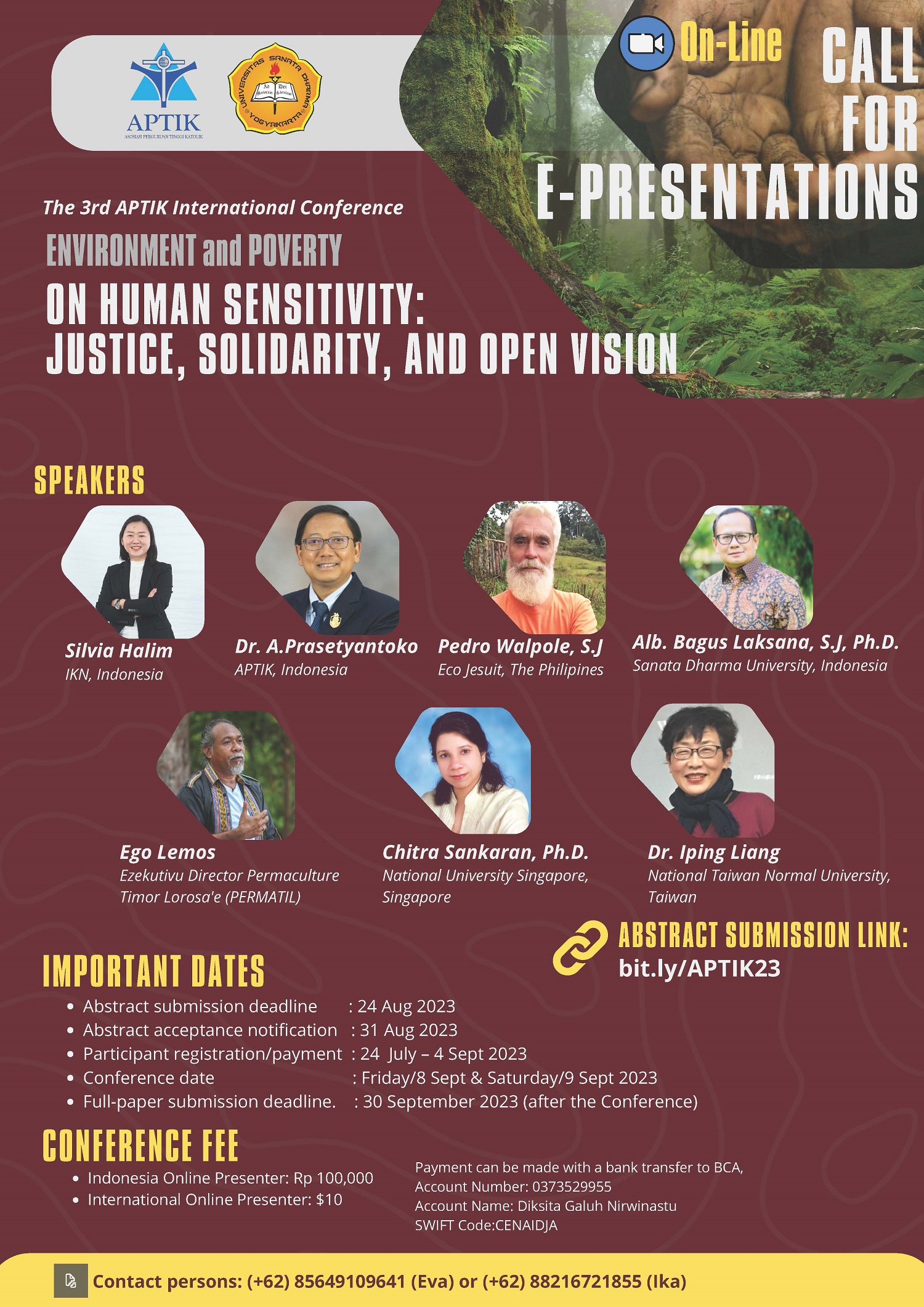
The 3rd APTIK INTERNATIONAL CONFERENCE ON ENVIRONMENT AND POVERTY “HUMAN SENSITIVITY: JUSTICE, SOLIDARITY, AND OPEN VISION”
Background
The COVID-19 lockdown appears to end, and now the “new vision” of living must be prepared in order to face our future. Indeed, the COVID-19 was just one out of the bulk of crisis torturing us, however it has already forced and pushed almost all parts of this Earth into a totally “new experience.” All activities had to break to stay alive for lockdown. They have had to wait and see what the next to undergo is. Even, some may signify that’s about the time for us to be silent and muse of our previously bad conducts. Meanwhile, APTIK’s concern with “environment and poverty,” which has been implemented in the two international conferences in 2018 (by the topic of “Resilience in Poverty Alleviation and Environmental Mitigation”) and in 2020 (“A Sustainable Recovery for People and the Environment”), is still the fruitful flame for contributing the establishment of a better world for all. It means the show must go on. Our certainty is that the COVID-19, therefore, is just a phenomenon disturbing, but not stopping, APTIK’s will to position human dignity among the evil disruptions towards environment and the good efforts of minimizing poverty. What we need then is about sensitivity on justice, solidarity, and open vision.
Father General Arturo Sosa, SJ, as cited by Pedro Walpole, strongly emphasized that injustice is still the greater virus (https://www.ecojesuit.com/learnings-from-a-crisis-in-the-time-of-covid-19). The destructions of environment and ignorant deeds about poverty have been the phenomena, culturally and not naturally, and the struggles of overcoming them are obviously compulsory. The more powerful individual/s and groups must absolutely understand that those have been caused by the exercises of uncontrolled injustice. “This sister now cries out to us because of the harm we have inflicted on her by our irresponsible use and abuse of the goods with which God has endowed her.” (Laudato Si, https://www.vatican.va/content/ francesco/en/encyclicals/documents/papa-francesco_20150524_enciclica-laudato-si.html). Lack of solidarity is also the painful destiny occurring in this present civilization, called the most advanced modern world. In order to mitigate the worst, the need of community solidarity is prominent, by the myth that everyone is kin (Kotakk, 2015, 198). However, since our civilization is continuing to undergo changes, it is a great hope that they would be in the context of improving human quality and dignity, and the emphasis on the importance of justice and solidarity is the priority. It means open vision is the ideal method or approach how to establish a better world for all, and in accordance with APTIK’s concern, the new vision must be structured together with the World’s struggles to overcome environmental violences and poverty. The newness of vision is prominent since the last hardships given by the COVID-19 have successfully struck any aspects of human life, including the common vision’s perspectives dealing with the fights against injustice and anti-solidarity. It may involve technological advancements, health options, law breakthroughs, behavioural discretions, and any other conversions.
Indonesia, who was successful in standing as the presidency of G20 last year, at present is aiming at the new national capital, called IKN, in East Kalimantan. Interestingly, the first principle, out of 8, in building it is about “the agreement with nature,” as delivered “Designed according to Nature”(https://www.ikn.go.id/en). The government really understands that the position of nature, i.e. environment, is prominent and ultimate to support the future Indonesian livings, and consequently nature stands as the first element to consider. This idea seems to counter the present condition of Jakarta, having complicated hardships dealing with, especially, environment or nature.
Therefore, how to improve and sharpen human sensitivity is the important question or problem for those interested in the better World. Any notions, suggestions, concepts, and contributions to create, or at least to imagine, it are waited. Our vocation of being the participants to save our Earth will be concrete later in the 3rd APTIK International Conference, hosted by Universitas Sanata Dharma, next September 2023 in Yogyakarta.
Objectives
As the organization of bringing the spirit of Christianity, especially among the members, APTIK aims to provide opportunity those to share the spirit in and by the same flame. Moreover, disturbed by the problems on “environment and poverty” all are invited to deliver their ideas and suggestions to take part in solving them in in building the better World for all to stay. This international conference is also to prepare forum for those coming from any parts of the world to share and discuss their ideas, so the conference really represents our open vision about the new World.
Important Dates
- Abstract submission deadline : 24 Aug 2023
- Abstract acceptance notification : 31 Aug 2023
- Participant registration/payment : 24 July – 4 Sept 2023
- Conference date : Friday/8 Sept & Saturday/9 Sept 2023
- Full-paper submission deadline. : 30 September 2023 (after the Conference)
-
The 3rd APTIK International Conference 2023
September 8, 2023 – September 9, 2023The 3rd APTIK INTERNATIONAL CONFERENCE ON ENVIRONMENT AND POVERTY “HUMAN SENSITIVITY: JUSTICE, SOLIDARITY, AND OPEN VISION”
Background
The COVID-19 lockdown appears to end, and now the “new vision” of living must be prepared in order to face our future. Indeed, the COVID-19 was just one out of the bulk of crisis torturing us, however it has already forced and pushed almost all parts of this Earth into a totally “new experience.” All activities had to break to stay alive for lockdown. They have had to wait and see what the next to undergo is. Even, some may signify that’s about the time for us to be silent and muse of our previously bad conducts. Meanwhile, APTIK’s concern with “environment and poverty,” which has been implemented in the two international conferences in 2018 (by the topic of “Resilience in Poverty Alleviation and Environmental Mitigation”) and in 2020 (“A Sustainable Recovery for People and the Environment”), is still the fruitful flame for contributing the establishment of a better world for all. It means the show must go on. Our certainty is that the COVID-19, therefore, is just a phenomenon disturbing, but not stopping, APTIK’s will to position human dignity among the evil disruptions towards environment and the good efforts of minimizing poverty. What we need then is about sensitivity on justice, solidarity, and open vision.
Father General Arturo Sosa, SJ, as cited by Pedro Walpole, strongly emphasized that injustice is still the greater virus (https://www.ecojesuit.com/learnings-from-a-crisis-in-the-time-of-covid-19). The destructions of environment and ignorant deeds about poverty have been the phenomena, culturally and not naturally, and the struggles of overcoming them are obviously compulsory. The more powerful individual/s and groups must absolutely understand that those have been caused by the exercises of uncontrolled injustice. “This sister now cries out to us because of the harm we have inflicted on her by our irresponsible use and abuse of the goods with which God has endowed her.” (Laudato Si, https://www.vatican.va/content/ francesco/en/encyclicals/documents/papa-francesco_20150524_enciclica-laudato-si.html). Lack of solidarity is also the painful destiny occurring in this present civilization, called the most advanced modern world. In order to mitigate the worst, the need of community solidarity is prominent, by the myth that everyone is kin (Kotakk, 2015, 198). However, since our civilization is continuing to undergo changes, it is a great hope that they would be in the context of improving human quality and dignity, and the emphasis on the importance of justice and solidarity is the priority. It means open vision is the ideal method or approach how to establish a better world for all, and in accordance with APTIK’s concern, the new vision must be structured together with the World’s struggles to overcome environmental violences and poverty. The newness of vision is prominent since the last hardships given by the COVID-19 have successfully struck any aspects of human life, including the common vision’s perspectives dealing with the fights against injustice and anti-solidarity. It may involve technological advancements, health options, law breakthroughs, behavioural discretions, and any other conversions.
Indonesia, who was successful in standing as the presidency of G20 last year, at present is aiming at the new national capital, called IKN, in East Kalimantan. Interestingly, the first principle, out of 8, in building it is about “the agreement with nature,” as delivered “Designed according to Nature”(https://www.ikn.go.id/en). The government really understands that the position of nature, i.e. environment, is prominent and ultimate to support the future Indonesian livings, and consequently nature stands as the first element to consider. This idea seems to counter the present condition of Jakarta, having complicated hardships dealing with, especially, environment or nature.
Therefore, how to improve and sharpen human sensitivity is the important question or problem for those interested in the better World. Any notions, suggestions, concepts, and contributions to create, or at least to imagine, it are waited. Our vocation of being the participants to save our Earth will be concrete later in the 3rd APTIK International Conference, hosted by Universitas Sanata Dharma, next September 2023 in Yogyakarta.
Objectives
As the organization of bringing the spirit of Christianity, especially among the members, APTIK aims to provide opportunity those to share the spirit in and by the same flame. Moreover, disturbed by the problems on “environment and poverty” all are invited to deliver their ideas and suggestions to take part in solving them in in building the better World for all to stay. This international conference is also to prepare forum for those coming from any parts of the world to share and discuss their ideas, so the conference really represents our open vision about the new World.
Important Dates
- Abstract submission deadline : 24 Aug 2023
- Abstract acceptance notification : 31 Aug 2023
- Participant registration/payment : 24 July – 4 Sept 2023
- Conference date : Friday/8 Sept & Saturday/9 Sept 2023
- Full-paper submission deadline. : 30 September 2023 (after the Conference)

Graduate Student Conference
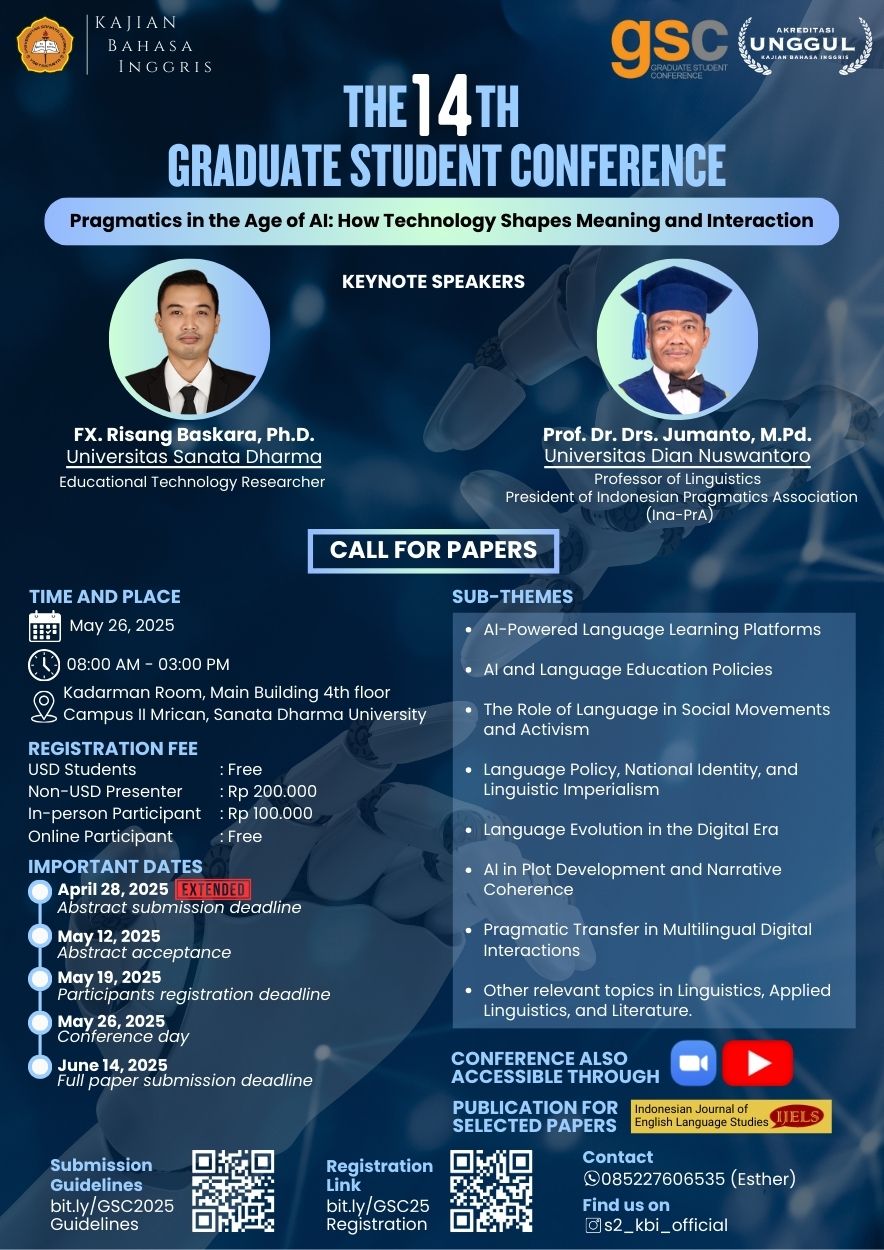 Introduction
Introduction
In the rapidly evolving digital landscape, artificial intelligence (AI) has transformed how humans communicate, interpret meaning, and interact. As AI-driven technologies, such as chatbots, virtual assistants, and machine translation systems, become more sophisticated, they challenge traditional notions of pragmatics by reshaping contextual meaning, implicatures, and speech acts. This conference explores the intersection of AI and pragmatics, investigating how technological advancements influence human interaction, language processing, and discourse strategies in various communicative settings.
With the theme “Pragmatics in the Age of AI: How Technology Shapes Meaning and Interaction,” this graduate student conference provides an opportunity for emerging scholars to discuss the implications of AI on pragmatic theories and real-world communication. We aim to foster an interdisciplinary dialogue that bridges linguistics, artificial intelligence, and digital communication studies. This event will offer critical insights into the evolving dynamics of meaning-making in an AI-mediated world through engaging presentations and discussions.
Purpose and Objective
The objectives of implementing this activity include the following.
- Foster understanding and exploration of the impact of AI on pragmatics, emphasizing how technology shapes meaning and interaction in contemporary communication.
- Facilitate discussions among graduate students on the evolving relationship between AI and pragmatics, encouraging interdisciplinary insights and critical engagement with emerging trends in language and technology.
Theme and Sub-Themes
“Pragmatics in the Age of AI: How Technology Shapes Meaning and Interaction” will cover a range of themes, including, but not limited to:
- AI-Powered Language Learning Platforms
- AI and Language Education Policies
- The Role of Language in Social Movements and Activism
- Language Policy, National Identity, and Linguistic Imperialism
- Language Evolution in the Digital Era
- AI in Plot Development and Narrative Coherence
- Pragmatic Transfer in Multilingual Digital Interactions
- Other relevant Topics in Linguistics, Applied Linguistics, and Literature.
Call for Papers
- Presenters are requested to submit an abstract or full-paper draft.
- Presenters (both individual and team) can only submit one paper.
- Selected papers will be published in Graduate Students Conference 2025 Proceedings and International Journal of English Language Studies (IJELS) (Optional)
- The presenters open from undergraduate, graduate, and doctoral.
- Submission guidelines https://drive.google.com/drive/folders/1Auzpmzq4j0T_T8dwqAmeU235CKJdRbKQ?usp=sharin
Important Dates
- Abstract submission deadline : April 28, 2025
- Abstract acceptance : May 12, 2025
- Participants registration deadline : May 19, 2025
- Conference day : May 26, 2025
- Full paper submission deadline : June 14, 2025
Contribution of Conference Participants
- Universitas Sanata Dharma (USD) students : Free
- Non-USD presenter : Rp. 200.000,-
- In-person participant : Rp. 100.000,-
- Online participant : Free
For Registration
http://bit.ly/GSC25Registration
Transferring
Bank Account : BRI 032401032507509 a/n Febrila Kristi Valentina
-
THE 14TH GSC: "PRAGMATICS IN THE AGE OF AI: HOW TECHNOLOGY SHAPES MEANING AND INTERACTION"
May 26, 2025 – May 26, 2025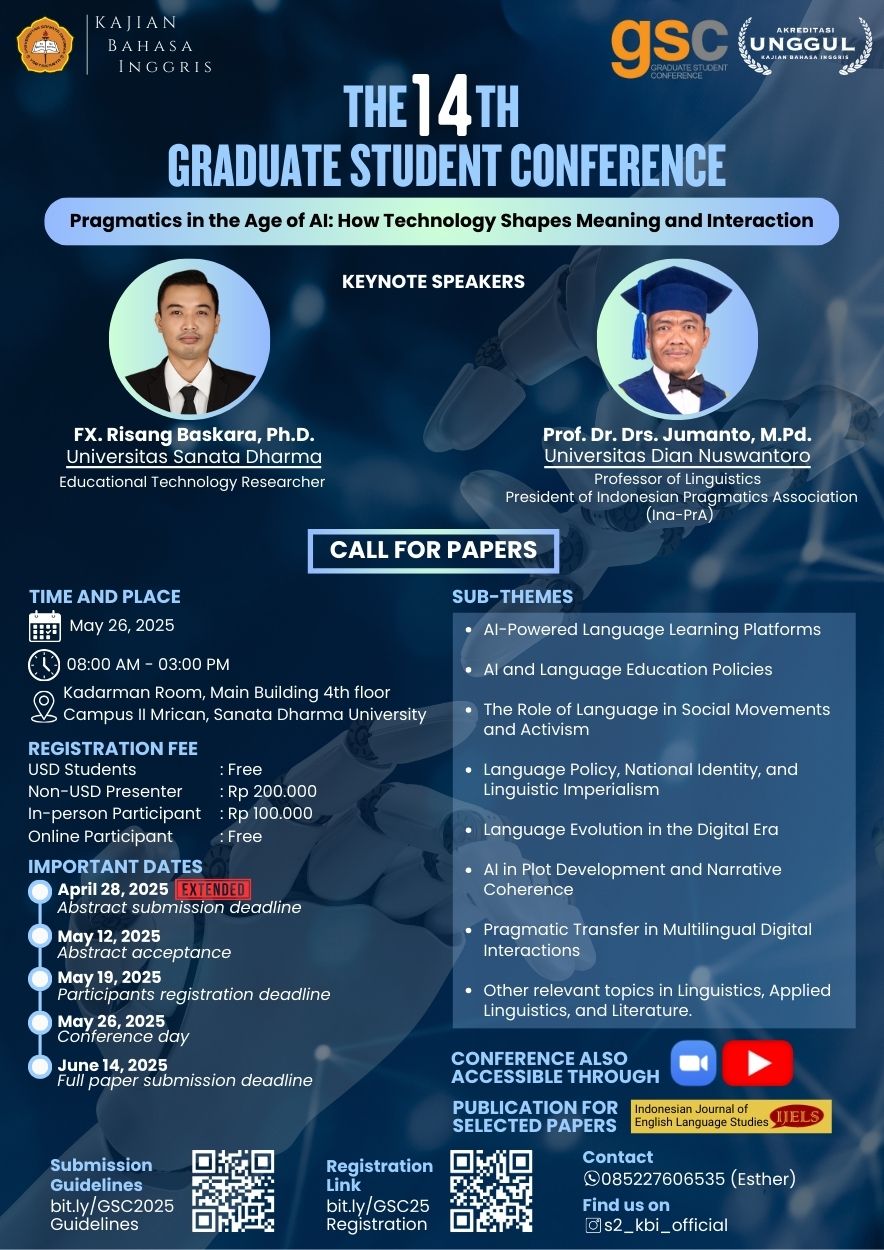
In the rapidly evolving digital landscape, artificial intelligence (AI) has transformed how humans communicate, interpret meaning, and interact. As AI-driven technologies, such as chatbots, virtual assistants, and machine translation systems, become more sophisticated, they challenge traditional notions of pragmatics by reshaping contextual meaning, implicatures, and speech acts. This conference explores the intersection of AI and pragmatics, investigating how technological advancements influence human interaction, language processing, and discourse strategies in various communicative settings.
With the theme “Pragmatics in the Age of AI: How Technology Shapes Meaning and Interaction,” this graduate student conference provides an opportunity for emerging scholars to discuss the implications of AI on pragmatic theories and real-world communication. We aim to foster an interdisciplinary dialogue that bridges linguistics, artificial intelligence, and digital communication studies. This event will offer critical insights into the evolving dynamics of meaning-making in an AI-mediated world through engaging presentations and discussions.
Theme and Sub-Themes
“Pragmatics in the Age of AI: How Technology Shapes Meaning and Interaction” will cover a range of themes, including, but not limited to:
- AI-Powered Language Learning Platforms
- AI and Language Education Policies
- The Role of Language in Social Movements and Activism
- Language Policy, National Identity, and Linguistic Imperialism
- Language Evolution in the Digital Era
- AI in Plot Development and Narrative Coherence
- Pragmatic Transfer in Multilingual Digital Interactions
- Other relevant Topics in Linguistics, Applied Linguistics, and Literature.
Call for Paper
- Presenters are requested to submit an abstract or full-paper draft.
- Presenters (both individual and team) can only submit one paper.
- Selected papers will be published in Graduate Students Conference 2025 Proceedings and International Journal of English Language Studies (IJELS) (Optional)
- The presenters open from undergraduate, graduate, and doctoral.
- Submission guidelines https://drive.google.com/drive/folders/1Auzpmzq4j0T_T8dwqAmeU235CKJdRbKQ?usp=sharing
Important Dates
- Abstract submission deadline : April 28, 2025
- Abstract acceptance : May 12, 2025
- Participant registration deadline : May 19, 2025
- Conference day : May 26, 2025
- Full paper submission deadline : June 14, 2025
Contribution of Conference Participants:
- Universitas Sanata Dharma (USD) students : Free
- Non-USD presenter : Rp. 200.000,-
- In-person participant : Rp. 100.000,-
- Online participant : Free
For Registration
http://bit.ly/GSC25Registration
Transferring
Bank Account : BRI 032401032507509 a/n Febrila Kristi Valentina
Instagram account
gsc.usd / s2_kbi_official
-
THE 13th GSC: "CHILDREN LITERATURE IN THE AGE OF AI: PERSPECTIVES FROM LINGUISTICS, LITERATURE, AND EDUCATION"
May 13, 2024 – May 13, 2024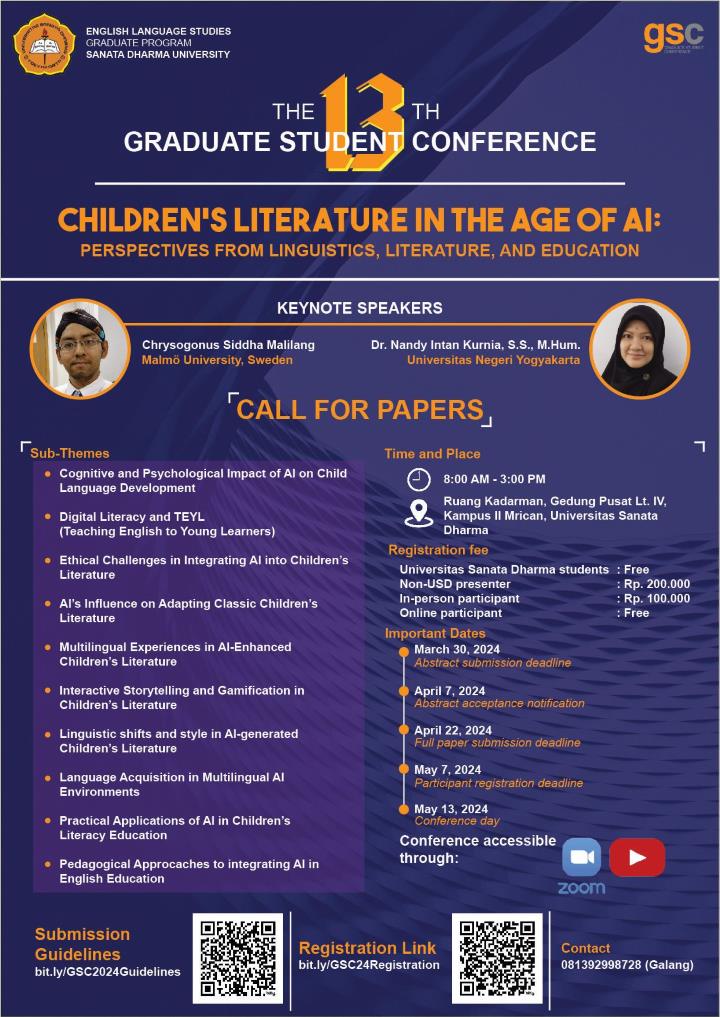
(Vol. 13, 2024)
Introduction
In today's world, children are growing up surrounded by technology and artificial intelligence (AI). Understanding how AI affects their experience with literature is crucial for educators, parents, and researchers. Children's literature plays a big role in helping children learn to read, so it's even more important in this tech-filled environment. As AI becomes more common in schools, it's crucial to see how it can help children learn and be creative, especially in the context of children's literature. This focus gives educators a chance to discuss new and effective ways to use technology in a changing educational landscape.
Integrating AI into children's literature raises ethical questions, like privacy and its impact on children's thinking and emotions. AI also has the potential to make children more engaged and make literature more accessible. Studying these possibilities helps educators and researchers find ways to create interesting and inclusive reading experiences that work for all children. Examining these issues from different perspectives—linguistic, literary, and educational—helps address concerns and find balanced solutions. Looking ahead, the conference theme considers the future of children's literature in the AI age. Encouraging collaboration between linguists, literary scholars, and educators is key. Working together helps us fully understand how children's literature and AI connect. Children's literature is a worldwide thing, and AI affects societies globally. The conference, built around this theme, creates a vital space for an international conversation, letting people share their diverse views and experiences.
Purpose and Objectives
The objectives of implementing this activity include the following.
- Foster understanding and exploration of the impact of AI on children's literature, aiming to enhance literacy practices and address ethical considerations.
- Encourage interdisciplinary collaboration, shape the future of children's literature in the AI age, and inspire innovative solutions that promote both technological literacy and a love for reading.
Theme and Sub-Themes
“Children Literature in the Age of AI: Perspectives from Linguistics, Literature, and Education” will cover a range of themes, including, but not limited to:
- AI’s Impact on Child Language Development in Literature
- Digital Literacy and English Education for Children
- The Potential of AI in Crafting Interactive Children’s Stories
- Ethical Challenges in Integrating AI into Children’s Literature
- Multilingual Experiences in AI-Enhanced Children’s Stories
- Practical Applications of AI in Children’s Literacy Education
- Cognitive and Emotional Effects of AI in Children’s Reading
- AI’s Influence on Adapting Classic Children’s Literature
- Ensuring Inclusivity in AI-Driven Narratives for Children
- Pedagogical Innovations: AI Integration in Children’s Literature Education
Call for Full Paper Procedure
- Presenters are requested to submit a full-paper draft.
- Presenters (both individual and team) can only submit one paper.
- Selected papers will be published in Graduate Students Conference 2024 Proceedings and International Journal of English Language Studies (IJELS) (Optional)
- Submission guidelines: https://bit.ly/GSC2024Guidelines
Important Dates
● Abstract submission deadline : March 30, 2024
● Abstract acceptance notification : April 7, 2024
● Full paper submission deadline : April 22, 2024
● Participant registration deadline : May 7, 2024
● Conference day : May 13, 2024
Contribution of Conference Participants:
- Universitas Sanata Dharma (USD) students : free
- Non-USD presenter : Rp. 200.000,-
- In-person participant : Rp. 100.000,-
- Online participant : free
For Regustration

Transferring
Bank Account: BCA 8465828435 a/n Ucca Diandra Tantra Baswara
Contact Person
Stefanus Galang Ardana : 081392998728
Stanislaus Bayu Kusuma : 085894285584

-
The 12th Graduate Student Conference: "Practicing Critical Digital Literacy For Future Education"
June 19, 2023 – June 19, 2023(Vol. 12, 2023)
Introduction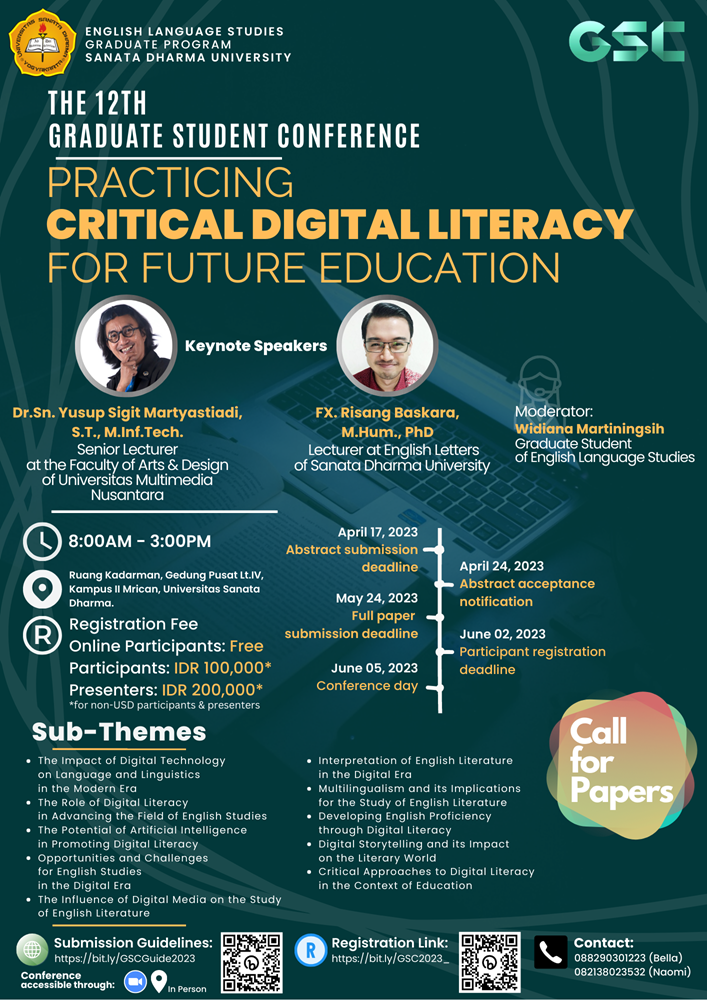
In today's society, technology is becoming an essential aspect of our lives. As the digital age continues to evolve, the need for digital literacy and critical thinking skills is becoming increasingly important, particularly in the context of education.
Digital literacy is the ability to use digital technology, communication tools, and networks to access, manage, integrate, analyze, and evaluate digital information effectively. It includes the capacity to read, interpret, and create a range of digital media, using a variety of digital devices. Digital literacy is a necessary skill for learners of all ages, especially in the modern era, where digital technology is ubiquitous in every aspect of our lives, including education.
However, it is not enough to merely possess digital literacy skills. The ability to think critically about the information we consume and produce in digital spaces is just as crucial. Critical digital literacy is the ability to assess digital information, discerning its credibility, accuracy, and biases. It also involves the capacity to analyze, synthesize, and evaluate digital content to make informed judgments and decisions.
The theme of this conference is crucial in today's world because it addresses the growing need for critical digital literacy skills in education. The conference aims to provide a platform to explore how educators can develop critical digital literacy skills in their students. We believe that by fostering critical digital literacy, students will be better equipped to navigate the vast amount of information available on digital platforms, make informed decisions, and effectively communicate and collaborate with others.
The importance of digital literacy and critical thinking skills in education cannot be overstated. The modern-day classroom is no longer limited to traditional face-to-face interactions between teachers and students. Instead, educators must navigate a diverse range of digital platforms, including social media, blogs, podcasts, and online communities. While digital platforms provide tremendous opportunities for collaboration and learning, they also pose significant challenges. Therefore, Thus, it is important to understand and navigate these hurdles through Practicing Critical Digital Literacy for Future Education.
Keynote Speakers
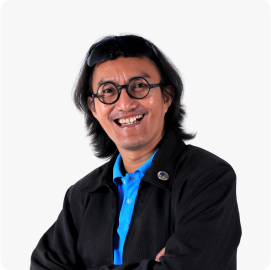
Dr.Sn. Yusup Sigit Martyastiadi, S.T., M.Inf.Tech.
Dr.Sn. Yusup Sigit Martyastiadi, S.T., M.Inf.Tech is a full-time senior lecturer and assistant professor at the Faculty of Arts and Design at Universitas Multimedia Nusantara. He is also a parttime and guest lecturer at the Doctor of Arts Study Program of the Graduate Program at the Indonesia Institute of The Arts, Yogyakarta. With a a strong background in Art, Design, and Technology, he has dedicated himself to researching the aesthetics of interaction, 3D Game, Augmented Reality and Virtual Reality, among others. He earned his Bachelor’s degree from Sanata Dharma University’s Electronics Engineering Program, his Master’s degree in Multimedia Games Development from James Cook University, Australia, and has recently earned his Doctor of Arts degree from the Indonesia Institute of The Arts Yogyakarta.
Dr.Sn. Yusup Sigit Martyastiadi, S.T., M.Inf.Tech’s recent publications include “Observation on The Use of Visual Scripting for Interaction Design Students”, which observes the method of visual programming using the Bolt add-on, "Figur dan Citra: Penceritaan Ki Manteb Sudarsono Melalui Karya Foto Indra Leonardi", which analyzes Ki Manteb Sudarsono’s photo from the perspective of semiotic relations with the storytelling relationship between the image of man, nature, God and the third meaning, and "Aesthetics of Virtual: The Development Opportunities of Virtual Museums in Indonesia", which investigates the aesthetics of virtual museums and offers opportunities in the development of prospective Indonesian virtual museums.
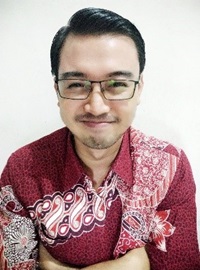
FX. Risang Baskara, M.Hum., PhD
FX. Risang Baskara is a full-time lecturer at the English Letters Department of the Faculty of Letters at Sanata Dharma University in Yogyakarta, Indonesia. With a strong background in Technology-Enhanced Language Learning, Blended and Flipped Learning, he has dedicated himself to advancing language teaching through innovative methods. He earned his Bachelor's degree and Master's degree from Sanata Dharma University's English Letters Department and Graduate Program in English Language Studies, respectively, and has recently earned his Doctor of Philosophy in Education and Technology from Swinburne University of Technology, Sarawak Campus, Malaysia.
FX. Risang Baskara’s most recent publications include "Personalised learning with AI: implications for Ignatian Pedagogy", which presents examples of AI use in educational settings, highlighting the potential benefits and ethical challenges, "Exploring the Implications of ChatGPT for Language Learning in Higher Education", which examines the potential applications and limitations of ChatGPT in language instruction and practice, and "Chatbots and Flipped Learning: Enhancing Student Engagement and Learning Outcomes through Personalised Support and Collaboration", which explores the relationship between chatbots and flipped learning in an educational setting.
Apart from his academic pursuits, FX. Risang Baskara is also an active presence on social media, where he shares his experiences and insights into teaching tools, personal development, and self-improvement. He has also participated in personal and professional development by posting videos about generative AI, language technologies and digital tools on his YouTube channel.
Purpose and Objective
The objectives of implementing this activity include the following.
- As a medium for students majoring in language and language observers to share knowledge and express ideas related to education, linguistics, and English literature within the era of critical digital literacy.
- As a source of knowledge related to education, linguistics, and English literature during times of digital critical literacy, especially for seminar participants.
Theme and Sub-Themes
“Practicing Critical Digital Literacy for Future Education” will cover a range of themes, including, but not limited to:
- The Impact of Digital Technology on Language and Linguistics in the Modern Era
- The Role of Digital Literacy in Advancing the Field of English Studies
- The Potential of Artificial Intelligence in Promoting Digital Literacy
- Opportunities and Challenges for English Studies in the Digital Era
- The Influence of Digital Media on the Study of English Literature
- Interpretation of English Literature in the Digital Era
- Multilingualism and its Implications for the Study of English Literature
- Developing English Proficiency through Digital Literacy
- Digital Storytelling and its Impact on the Literary World
- Critical Approaches to Digital Literacy in the Context of Education
Call for Full Paper Procedure
- Presenters are requested to submit a full-paper draft.
- Presenters (both individual and team) can only submit one paper.
- Selected papers will be published in Graduate Students Conference 2023 Proceedings and International Journal of English Language Studies (IJELS)
- Submission guidelines
Important Dates
Presenter submission deadline : April 17, 2023
Abstract submission deadline : April 17, 2023
Abstract acceptance notification : April 24, 2023
Full paper submission deadline : May 24, 2023
Participant registration deadline : June 02, 2023
Conference day : June 05, 2023
Contribution of Conference Participants :
- Universitas Sanata Dharma (USD) students : free
- Non-USD presenter : Rp. 200.000,-
- In-person participant : Rp. 100.000,-
- Online participant : free
Transferring
Bank Account : Mandiri 1490010314575 a/n Bella Valencia Bawondes
Seminar Nasional Sosial dan Humaniora
Tema
"Mengembangkan Kehidupan Berbangsa Yang Lebih Beradab"
Latar Belakang
Kehidupan bangsa yang beradab di zaman ini ditandai oleh kemajuan masyarakat dalam berpikir kritis, berinovasi secara kreatif, dan berelasi secara harmonis-dinamis-kolaboratif. Istilah harmonis menggambarkan ekosistem kemajemukan yg tetap terjaga, dinamis menggambarkan sikap dan gerakan utk terus memaknai pengalaman keharmonisan agar tidak beku dan mandeg, kolaboratif menggambarkan sikap keterbukaan untuk bergotong-royong secara sinergis ibterdisipliner dalam membangun peradaban.
Dalam konteks Indonesia yang plural, kehidupan bangsa yang beradab dapat juga dimaknai sebagai kehidupan yang di dalamnya keberagaman dan perbedaan dapat dikelola dengan baik sehingga terjadi sinergi, kolaborasi, dan produktivitas tanpa harus berkonflik. Keberagaman dan perbedaan justru mampu dasar untuk mengembangkan sikap penghormatan akan budaya lain, pembelaan terhadap keadilan, dan penyuaraan kaum tertindas dan terabaikan sehingga tercipta harmoni sosial dan penghargaan terhadap martabat manusia.
Dalam membangun kehidupan bangsa yang beradab ini, masyarakat Indonesia perlu memulai dengan menghargai modalitas budaya yang telah dimiliki sendiri, bukan hasil internalisasi nilai-nilai budaya luar yang terkadang kurang kontekstual dan tidak berpihak. Pendidikan yang dijalankan dilakukan dengan pendekatan yang menitikberatkan pada proses dan tujuan relasi yang humanis. Kehidupan spiritualitas perlu dimaknai melalui perspektif teologi yang berpihak pada korban dan yang menyuarakan pihak-pihak yang lemah dan terpinggirkan secara nyata. Perspektif psikologis kehidupan sosial menitikberatkan pada pentingnya pluralitas, kualitas kesejahteraan individu-sosial, kolaborasi, dan harmoninya ekosistem alam dan sosial. Demikian juga bahasa, sastra, dan narasi sejarah perlu menjadi wahana inklusi, “voicing the voiceless”, dan meneriakkan kaum tertindas. Dengan demikian, membangun kehidupan berbangsa yang lebih beradab berarti membangun relasi sosial yang sehat dan penuh harmoni, mengembangkan kehidupan yang inklusif, menghargai keberagaman, mengembangkan spiritualitas yang berpihak pada korban, serta menyuarakan “the voiceless”.
Universitas Sanata Dharma (USD) sebagai salah satu perguruan tinggi yang menjunjung tinggi martabat manusia dan memiliki perhatian khusus terhadap kaum yang terpinggirkan bertekad untuk berpartisipasi dalam mengakomodasi serta membagikan berbagai pemikiran tentang bagaimana membangun kehidupan bermasyarakat dan berbangsa yang lebih beradab dan bermartabat. Untuk itu USD mengadakan seminar SADHAR BERBAGI 2023 dengan tema “Mengembangkan Kehidupan Berbangsa yang Lebih Beradab” dan mengundang akademisi, peneliti, mahasiswa, serta praktisi dari berbagai bidang ilmu-ilmu humaniora, terutama bidang pedagogi, psikologi, teologi, bahasa, sastra, serta sejarah budaya untuk berpartisipasi membagikan pemikiran serta gagasannya terkait tema tersebut.
Tujuan
- Menggali pemikiran tentang pendidikan, teologi, psikologi, bahasa, sastra, dan narasi sejarah yang manusiawi, inklusi, pluralis, kolaboratif, penuh harmoni, dan berpihak pada yang terpinggirkan menuju kehidupan bangsa yang lebih beradab
- Mengeksplorasi berbagai kemungkinan peran yang dapat dimainkan dan sumbangan yang dapat diberikan oleh bidang-bidang pendidikan, psikologi, teologi, bahasa, sastra, dan sejarah untuk kehidupan berbangsa yang lebih beradab
- Mengembangkan gagasan tentang pendidikan, teologi, psikologi, bahasa, sastra, dan narasi sejarah yang manusiawi, inklusi, pluralis, kolaboratif, penuh harmoni, dan berpihak pada yang terpinggirkan sebagai pertimbangan bagi kebijakan dalam perspektif makro serta kehidupan praktis di tingkat mikro
Ruang Lingkup
- Pedagogi
- Teologi
- Psikologi
- Bahasa
- Sastra
- Sejarah
Area Topik
- Pedagogi Humanis
- Pedagogi Reflektif
- Model dan metode pembelajaran
- Media Pembelajaran
- Bimbingan dan pendampingan siswa
- Tata Kelola Lembaga pendidikan
- Identitas dan pengembangan kompetensi guru
- Kurikulum
- Pendidikan Inklusif
- Pendidikan lingkungan hidup
- Teologi Kaum Tertindas
- Teologi Kontekstual
- Psikologi dan Harmoni Sosial
- Psikologi dan Inklusivitas
- Psikologi dan Pluralisme
- Psikologi dan Komunitas
- Psikologi dan Kepemimpinan Organisasi
- Sastra dan “The Voiceless”
- Sastra dan Kelompok Marginal
- Bahasa dan Ketertindasan
- Bahasa dan Inklusivitas
- Bahasa dan Pluralisme
- Narasi Sejarah Kaum Marginal
- Sejarah dan Pluralism
Tanggal Penting
- 26 Mei 2023 : Deadline abstrak
- 01 Juni 2023 : Pengumuman abstrak yang diterima
- 10 Juni 2023 : Deadline penerimaan naskah
- 05 - 24 Juni 2023 : Review Artikel
- 15 Juni 2023 : Hari Seminar
- 01 Juli 2023 : Pengumpulan naskah yang sudah direvisi
- 07 Agustus : Penerbitan prosiding
Publikasi
- Semua artikel dalam seminar ditulis dalam Bahasa Indonesia
- Semua Artikel yang diterima (setelah review) akan diterbitkan pada prosiding ber-ISBN
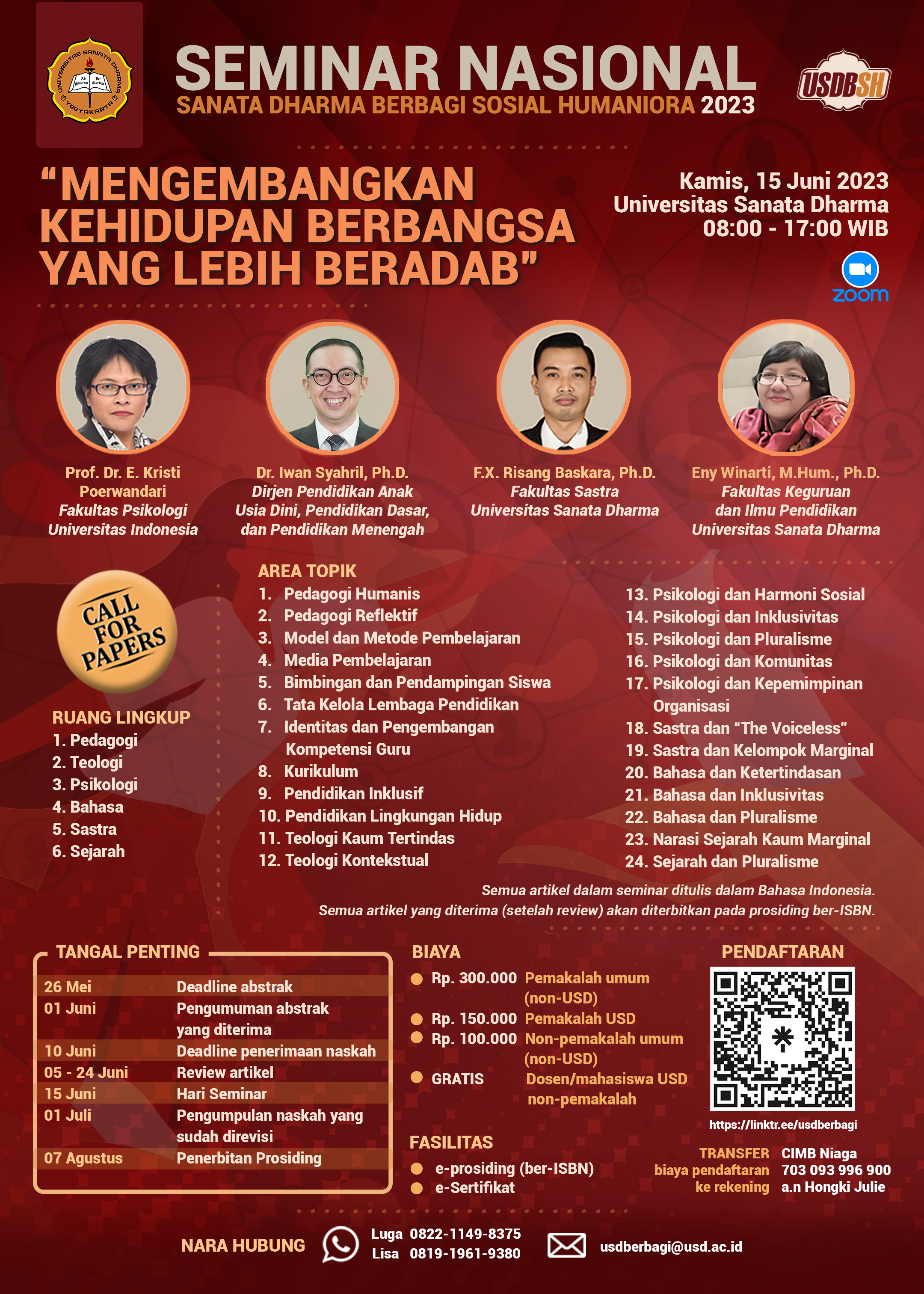
-
Seminar Nasional Sosial dan Humaniora
July 10, 2023 – July 11, 2023Tema
"Mengembangkan Kehidupan Berbangsa Yang Lebih Beradab"
Latar Belakang
Kehidupan bangsa yang beradab di zaman ini ditandai oleh kemajuan masyarakat dalam berpikir kritis, berinovasi secara kreatif, dan berelasi secara harmonis-dinamis-kolaboratif. Istilah harmonis menggambarkan ekosistem kemajemukan yg tetap terjaga, dinamis menggambarkan sikap dan gerakan utk terus memaknai pengalaman keharmonisan agar tidak beku dan mandeg, kolaboratif menggambarkan sikap keterbukaan untuk bergotong-royong secara sinergis ibterdisipliner dalam membangun peradaban.
Dalam konteks Indonesia yang plural, kehidupan bangsa yang beradab dapat juga dimaknai sebagai kehidupan yang di dalamnya keberagaman dan perbedaan dapat dikelola dengan baik sehingga terjadi sinergi, kolaborasi, dan produktivitas tanpa harus berkonflik. Keberagaman dan perbedaan justru mampu dasar untuk mengembangkan sikap penghormatan akan budaya lain, pembelaan terhadap keadilan, dan penyuaraan kaum tertindas dan terabaikan sehingga tercipta harmoni sosial dan penghargaan terhadap martabat manusia.
Dalam membangun kehidupan bangsa yang beradab ini, masyarakat Indonesia perlu memulai dengan menghargai modalitas budaya yang telah dimiliki sendiri, bukan hasil internalisasi nilai-nilai budaya luar yang terkadang kurang kontekstual dan tidak berpihak. Pendidikan yang dijalankan dilakukan dengan pendekatan yang menitikberatkan pada proses dan tujuan relasi yang humanis. Kehidupan spiritualitas perlu dimaknai melalui perspektif teologi yang berpihak pada korban dan yang menyuarakan pihak-pihak yang lemah dan terpinggirkan secara nyata. Perspektif psikologis kehidupan sosial menitikberatkan pada pentingnya pluralitas, kualitas kesejahteraan individu-sosial, kolaborasi, dan harmoninya ekosistem alam dan sosial. Demikian juga bahasa, sastra, dan narasi sejarah perlu menjadi wahana inklusi, “voicing the voiceless”, dan meneriakkan kaum tertindas. Dengan demikian, membangun kehidupan berbangsa yang lebih beradab berarti membangun relasi sosial yang sehat dan penuh harmoni, mengembangkan kehidupan yang inklusif, menghargai keberagaman, mengembangkan spiritualitas yang berpihak pada korban, serta menyuarakan “the voiceless”.
Universitas Sanata Dharma (USD) sebagai salah satu perguruan tinggi yang menjunjung tinggi martabat manusia dan memiliki perhatian khusus terhadap kaum yang terpinggirkan bertekad untuk berpartisipasi dalam mengakomodasi serta membagikan berbagai pemikiran tentang bagaimana membangun kehidupan bermasyarakat dan berbangsa yang lebih beradab dan bermartabat. Untuk itu USD mengadakan seminar SADHAR BERBAGI 2023 dengan tema “Mengembangkan Kehidupan Berbangsa yang Lebih Beradab” dan mengundang akademisi, peneliti, mahasiswa, serta praktisi dari berbagai bidang ilmu-ilmu humaniora, terutama bidang pedagogi, psikologi, teologi, bahasa, sastra, serta sejarah budaya untuk berpartisipasi membagikan pemikiran serta gagasannya terkait tema tersebut.
Tujuan
- Menggali pemikiran tentang pendidikan, teologi, psikologi, bahasa, sastra, dan narasi sejarah yang manusiawi, inklusi, pluralis, kolaboratif, penuh harmoni, dan berpihak pada yang terpinggirkan menuju kehidupan bangsa yang lebih beradab
- Mengeksplorasi berbagai kemungkinan peran yang dapat dimainkan dan sumbangan yang dapat diberikan oleh bidang-bidang pendidikan, psikologi, teologi, bahasa, sastra, dan sejarah untuk kehidupan berbangsa yang lebih beradab
- Mengembangkan gagasan tentang pendidikan, teologi, psikologi, bahasa, sastra, dan narasi sejarah yang manusiawi, inklusi, pluralis, kolaboratif, penuh harmoni, dan berpihak pada yang terpinggirkan sebagai pertimbangan bagi kebijakan dalam perspektif makro serta kehidupan praktis di tingkat mikro
Ruang Lingkup
- Pedagogi
- Teologi
- Psikologi
- Bahasa
- Sastra
- Sejarah
Area Topik
- Pedagogi Humanis
- Pedagogi Reflektif
- Model dan metode pembelajaran
- Media Pembelajaran
- Bimbingan dan pendampingan siswa
- Tata Kelola Lembaga pendidikan
- Identitas dan pengembangan kompetensi guru
- Kurikulum
- Pendidikan Inklusif
- Pendidikan lingkungan hidup
- Teologi Kaum Tertindas
- Teologi Kontekstual
- Psikologi dan Harmoni Sosial
- Psikologi dan Inklusivitas
- Psikologi dan Pluralisme
- Psikologi dan Komunitas
- Psikologi dan Kepemimpinan Organisasi
- Sastra dan “The Voiceless”
- Sastra dan Kelompok Marginal
- Bahasa dan Ketertindasan
- Bahasa dan Inklusivitas
- Bahasa dan Pluralisme
- Narasi Sejarah Kaum Marginal
- Sejarah dan Pluralism
Tanggal Penting
- 26 Mei 2023 : Deadline abstrak
- 01 Juni 2023 : Pengumuman abstrak yang diterima
- 10 Juni 2023 : Deadline penerimaan naskah
- 05 - 24 Juni 2023 : Review Artikel
- 15 Juni 2023 : Hari Seminar
- 01 Juli 2023 : Pengumpulan naskah yang sudah direvisi
- 07 Agustus : Penerbitan prosiding
Publikasi
- Semua artikel dalam seminar ditulis dalam Bahasa Indonesia
- Semua Artikel yang diterima (setelah review) akan diterbitkan pada prosiding ber-ISBN
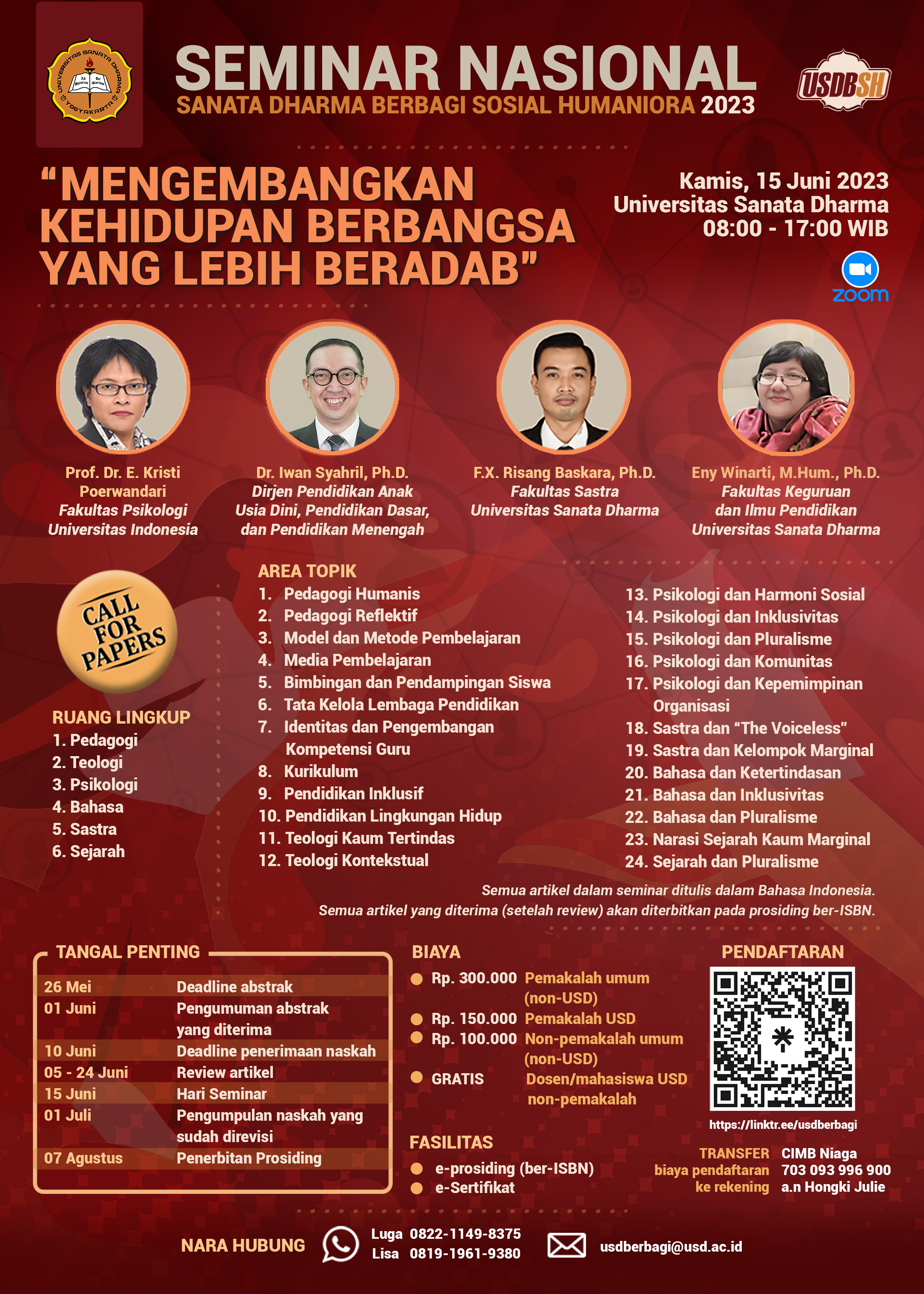
International Conference on Theology, Religion, Culture, and Humanities
The TheoIcon 2025 aims to examine the historical impact and contemporaryrelevance of the First Council of Nicea (325 CE) in Asian Christian contexts, interfaithdialogues, and theological developments. Two fundamental questions that arechallenging to be explored are: First, what was the dispute and historical legacy of theNicean Council? Second, which relevance would this council have especially whenChristian faith is faced with Asian challenges such as secularism, scientificdevelopment, intercultural and interreligious encounter and social problems?
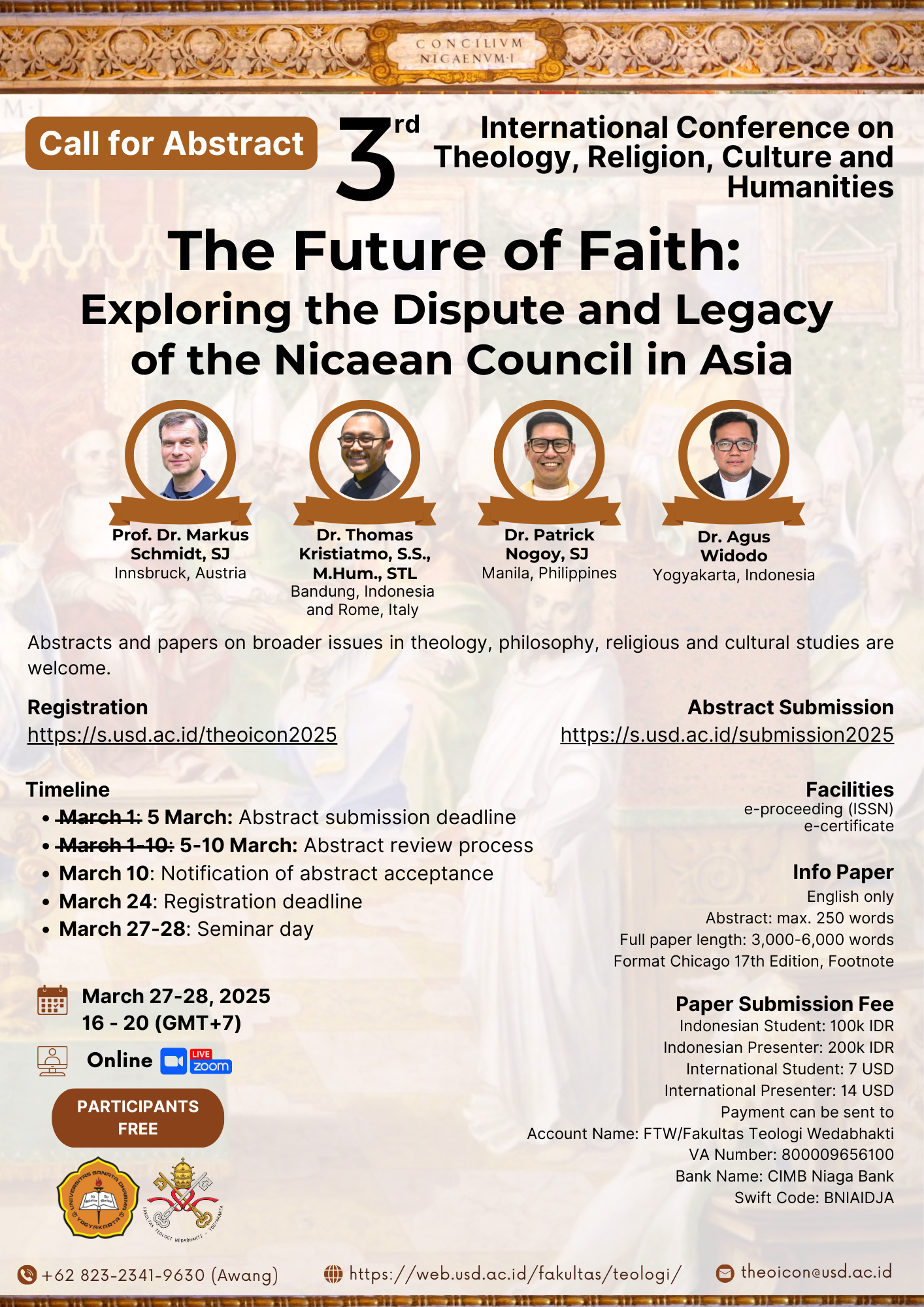
-
Theology International Conference 2026
April 21, 2026 – April 22, 2026The Quest of Being Human in Our Times
The 4th International Seminar on Theology, Religion, Culture And Humanities
Faculty of Theology, Sanata Dharma University, Yogyakarta, Indonesia (Pontifical Faculty of Theology “Wedabhakti”)
Background
With rapid advances in technology, artificial intelligence, shifting societies, environmental challenges, and growing cultural diversity, the question “What does it mean to be human?” is more pressing than ever. In Asia, and especially in Indonesia, this question arises amid communal ways of life, interreligious exchanges, economic disparities, and the ongoing balance between tradition and modernity.
Philosophy and Catholic theology both provide valuable perspectives on human nature, dignity, freedom, and responsibility. Alongside these, recent developments in biology, psychology, insights from Asian wisdom, local cultures, and contextual theologies contribute new understandings to worldwide discussions on philosophical and theological anthropology.
This international seminar aims to create a scholarly space for thoughtful debate and meaningful dialogue about what it means to be human today, with a particular focus on Asian – Indonesian experiences while welcoming global viewpoints.
This seminar is held annually and organized by Faculty of Theology, Sanata Dharma University, Yogyakarta, Indonesia (Pontifical Faculty of Theology “Wedabhakti”).
Panelists
- Dr. M. Joko Lelono (Yogyakarta, Indonesia)
- Rev. Dr. Mark Joseph Zammit (Malta)
- Prof. Dr. Georg Gasser (Augsburg, Germany)
Program
Day 1 – Tuesday, April 21, 2026 (Jakarta Time, GMT+7)
16:00 - 16:10 Opening
16:10 - 16:20 Speech – Prof. Dr. C.B. Mulyatno – Dean
16:20 - 16:30 Speech – Albertus Bagus Laksana SJ, S.S., Ph.D. – Rector
16:30 - 17:15 Speaker 1 (Dr. M. Joko Lelono)
17:15 - 18.00 Speaker 2 (Rev. Dr. Mark Joseph Zammit)
18:00 - 18.45 Speaker 3 (Prof. Dr. Georg Gasser)
18:45 - 19:00 Break
19:00 - 19:45 Discussion
19:45 - 20:00 Closing (Announcement, etc.)
Day 2 - Wednesday, April 22, 2026 (Jakarta Time, GMT+7)
16:00 - 16:10 Opening
16:10 - 17:10 Parallel Session 1
17:10 - 18:10 Parallel Session 2
Participation
Registration: https://s.usd.ac.id/theoicon2026
Call For Paper: Overview
Abstract Submission: https://s.usd.ac.id/submission2026
Venue
Online via Zoom Meeting -
Theology International Conference 2025
March 27, 2025 – March 28, 2025The Future of Faith: Exploring the Dispute and Legacy of the Nicaean Council in Asia
3rd International Conference on Theology, Religion, Culture and Humanities
Faculty of Theology, Sanata Dharma University
Pontifical Faculty of Theology “Wedabhakti”
1. Conference Overview
The international conference “The Future of Faith: Exploring the Disputes and Legacy of the Nicean Council in Asia” aims to examine the historical impact and contemporary relevance of the First Council of Nicea (325 CE) in Asian Christian contexts, interfaith dialogues, and theological developments. We are interested not only in the Nicene Creed as the “result” of the council but also in the historical context, method and model taken by council fathers as well as the impact of the council on the future of Christian faith, especially when it is confronted with contemporary challenges, such as secularism, scientific development, intercultural and interreligious encounter and social problems. Two fundamental questions we are going to explore in this international conference are: First, what was the dispute and historical legacy of the Nicean Council? Second, which relevance would this council have especially when Christian faith is faced with Asian challenges such as secularism, scientific development, intercultural and interreligious encounter and social problems?
2. Conference Objectives
- Analyze the historical significance of the Nicean Council’s decisions in Asian Christianity
- Examine contemporary interpretations of Nicean theology in various Asian contexts
- Explore the intersection of Nicean orthodoxy with Asian philosophical traditions
- Investigate the role of Nicean creeds in modern Asian Christian denominations
- Address challenges in contextualizing Nicean theology in multi-cultural and multi-religious Asian societies
- Address the relevance of Nicean Council for solving social problems in Asia.
3. Conference Scope
The scope of the conference is, but not limited to:
3.1. Historical Perspectives
- Early Christian communities in Asia and their reception of Nicean theology
- Historical disputes and adaptations in Asian contexts
3.2. Theological Discourse
- Trinitarian theology in Asian Christian thought
- Interreligious dialogue and Nicean orthodoxy
- Ecumenical movements and Nicean unity in Asia
- Future directions for Asian Christian theology
- Orthodoxy of Christianity and the Youth in Asia
3.3. Cultural Integration
- The Nicene Council and inculturation of faith
- The reception of the Nicene creed in a multicultural Church
- Religious belonging of Christians in Asia
- Modern apologetics and interreligious dialogue
3.4. Social Problems and Orthodoxy of Faith
- The order and circularity between faith in action and in the celebration (sacraments)
4. Participants
- Theologians and religious scholars, including graduate and postgraduate theological students
- Church leaders and clergy
- Religious studies researchers
- Interfaith dialogue practitioners
- Cultural studies experts
- Church historians
- Religious education specialists
5. Keynote Speakers
5.1. Exploring the Dispute and Legacy of Nicaean Council
- Moderator: Frederick Ray Popo, SJ
- Speaker 1: Prof. Dr. Markus Schmidt, SJ (Austria)
- Speaker 2: Dr. Agus Widodo, Pr (Indonesia)
5.2. The Future of Faith: Nicaea in Asia Today
- Moderator: Jacques Cavin
- Speaker 3: Dr. Patrick Nogoy, SJ (Philippines)
- Speaker 4: Dr. Thomas Kristiatmo, S.S., M.Hum., S.T.L (Indonesia-Italy)
6. Expected Outputs
- Conference proceedings
- Selected papers will be published in journals
7. Technical Requirements
7.1. Paper Submissions
- Abstract length: 300-500 words
- Full paper length: 6,000-8,000 words
- Format: Chicago Manual of Style, 17th Edition
- Language: English (with provisions for translations)
8. Program
Day 1 - Thursday, March 27, 2025 (Jakarta Time, GMT+7)
16:00 - 16:10 Registration
16:10 - 16:20 Opening Ceremony The University Rector (Albertus Bagus Laksana SJ, S.S., Ph.D.)
16:20 - 16:30 The Dean of Faculty (Dr. C.B. Mulyatno)
16:30 - 17:00 Keynote Speaker 1 (Prof. Dr. Markus Schmidt, SJ)
17:00 - 17.30 Keynote Speaker 2 (Dr. Agus Widodo)
17:30 - 18.00 Discussion
18:00 - 18:10 Break
18:10 - 18:40 Keynote Speaker 3 (Dr. Patrick Nogoy, SJ)
18:40 - 19:10 Keynote Speaker 4 (Dr. Thomas Kristiatmo, S.S., M.Hum., S.T.L)
19:10 – 19:40 Discussion
19:40 - 20:00 Closing (Announcement, etc.)
Day 2 - Friday, March 28, 2025 (Jakarta Time, GMT+7)
16:00 - 16:10 Opening
16:10 - 17:10 Parallel Session 1
17:10 - 18:10 Parallel Session 2
For complete program please download this booklet: Conference Book
-
Theology International Conference 2024
March 19, 2024 – March 20, 2024International Seminar on "Faith in Action: Theology for a Changing World"**
Considering the role of theology in appreciating cultural diversity and promoting social cohesion amid cultural tensions.
19-20th March 2024
Faith in Action: Theology for a Changing World
The International Seminar on "Faith in Action: Theology for a Changing World - Embracing Cultural Diversity, Fostering Social Cohesion" aims to explore the dynamic relationship between faith, theology, and our rapidly changing global landscape. With our world becoming increasingly interconnected, the role of theology in appreciating cultural diversity and promoting social cohesion amid cultural tensions becomes ever more crucial. This seminar seeks to unlock the transformative potential of theology, acting as a unifying force that inspires positive action and nurtures an environment where diverse communities can coexist harmoniously.
At the core of faith lies theology, the systematic study of religious beliefs, rituals, and practices. It provides a framework for understanding the relationship between humanity, the cosmos, and the divine, guiding ethical conduct and social engagement. Embracing the wisdom found in theological insights, we uncover commonalities that transcend differences, fostering a sense of interconnectedness and shared humanity among diverse communities.
Cultural diversity enriches human existence, showcasing a vibrant tapestry of traditions, languages, and customs. Theological perspectives that appreciate cultural diversity recognize that each community interprets religious teachings through their unique cultural heritage. This acknowledgement fosters theological discourse that encourages interfaith dialogue, mutual respect, and inclusive approaches to societal challenges.
In a world where cultural tensions and conflicts may arise from misunderstandings about the "other," theology offers a pathway to foster social cohesion. By emphasizing shared values such as compassion, justice, and love, theology encourages dialogue and mutual understanding. Engaging with theological principles nurtures empathy and respect, breaking down barriers that divide us, and promoting an environment where diverse communities can coexist harmoniously.
The transformative role of theology extends to addressing contemporary social challenges, such as poverty, environmental degradation, discrimination, and religious conflicts. By analyzing religious teachings in light of these issues, theology inspires faith communities to be proactive agents of positive change. The seminar will explore how theology can advocate for justice, equality, and human rights, fostering an environment where faith becomes a force for positive social transformation.
Faith communities, as custodians of theology, possess unique influence. This seminar seeks to empower faith communities to proactively address cultural tensions and social problems. By harnessing theological principles and promoting interfaith cooperation, these communities can become beacons of compassion, peace, and social justice, contributing to a more equitable and inclusive world grounded in shared values rooted in faith.
This seminar offers an enriching platform to explore the transformative potential of theology. Through engaging discussions and thought-provoking presentations, participants will gain insights into how theology transcends boundaries, bridges cultures, and fosters harmony. Let us renew our commitment to faith in action, using it as a guiding force to inspire compassion, empathy, and solidarity among all peoples, creating a more inclusive, interconnected, and compassionate world for generations to come. -
Theology International Conference 2023
September 1, 2023 – September 2, 2023INTERNATIONAL CONFERENCE ON THEOLOGY, RELIGION, CULTURE, AND HUMANITIES
Re-Imagining Theology, Religion, Culture, and Humanities Studies for Public Life
28-29 March, 2023 - Online Zoom, Start at 16:00 Western Indonesian Time (GMT +7)
Conference Focus
The dynamics of traditional religion in the public sphere no longer appear black and white, but rather as a richly colored reality that invites further interpretation. In the western hemisphere, various sociological studies show convincing predictions about the decline in affiliation with traditional religions, particularly among young people. Religion is no longer “the sacred canopy” and the final reference for interpreting human life’s struggles. However, in some other parts of the world (particularly Asia) religion appears to be very dominant, if not to say it is intrusive. Religion remains the main reference when people talk about res publica. When religion is still valued as the dominant reference, the challenge is to figure out how religion can avoid falling into internal debates about focusing on individual yet personal piety. The richness of religious traditions should be reinterpreted so that religion is able to make a positive contribution to the growth of collective determination to answer pressing public issues, such as the environmental crisis, conflict and migration, the dominance of economic sphere on the dynamics of politics and communal life, corruption, the widespread demand to recognize personal rights that have not been recognize in traditional societies.
International Conference on Intercultural Humanities
The International Conference on Intercultural Humanities aims to deepen collaboration between Sanata Dharma University and Sogang University, Korea, as members of the Association of Jesuit Universities and Colleges in Asia-Pacific (AJCU-AP). Participants and presenters of this conference are master and doctoral program students from various universities in different countries. The conference fosters enthusiasm for students to attend the conference.
_newwwwwwwwwwwwww.png)
-
International Conference on Intercultural Humanities 2023
February 2, 2023 – February 2, 2023The International Conference on Intercultural Humanities aims to deepen collaboration between Sanata Dharma University and Sogang University, Korea, as members of the Association of Jesuit Universities and Colleges in Asia-Pacific (AJCU-AP). Participants and presenters of this conference are master and doctoral program students from various universities in different countries. The conference fosters enthusiasm for students to attend the conference.
Language and Language Teaching Conference (LLTC)
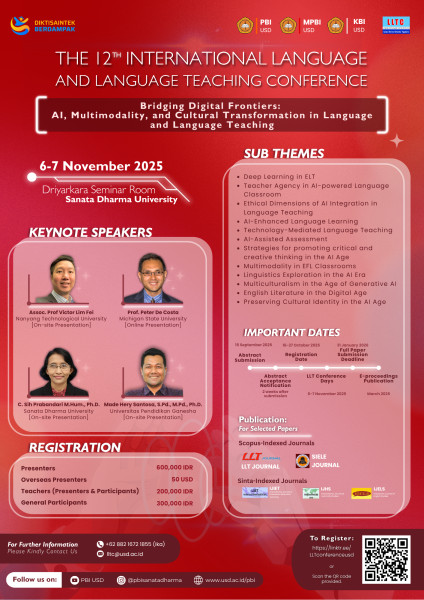
Dear LLTC 2025 full paper authors
Here are seven steps of how to upload your full paper:
1. Log in as an author using your username and password.
2. Click the track "Articles".
3. Complete the Conference Track, Session Type, Submission Checklist.
4. Upload the file (.doc, docx, or .rtf --- but NOT .pdf).
5. Enter the metadata.
6. Upload the supplementary files (if any).
7. Click "Finish Submission" to complete the process.
We are looking forward to receiving your full papers. Thank you.
LLTC 2025 Organizing Committee
The 12th Language and Language Teaching Conference (LLTC) 2025
Thursday and Friday, 6 and 7 November 2025
-
Language and Language Teaching Conference 2025
November 9, 2026 – November 10, 2026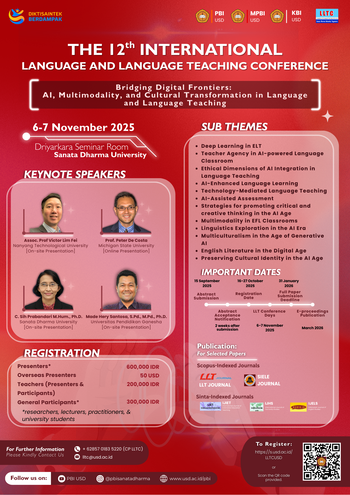
-
Language and Language Teaching Conference 2024
November 9, 2024 – November 10, 2024Welcome to LLTC 2024 ...
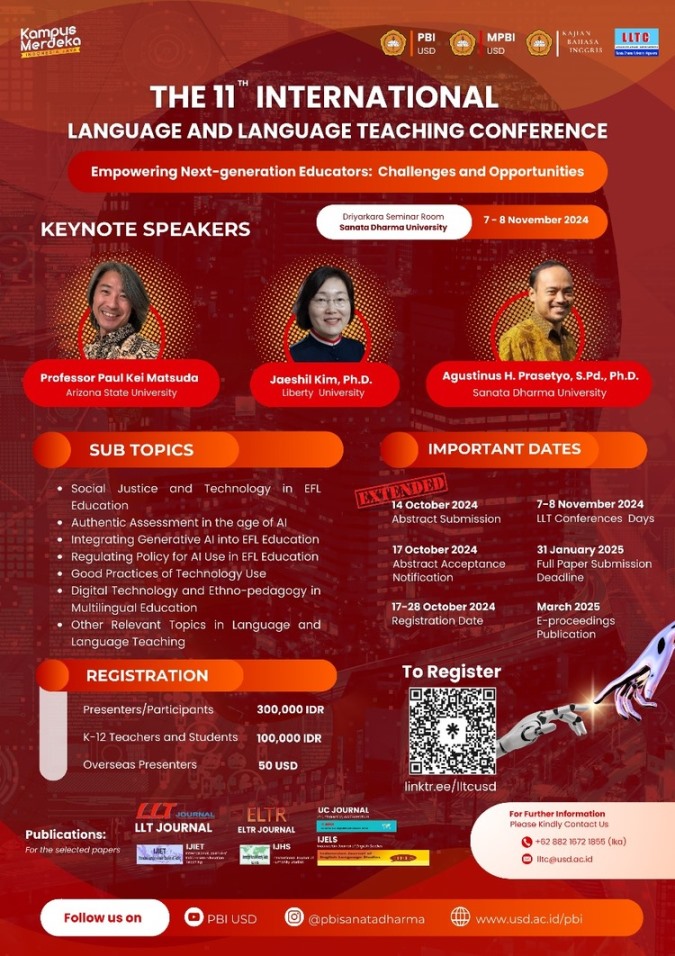
-
Language and Language Teaching Conference 2023
November 9, 2023 – November 10, 2023The 10th Language and Language Teaching Conference (LLTC) 2023
Thursday and Friday, 9 and 10 November 2023

Keynote Speakers
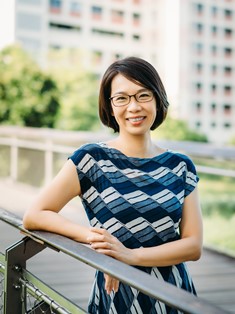
Assoc. Prof. Loh Chin Ee
Loh Chin Ee is Associate Professor and Deputy Head (Research) at the English Language and Literature Academic Group at the National Institute of Education. Her research focuses on future-ready literacies, design of informal learning environments, place-based literature education, school libraries, reading and technology. She is the author of The Space and Practice of Reading: A Case Study of Reading and Social Class in Singapore (Routledge, 2017) and co-editor of Literature Education in the Asia-Pacific (Routledge, 2018), and various scholarly publications. Her co-edited poetry anthologies, Little Things and Poetry Moves, are widely used in Singapore secondary schools. A/P Loh is the Principal and Co-Principal investigator of various large-scale grants, including the Designing School Libraries of the Future study, which was shortlisted for the Singapore President’s Design Award 2023.
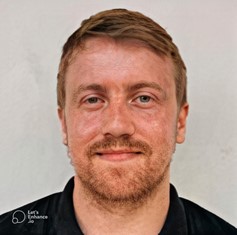
Dr. Nicholas Bremner
Dr. Nicholas Bremner is Lecturer in Language Education at the University of Exeter, UK, where he is Programme Director for the MEd Teaching English to Speakers of Other Languages. His main research focus is exploring the different ways in which learner-centred approaches are conceptualised, and implemented, in diverse teaching contexts. He is also interested in using visual methods such as timelines to enhance reflective practice in teacher education.
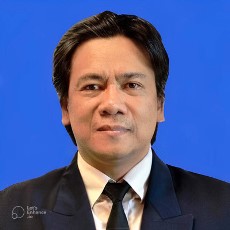
F.X. Ouda Teda Ena, M.Pd., Ed.D.
F.X. Ouda Teda Ena, M.Pd., Ed.D. is a senior lecturer at the English Education Study Program at Sanata Dharma University, Indonesia. He has a profound interest in critical pedagogy, English language teaching, sociolinguistics and ESL. He completed his undergraduate studies at Sanata Dharma University, Yogyakarta, Master's degree at Malang State University, East Java, and Doctor of Education in Curriculum and Instruction at Loyola University Chicago, the United States of America.
Plenary Speakers
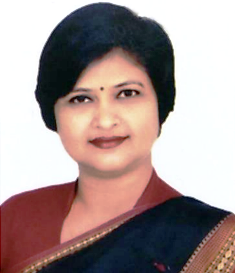
Dr. Sudha Mishra
Dr. Sudha Mishra, of XIM University, Bhubaneswar, Odisha, India, is a passionate and dedicated educator and a seasoned soft skills trainer with over 18 years of rich experience in teaching, training and research; sound understanding of needed traits for workplace success and a strong ability to train students in improving those characteristics. Accomplished in designing pedagogies apposite to students' diverse acquisition styles, with an innate aptitude to understand and inspire.
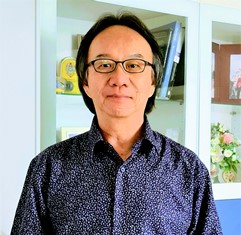
Dr. Willy Ardian Renandya
Dr Willy A Renandya is a language teacher educator with extensive teaching experience in Asia. He currently teaches applied linguistics courses at the National Institute of Education, Nanyang Technological University, Singapore. He has given more than 100 keynote presentations at international ELT conferences and has published extensively in the area of second language education. His publications include Language Teaching Methodology: An anthology of current practice (2002, Cambridge University Press) and Student-centred cooperative learning (2019, Springer International). He maintains a large teacher professional development forum called Teacher Voices: https://www.facebook.com/groups/teachervoices/.
Website: Willy’s ELT Corner https://www.willyrenandya.com
Google Scholar: https://scholar.google.com.sg/citations?user=gHW1fVIAAAAJ -
Language and Language Teaching Conference 2022
November 4, 2022 – November 5, 2022The 9th Language and Language Teaching Conference (LLTC) 2022
Friday and Saturday, 4 and 5 November 2022
Virtual/Online Conference
Dear educators,
The global pandemic caused by the COVID-19 virus has had a disruptive and profound impact on English-language teaching. To reduce the spread of the virus, teachers and learners had to suspend in-person teaching and learning. This led to the widespread adoption of synchronous and asynchronous online teaching. Obviously, this period has led to immense challenges for teachers and students alike, but it has also provided a unique opportunity to understand the potential affordances of online teaching in English-language teaching.
LLTC has become an event of getting new perspectives from experts, researchers, and teaching practitioners in order to deal with the new face of language learning and teaching, linguistics and literature in local and universal contexts. Whether you are a teacher, a lecturer, a researcher, a coordinator, a manager, a material developer, a curriculum specialist, a student, or a professional who is interested in second language education, you are welcomed to participate in our 9th Language and Language Teaching International Conference 2022.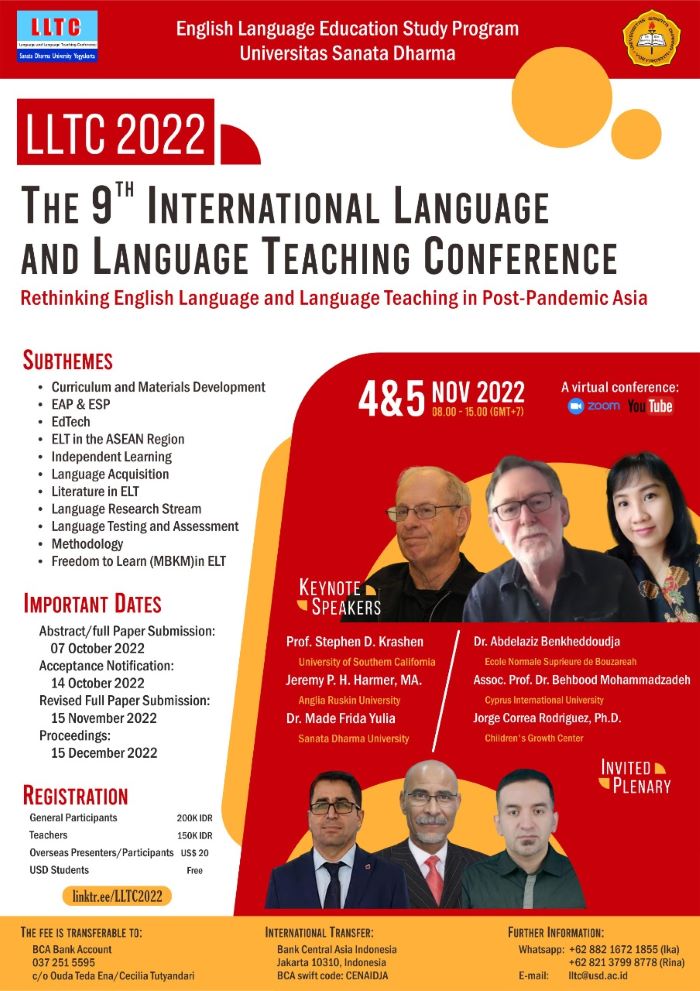
General theme: Rethinking English Language and Language Teaching in Post-Pandemic Asia
Friday-Saturday, 4-5 November 2022⏰ 08.00-16.00 Jakarta time
We are calling for your participation, and believe that your virtual attendance in our annual International conference will be meaningful for your critical learning. The deadline of abstract submission is 7 October 2022! So, hit us up on linktr.ee/LLTC2022.
All the best,
The 9th LLTC Organizing CommitteeSanata Dharma University Yogyakarta, Indonesia
Dear LLTC 2022 full paper authors
Here are seven steps of how to upload your full paper:
1. Log in as an author using your username and password.
2. Click the track "Articles".
3. Complete the Conference Track, Session Type, Submission Checklist.
4. Upload the file (.doc, docx, or .rtf --- but NOT .pdf).
5. Enter the metadata.
6. Upload the supplementary files (if any).
7. Click "Finish Submission" to complete the process.
We are looking forward to receiving your full papers. Thank you.
LLTC 2022 Organizing Committee
-
Language and Language Teaching Conference 2021
September 17, 2021 – September 18, 2021Welcome to LLTC 2021, Virtual, Sanata Dharma University
Yogyakarta, Indonesia
Friday-Saturday, 17-18 September 2021
The Language and Language Teaching Conference (LLTC) is organized annually by the English Language Education Study Programme of Sanata Dharma University, Yogyakarta, Indonesia.
As educators, we are currently facing major shifts in the way we facilitate learning. However, we always thrive to be relevant to this era, especially during this unprecedented time.
We the organizing committee warmly inviting you to participate in LLTC 2021. Our main theme is: Post-Covid 19: Language Learning-Teaching, Linguistics and Literature in Local and Universal Contexts
Subthemes:
1. Current and future language learning-teaching: What, why and how
2. Language learning, linguistics and literature: Diverging or converging
3. Local and universal literature in (English) language learning
4. ELT in MBKM (Freedom of Learning Curriculum)
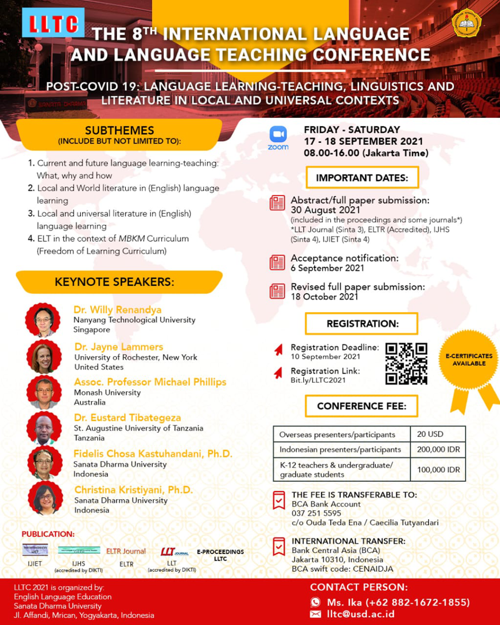
-
Language and Language Teaching Conference 2020
October 30, 2020 – October 31, 2020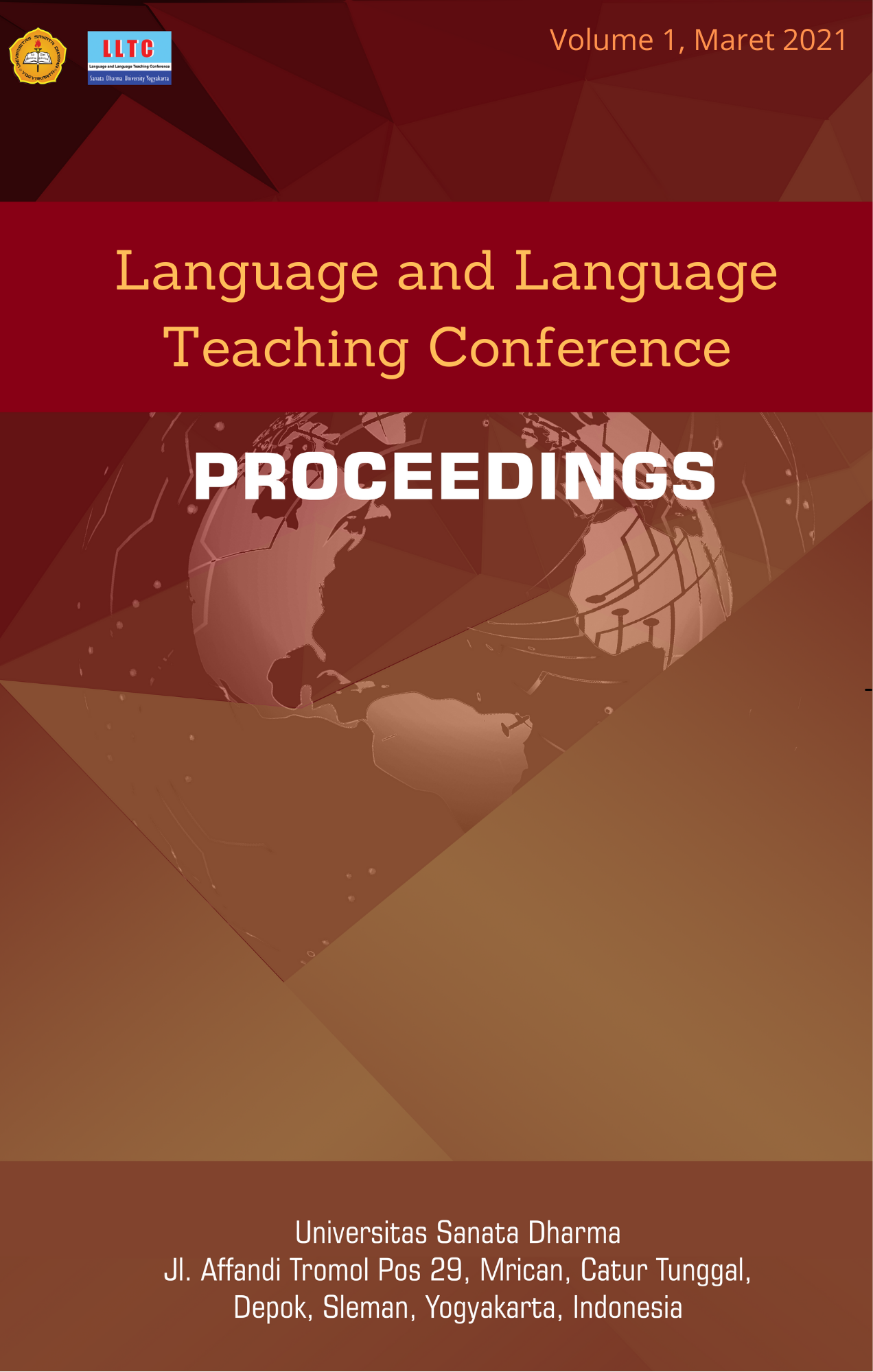
LLTC Proceedings welcome and publish articles presented at the International Language and Language Teaching Conference (LLTC). The conference is organized by the Undergraduate Program of English Language Education in collaboration with the Graduate Program of English Language Education and English Language Studies, Sanata Dharma University on 30 October 2020 – 31 October 2020. These annual e-proceedings, published every March, contain papers on various topics related to English language teaching, literature, and linguistics around language and language teaching.
Dear LLTC 2020 full paper authors
Here are seven steps of how to upload your full paper:
1. Log in as an author using your username and password.
2. Click "Abstract/Paper Submission" on the right panel.
3. Complete the Conference Track, Session Type, Submission Checklist.
4. Upload the file (.doc, docx, or .rtf --- but NOT .pdf).
5. Enter the metadata.
6. Upload the supplementary files (if any).
7. Click "Finish Submission" to complete the process.
We are looking forward to receiving your full papers. Thank you.
LLTC 2020 Organizing Committee
October 30, 2020 – October 31, 2020)
 The Language and Language Teaching Conference (LLTC) is organized annually by the English Language Education Study Programme of Sanata Dharma University, Yogyakarta, Indonesia.
The Language and Language Teaching Conference (LLTC) is organized annually by the English Language Education Study Programme of Sanata Dharma University, Yogyakarta, Indonesia.As educators, we are currently facing major shifts in the way we facilitate learning. However, we always thrive to be relevant to this era, especially during this unprecedented time.
We the organizing committee are calling you out to join the 7th LLTC, 30-31 October 2020. Framed within our theme "Language Learning in the New Era" with the subthemes:
Good practices
Professional development
Becoming adaptive teachers
Other related issues on learning language in the new era
The keynote speakers of LLTC 2020 are:
Dr. Neema B. Han, Leeds Beckett Uversity, UK
Dr. Peter Sayer, Ohio State University, USA
Dr. Rose A. Upor, Dar es Salaam University, Tanzania
Prof. Novita Dewi, Ph.D., Sanata Dharma Unversity, Indonesia
Yohana Veniranda, Ph.D., Sanata Dharma Unversity, Indonesia
Caecilia Tutyandari, Ph.D., Sanata Dharma Unversity, Indonesia
-
Language and Language Teaching Conference 2019
November 29, 2019 – November 30, 2019 -
Language and Language Teaching Conference 2018
December 1, 2018 – December 2, 2018
Literary Studies Conference
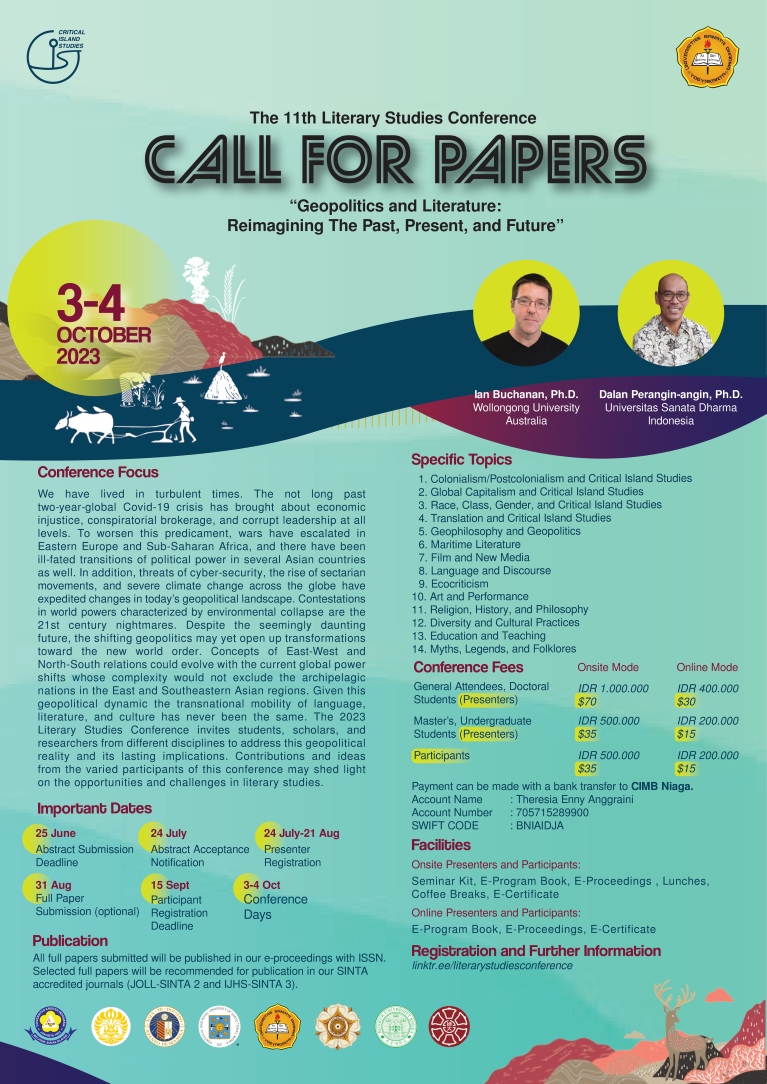
Literary Studies Conference (LSC) is the annual conference held in October by the Department of English Letters and the Graduate Program of English Studies, Universitas Sanata Dharma, Yogyakarta, Indonesia (in cooperation with Ateneo de Manila University, the Philippines). The topics covered in this conference include issues in language, literature, and culture.
-
The 12th LSC 2024: Literary & Cultural Criticism in the Age of Post-theory
LSC 2024: Literary & Cultural Criticism in the Age of Post-theory
-
The 11th LSC 2023 Geopolitics and Literature: Reimagining the Past, Present, and Future
October 3, 2023 – October 4, 2023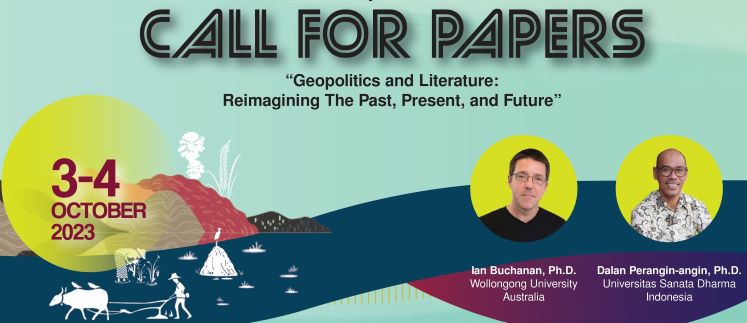











KEYNOTE SPEAKERS
- Ian Buchanan, Ph.D., Wollongong University, Australia
- Dalan Perangin-angin, Ph.D., Universitas Sanata Dharma, Indonesia
CONFERENCE FOCUS
We have lived in turbulent times. The not-long past two-year global Covid-19 crisis has brought about economic injustice, conspiratorial brokerage, and corrupt leadership at all levels. To worsen this predicament, wars have escalated in Eastern Europe and Sub-Saharan Africa, and there have been ill-fated transitions of political power in several Asian countries as well. In addition, threats of cyber-security, the rise of sectarian movements, and severe climate change across the globe have expedited changes in today's geopolitical landscape. Contestations in world powers characterized by environmental collapse are 21st-century nightmares. Despite the seemingly daunting future, the shining geopolitics may yet open up transformation toward the new world order. Concepts of East-West and North-South relations could evolve with the current global power shifts whose complexity would not exclude the archipelagic nations in the East and Southeast Asian regions. Given this geopolitical dynamic, the transnational mobility of language, literature, and culture has never been the same. The 2023 Literary Studies Conference invites students, scholars, and researchers from different disciplines to address this geopolitical reality and its lasting implications. Contributions and ideas from the varied participants of this conference may shed light on the opportunities and challenges in literary studies.
SPECIFIC TOPICS
Colonialism/Postcolonialism and Critical Island Studies; Global Capitalism and Critical Island Studies; Race, Class, Gender, and Critical Island Studies; Translation and Critical Island Studies; Geophilosophy and Geoplotitics; Maritime Literature; Film and New Media; Language and Discourse; Ecocriticism; Art and Performance; Religion, History, and Philosophy; Diversity and Cultural Practices; Education and Teaching; Myths, Legends, and Folklores.
-
The 10th LSC 2022: Critical Envisioning of Literature, Catastrophe, and its (Un)Equal Interplay
December 18, 2022 – December 19, 2022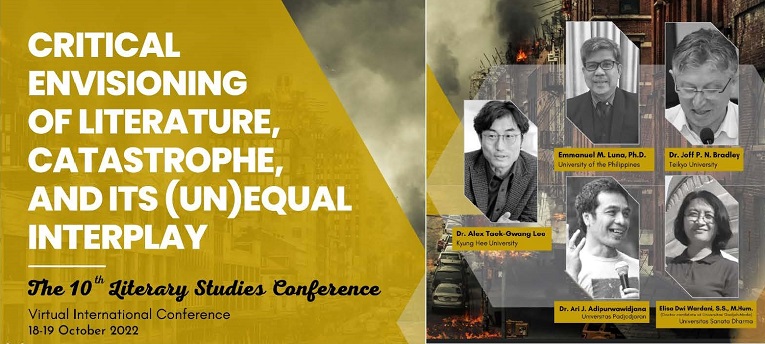
KEYNOTE SPEAKERS
- Dr. Alex Taek-Gwang Lee - Kyung Hee University
- Emmanuel M. Luna, Ph.D. - University of the Philippines
- Dr. Joff P. N. Bradley - Teikyo University
- Dr. Ari J. Adipurwawidjana - Universitas Padjadjaran
- Elisa Dwi Wardani, S.S., M.Hum. (Doctor candidate at Universitas Gadjah Mada) - Universitas Sanata Dharma
CONFERENCE FOCUS
There is a Chinese proverbial blessing: ‘May you not live in interesting times.’ Many of us today have survived through two different centuries with its fin de siecle turmoils, not to mention the catastrophic event of covid pandemic that is still with us now; it is indeed a very ‘interesting time.’ We have experienced this communal affliction not only physically but also in its complex socio-economic and political aspects.
Catastrophe whether in the form of natural disasters, viral and pestilent pandemics, wars, or violences may befall to us indiscriminately, yet it impacts people differently for those privileged or unprivileged ones. We can no longer innocently claim that behind this tragic event we will see the workings of a benevolent God. Susan Sontag in Illness as Metaphor (1988) has shown how diseases such as tuberculosis and cancer are not only literally perceived but has also become a cultural imagination. Media coverage has widely displayed how covid pandemic has been used as a political rhetoric in many parts of the worlds and how capitalist ventures have accumulated big profits in the name of quarantine protections and medical cures.
In literature, scholars have published books articulating diverse perspectives of literature and catastrophe. Similarly, writers have also produced various literary imaginations of catastrophe from ancient Greek to modern times. From time to time, there is a similar discourse of how catastrophe, its roots, and cures are viewed; and it is always the minority groups who have to shoulder more burdens and consequences.
With such contexts in mind, LSC in its decadal anniversary invites writers, scholars, and researchers to present their critical envisioning of literature and catastrophe with its (un)equal power relation to contribute more scholarly insights in the academia and to create more efforts to lessen the social inequality in our communities.
TOPIC AREAS (Include but not limited to)
Race, Class, & Gender; Apocalyptic Literature; Dystopian Literature; New Media; Ecocide; Language of Catastrophe; (Un)Equal Discourses; (Un)Equality Discourses; (Post)Pandemic Teaching; (Post)Pandemic (Un)Equality in Cultural Practices; (Post)Pandemic and the (De)Mystification of Power; (Post)Pandemic Contestation in Everyday Lives; Catastrophe in Religion, History and Philosophy
-
The 9th Literary Studies Conference 2021 : Literature and Interdisciplinarity
October 20, 2021 – October 21, 2021
Undergraduate Conference on ELT, Linguistics and Literature
The Undergraduate Conference (UC) on ELT, Linguistics, and Literature, which is also known as PBI UC, is annually organized by English Language Education Study Program, Sanata Dharma University, Yogyakarta.
The English Language Education Study Program of Sanata Dharma University is thrilled to announce the 11th Undergraduate Conference on “Triumph Tapestry: Empowering Learning, Tailored Teaching with Tech Brilliance.”
This year's conference focuses on exploring the effective use of technology in education. We invite undergraduate students to submit abstracts on innovative teaching practices and research findings that leverage technology to enhance the learning experience.
Topics of Interest (but not limited to):
- Current issues and innovations in ELT
- Current issues in English linguistics
- Current issues in English literature
- Other relevant topics
For further and latest information, check our instagram @uc.pbi.usd
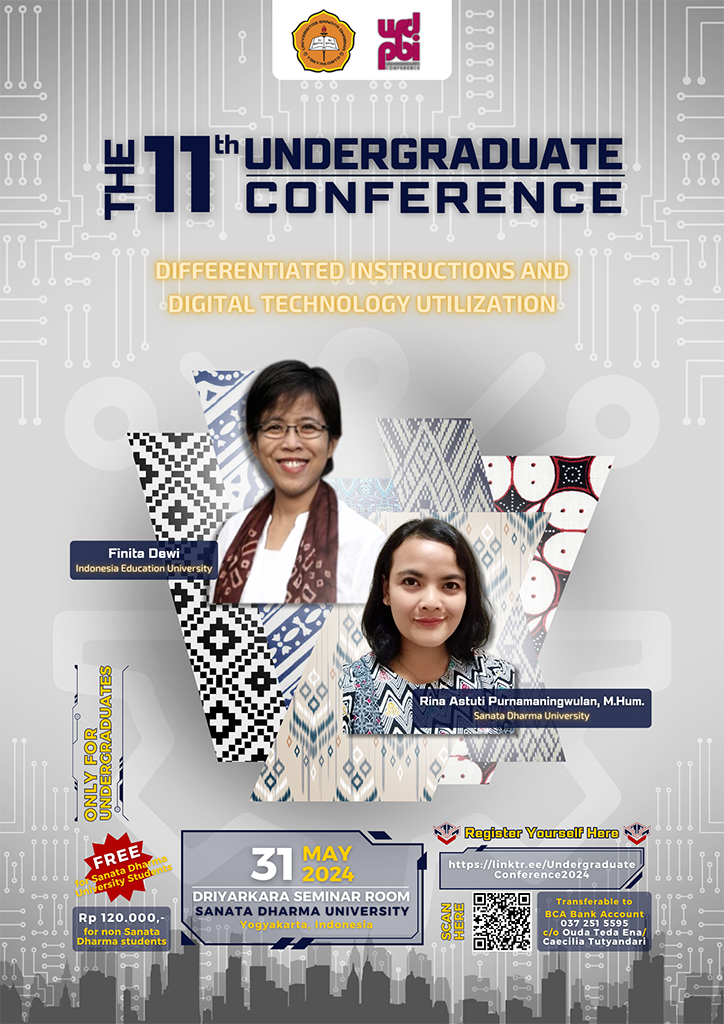
Information for Authors/Presenters
The Undergraduate Conference on ELT, Linguistics and Literature
Abstract Submission Guidelines:
* Abstracts must be written in English and be no more than 300 words.
* Include the title, author(s)' names and affiliations, email address(es), and a short author biography.
* Submit abstracts in Microsoft Word format to the conference website: https://linktr.ee/UndergraduateConference2024
Important Dates:
* Abstract submission deadline: May 8, 2024
* Notification of acceptance: May 14, 2024
We encourage undergraduate students to submit their abstracts and join us for this exciting conference!
How to create an author account? Well, why not try the five main steps below?
1. Visit the UC site: https://e-conf.usd.ac.id/index.php/ucpbi/uc2024
2. Click on menu “Account” from the top of the page.
3. Fill in the author information to the provided fields.
4. Remember to check “Create account as: Author” (Check/mark the Author box).
5. Click on “Create” button. Your UC author account has been created.
Well done! :-))
Steps to Submit an Abstract for UC 2024 Hi fellow UC-ers! Hope the following steps to submit an abstract are helpful.
In Step 1 (START), do the following: 1) Select the conference track (Abstract for UC 2024). 2) Check all of the Submission Checklist. 3) Agree to the terms of Copyright Notice. 4) (Optional) Give comments for conference director. 5) Click “Save and continue”.
In Step 2 (ENTER METADATA), do the following to complete the metadata, for example: 1) Author’s profile. (can add more than 1 author; Order: first author, second author …) 2) Title, abstract and keywords (can copy and paste). 3) Click “Save and continue”.
In Step 3 (UPLOAD SUPPLEMENTARY FILES), do the following: 1) Choose/locate the submission file to upload. 2) Upload your abstract file in .doc, .docx or .rtf format (Use the UC abstract template). 3) Click “Save and continue”.
In Step 4 (CONFIRMATION): For confirmation, click the “finish” button.
Thank you for your abstract submission. UC e-conf: UNDERGRADUATE CONFERENCE 2024 (usd.ac.id) |
-
UNDERGRADUATE CONFERENCE (UC) 2025
June 17, 2025 – June 18, 2025"The role of Artificial Intelligence and Technology in Reading”
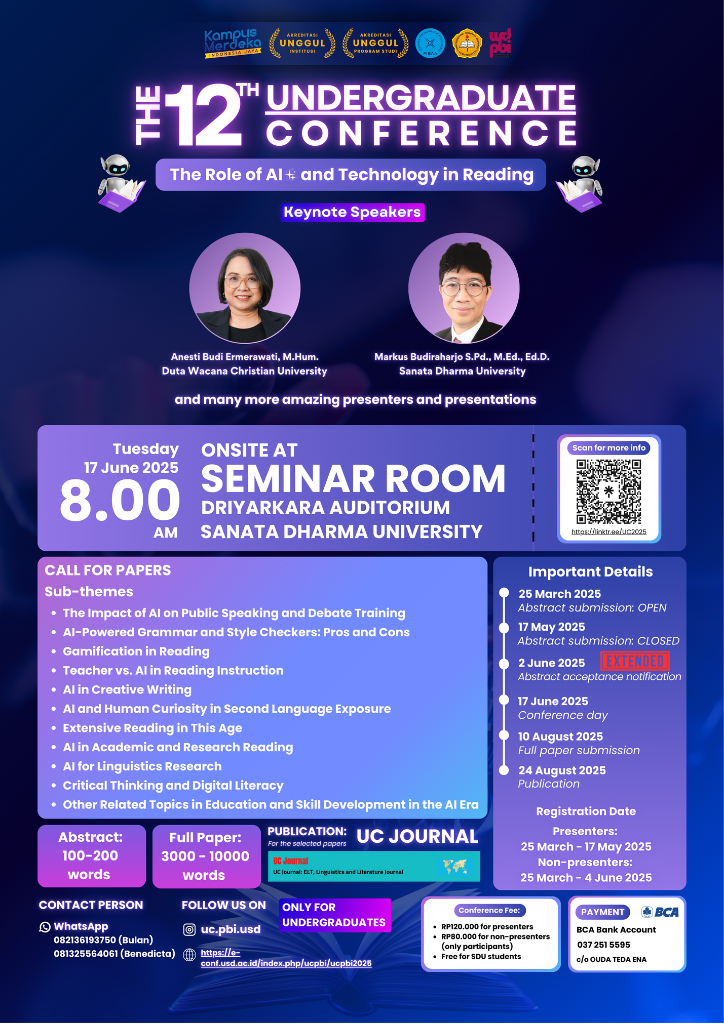
The Undergraduate Conference on ELT, Linguistics, and Literature is an annual conference that is organized by the English Language Education Study Program of Sanata Dharma University, Special Region of Yogyakarta.
In 2025, The 12th Undergraduate Conference on ELT, Linguistics, and Literature is themed “The role of Artificial Intelligence and Technology in Reading”. The themed is chosen in the spirit of ever changing technological advancement and inovation that is integrated into our society. English Language Education Study Program invite undergraduate to come and discuss the topic on June 17th, 2025 at Sanata Dharma University Yogyakarta.
Undergraduates are invited to send their abstracts and paper about the role of Artificial Intelligence and technology in reading that will be published in the 2025 Undergraduate Conference on ELT, Linguistics, and Literature proceedings. The undergraduates can submit their abstract and paper about English Language Education, Linguistics, Literature, or other relevant topics.
For further and latest information, check our instagram @uc.pbi.usd
-
UNDERGRADUATE CONFERENCE 2024
June 6, 2024 – June 7, 2024Undergraduate Conference on ELT, Linguistics and Literature
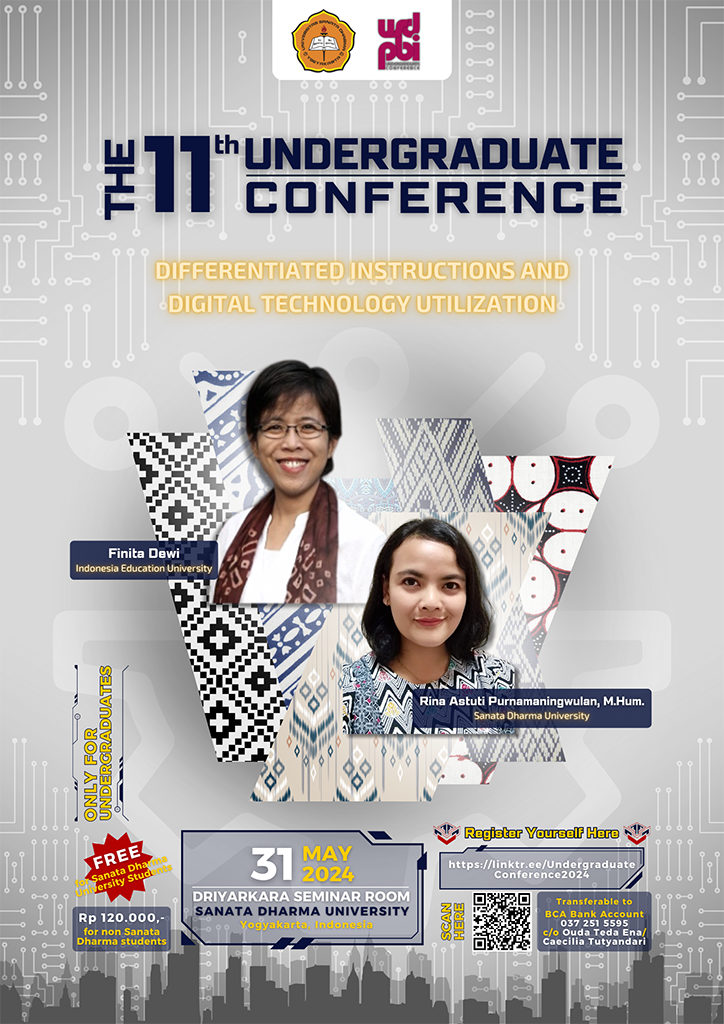
The Undergraduate Conference (UC) on ELT, Linguistics, and Literature, which is also known as PBI UC, is annually organized by English Language Education Study Program, Sanata Dharma University, Yogyakarta.
The English Language Education Study Program of Sanata Dharma University is thrilled to announce the 11th Undergraduate Conference on “Triumph Tapestry: Empowering Learning, Tailored Teaching with Tech Brilliance.”
This year's conference focuses on exploring the effective use of technology in education. We invite undergraduate students to submit abstracts on innovative teaching practices and research findings that leverage technology to enhance the learning experience.
Topics of Interest (but not limited to):
- Current issues and innovations in ELT
- Current issues in English linguistics
- Current issues in English literature
- Other relevant topicsFor further and latest information, check our instagram @uc.pbi.usd
-
UNDERGRADUATE CONFERENCE 2023
June 10, 2023 – June 11, 2023English Language Education Study Program of Sanata Dharma University proudly presents the 10th Undergraduate Conference on "Gamified Language Learning on Post Pandemic Era".
We invite undergraduate students to submit abstracts for our upcoming conference to be held on June 10, 2023 at the Driyarkara Room, Auditorium Universitas Sanata Dharma.
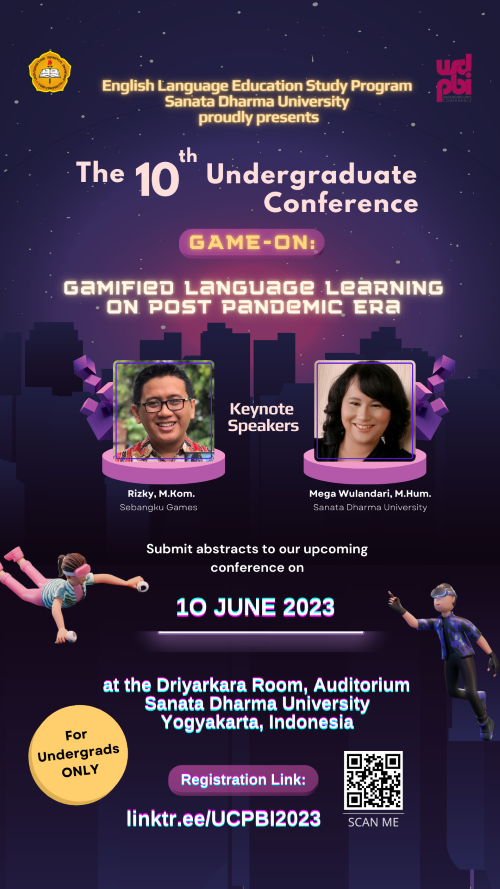 The conference aims to explore the potential of gamification in language learning and provide a platform for sharing innovative teaching practices and research findings in the field.We welcome submissions of abstracts related to, but not limited to, the following topics:
The conference aims to explore the potential of gamification in language learning and provide a platform for sharing innovative teaching practices and research findings in the field.We welcome submissions of abstracts related to, but not limited to, the following topics:- Current issues and innovations in ELT
- Current issues in English lingustics
- Current issues in English literature
- Other relevant topics
Submission Guidelines:- Abstracts should be in English and not exceed 300 words.
- Include the title, author's name(s), affiliation(s), email address, and a brief biography of the author(s).
- Submit your abstracts in Microsoft Word format to our conference website: linktr.ee/UCPBI2023
Important Dates:- Abstract submission deadline: May 8, 2023
- Notification of acceptance: May 22, 2023
- Conference date: June 10, 2023
We look forward to receiving your submissions and to seeing you at our conference!.png)
-
Undergraduate Conference (UC) 2022
August 27, 2022 – August 28, 2022The Undergraduate Conference on ELT, Linguistics, and Literature is annually organized by English Language Education Study Program, Sanata Dharma University, Yogyakarta.
This year, 2022, the one-day UC will be organized on Saturday, 23rd of July 2022 virtually -- online ...
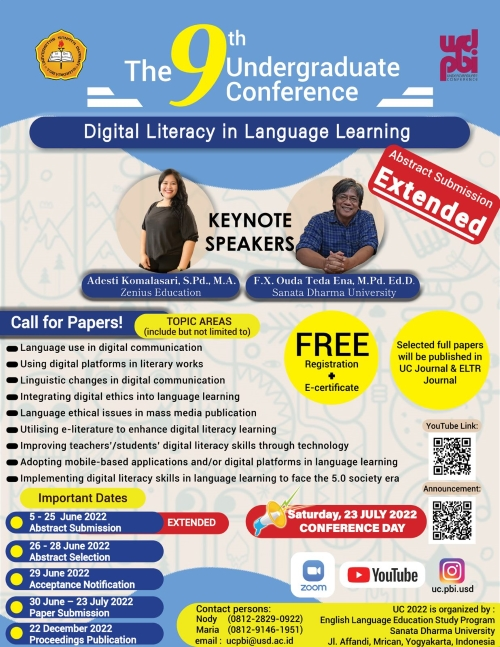
The abstract submission to the 9th Undergraduate Conference is extended to 25 June 2022.
PBI USD proudly presents: The 9th Undergraduate Conference on ELT, Linguistics and Literature: Digital Literacy in Language Learning
We are honoured to invite all undergraduate students to come and join us.
Call for Papers! ONLY FOR UNDERGRADUATE STUDENTS until 25 June 2022.Abstract submission to our OCS website
-
Undergraduate Conference (UC) 2021
May 29, 2021 – May 29, 2021The Undergraduate Conference on ELT, Linguistics, and Literature is annually organized by English Language Education Study Program, Sanata Dharma University, Yogyakarta.
This year, 2021, the one-day UC will be organized on Saturday, 29 May 2021 virtually -- online, mainly due to the Covid-19 pandemic.
For further and latest information, check our instagram @uc.pbi.usd
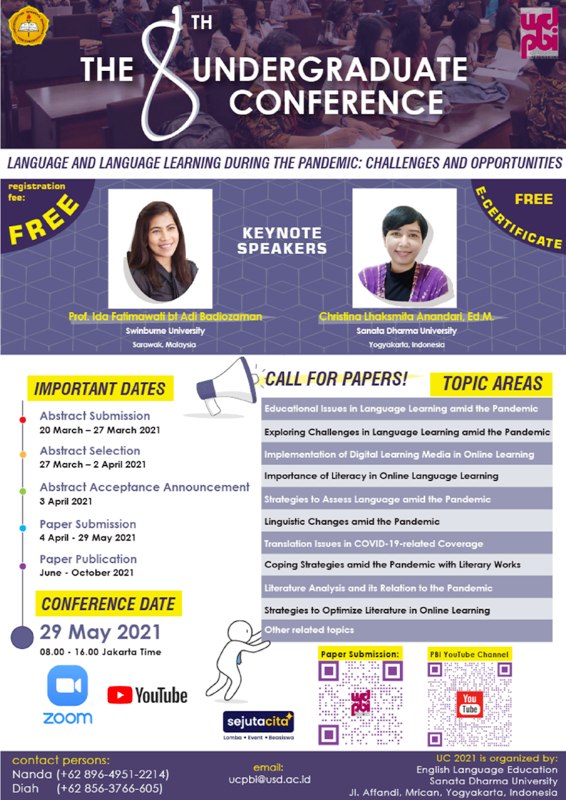
Information for Authors/Presenters
The Undergraduate Conference on ELT, Linguistics and Literature
How to create an author account? Well, why not try the five main steps below?
1. Visit the UC site: http://e-conf.usd.ac.id/index.php/ucpbi/UC
2. To create an account, click on menu “Account” from the top of the page.
3. Fill in the author information to the provided fields.
4. Remember to check “Create account as: Author” (Check/mark the Author box).
5. Click on “Create” button. Your UC author account has been created.
Well done! :-))
Seminar Nasional Fakultas Keguruan dan Ilmu Pendidikan (SNFKIP)
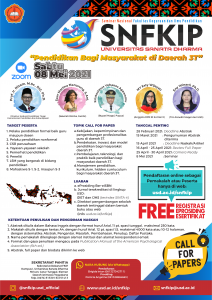
Perkembangan peradaban melaju begitu cepat, namun kemajuan tersebut menyisakan wilayah-wilayah yang tidak cukup menerima stimulan untuk berkembang. Pusat Data Desa Indonesia pada tahun 2019 mencatat 4.777 desa masuk dalam kategori desa tertinggal. Wacana tentang revolusi industri 4.0 dan masyarakat 5.0 cenderung menenggelamkan wacana masyarakat yang hidup di desa tertinggal yang hidup bergantung pada alam dan jauh dari hiruk-pikuk kemajuan teknologi.
Variabilitas perkembangan peradaban di Indonesia nampak sebagai garis kontinum kesenjangan dari masyarakat yang telah berada pada tahap kemajuan sampai masyarakat yang masih memiliki budaya berburu dan meramu. Faktor geografis dan belum meratanya infrastruktur tentu menjadi faktor yang turut mempengaruhi, namun pendidikan selalu menjadi faktor kunci untuk menciptakan mobilitas sosial vertikal.
Perlu kebijakan dan upaya nyata dalam melakukan percepatan pembangunan pendidikan bagi daerah-daerah tertinggal untuk mewujudkan kesetaraan dan keadilan. Berangkat dari kesadaran bahwa pendidikan merupakan faktor kunci dalam upaya mewujudkan masyarakat yang maju dan sejahtera maka pendidikan perlu diletakkan sebagai prioritas kebijakan nasional, regional, maupun ditingkat unit kerja.
Pengalaman menunjukkan bahwa penyelenggaraan pendidikan di daerah tertinggal merupakan masalah yang kompleks. Banyak kendala yang disebabkan oleh faktor internal dari masyarakat tersebut tetapi juga banyak faktor eksternal yang mempengaruhi. Dalam konteks inilah maka pengalaman, pemikiran, dan kebijakan dari berbagai pihak selalu menjadi hal yang berharga untuk dipelajari kembali.
Berangkat dari kesadaran tersebut Fakultas Keguruan dan Ilmu Pendidikan, Universitas Sanata Dharma bermaksud untuk menyelenggarakan Seminar Nasional sebagai forum untuk saling belajar dalam menyelenggarakan pendidikan bagi masyarakat tertinggal. Seminar nasional yang diselenggarakan ini diharapkan dapat menghasilkan rekomendasi pendidikan bagi masyarakat di daerah tertinggal sehingga percepatan kemajuan daerah tertinggal dapat segera terjadi.
Topik Call of Paper :
- Kebijakan, kepemimpinan dan pengembangan profesionalitas guru di daerah 3T.
- Pendekatan, inovasi, dan model pendidikan bagi masyarakat daerah 3T.
- Pembelajaran, teknologi, dan praktik baik pendidikan bagi masyarakat daerah 3T.
- Manajemen pendidikan, kurikulum, hidden curriuculum bagi masyarakat daerah 3T.
Narasumber :
- Nadiem Anwar Makarim, B.A., M.B.A
- MY Esti Wjayati
- Saur Marlina Manurung, S.Ant.
- Kristosimus Yohanes Agawemu
- Eny Winarti, Ph.D.
a. Kebijakan, kepemimpinan dan pengembangan profesionalitas guru di daerah 3T.
b. Pendekatan, inovasi, dan model pendidikan bagi masyarakat daerah 3T.
c. Pembelajaran, teknologi, dan praktik baik pendidikan bagi masyarakat daerah 3T.
d. Manajemen pendidikan, kurikulum, hidden curriuculum bagi masyarakat daerah 3T.
-
SEMINAR NASIONAL FAKULTAS KEGURUAN DAN ILMU PENDIDIKAN 2023
May 14, 2023 – May 15, 2023 -
Seminar Nasional Fakultas Keguruan dan Ilmu Pendidikan 2021
May 8, 2021 – May 8, 2021Seminar Nasional FKIP 2021 (Daring)
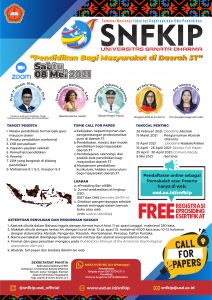 Latar Belakang
Latar BelakangPerkembangan peradaban melaju begitu cepat, namun kemajuan tersebut menyisakan wilayah-wilayah yang tidak cukup menerima stimulan untuk berkembang. Pusat Data Desa Indonesia pada tahun 2019 mencatat 4.777 desa masuk dalam kategori desa tertinggal. Wacana tentang revolusi industri 4.0 dan masyarakat 5.0 cenderung menenggelamkan wacana masyarakat yang hidup di desa tertinggal yang hidup bergantung pada alam dan jauh dari hiruk-pikuk kemajuan teknologi.
Variabilitas perkembangan peradaban di Indonesia nampak sebagai garis kontinum kesenjangan dari masyarakat yang telah berada pada tahap kemajuan sampai masyarakat yang masih memiliki budaya berburu dan meramu. Faktor geografis dan belum meratanya infrastruktur tentu menjadi faktor yang turut mempengaruhi, namun pendidikan selalu menjadi faktor kunci untuk menciptakan mobilitas sosial vertikal.
Perlu kebijakan dan upaya nyata dalam melakukan percepatan pembangunan pendidikan bagi daerah-daerah tertinggal untuk mewujudkan kesetaraan dan keadilan. Berangkat dari kesadaran bahwa pendidikan merupakan faktor kunci dalam upaya mewujudkan masyarakat yang maju dan sejahtera maka pendidikan perlu diletakkan sebagai prioritas kebijakan nasional, regional, maupun ditingkat unit kerja.
Pengalaman menunjukkan bahwa penyelenggaraan pendidikan di daerah tertinggal merupakan masalah yang kompleks. Banyak kendala yang disebabkan oleh faktor internal dari masyarakat tersebut tetapi juga banyak faktor eksternal yang mempengaruhi. Dalam konteks inilah maka pengalaman, pemikiran, dan kebijakan dari berbagai pihak selalu menjadi hal yang berharga untuk dipelajari kembali.
Berangkat dari kesadaran tersebut Fakultas Keguruan dan Ilmu Pendidikan, Universitas Sanata Dharma bermaksud untuk menyelenggarakan Seminar Nasional sebagai forum untuk saling belajar dalam menyelenggarakan pendidikan bagi masyarakat tertinggal. Seminar nasional yang diselenggarakan ini diharapkan dapat menghasilkan rekomendasi pendidikan bagi masyarakat di daerah tertinggal sehingga percepatan kemajuan daerah tertinggal dapat segera terjadi.
Topik Call of Paper :
- Kebijakan, kepemimpinan dan pengembangan profesionalitas guru di daerah 3T.
- Pendekatan, inovasi, dan model pendidikan bagi masyarakat daerah 3T.
- Pembelajaran, teknologi, dan praktik baik pendidikan bagi masyarakat daerah 3T.
- Manajemen pendidikan, kurikulum, hidden curriuculum bagi masyarakat daerah 3T.
Narasumber :
- Nadiem Anwar Makarim, B.A., M.B.A
- MY Esti Wjayati
- Saur Marlina Manurung, S.Ant.
- Kristosimus Yohanes Agawemu
- Eny Winarti, Ph.D.
Seminar Nasional FKIP 2018
Selamat datang di laman Seminar Nasional FKIP Universitas Sanata Dharma 2018!
Universitas Sanata Dharma perlu meningkatkan relevansi dan keunggulan program studi yang sesuai dengan tuntutan zaman. Secara khusus, Fakultas Keguruan dan Ilmu Pendidikannya merasa penting menganggapi revolusi industri 4.0. Ada panggilan yang kuat untuk menyiapkan diri menghadapi era tersebut.
-
Seminar Nasional FKIP 2018
October 13, 2018 – October 13, 2018Selamat datang di laman Seminar Nasional FKIP Universitas Sanata Dharma 2018!
Seminar on Translation
Seminar on Translation is an annual conference held to disseminate and share thoughts, ideas, and research on translation.
-
The 3rd Seminar on Translation 2019 "Translation Pedagogy Towards Industrial Revolution 4.0"
South East Asia Design Research (SEA-DR) International Conference
South East Asia Design Research (SEA-DR) International Conference is an international conference concerned primarily with educational design research situated in a South East Asia perspective or in a South East Asia context. The conference also opens the possibility of discussion in other educational studies from broader perspective and context. The conference aims to enhance theory, research, and practice in educational design research through the academic communication.
-
South East Asia Design Research (SEA-DR) International Conference 2019
July 25, 2019 – July 27, 2019Introduction
Globalization and industrial revolution 4.0 provide immense opportunities for educational development. On the other hand, they are challenges for educational researchers and practitioner to innovate in providing an optimal learning environment for learners. Proactively developing our professionalism is a must in order to create research-informed innovation to our education system. We have to exercise reflective thinking to transform education’s challenges into opportunities.
Based on the aforementioned rationale, South East Asia Design Research (SEA-DR) and Faculty of Teacher Training and Education of Universitas Sanata Dharma invites researchers, practitioners, educators, and policymakers to reflect on design research role in addressing educational challenges through international conference with the theme “Improving Professionalism and Reflective Thinking through Design Research.”
Venue
Selamat datang di Yogyakarta – Welcome to Yogyakarta!
Yogyakarta with the tagline “Jogja Istimewa” itself affirms its special values; the city where the civilization on Java was born, the artsy city among the foremost cultural centres of Indonesia. The city has a number of incredible tourist attractions to be explored; starting from strolling in the magnificent temple of Prambanan, visiting the living museum The Kraton, indulging in the photogenic Parangtritis, shopping in the exotic Malioboro road, to trying the Gudeg—the typical food of this city.
As one of the most popular tourist destination, Yogyakarta easily reached from domestic cities and overseas. There is a lot of domestic and international flight into and out Yogyakarta’s Adisucipto International Airport. A regular train service connects Yogyakarta with other neighbouring major cities. Yogyakarta is also easily accessible by road in cars or public overland bus services.
Hosted by Faculty of Teacher Training and Education of Universitas Sanata Dharma, we are looking forward to welcoming you in Driyarkara Auditorium building, offering the perfect conference setting, and located in the city centre.
Keynotes
- Prof. Toh Tin Lam (Associate Professor in Mathematics & Mathematics Education (MME), National Institute of Education, Singapore)
- Dr. Wanty Widjaja (Faculty of Arts and Education, School of Education, Deakin University, Australia)
- Dr. M.L.A.M. (Maarten) Dolk (Freudenthal Institute for Science and Mathematics Education, Utrecht University, Utrecht, The Netherlands)
- Dr. Hongki Julie, M.Si (Faculty of Teacher Training and Education, Universitas Sanata Dharma, Yogyakarta, Indonesia)
- Prof. Masami Isoda (Department of Mathematics, University of Tsukuba, Japan)
Invited Speakers
- Prof. Dr. Ratu Ilma Indra Putri, M.Si. (Universitas Sriwijaya, Palembang, Indonesia)
- Prof. Turmudi, M.Ed., M.Sc., Ph.D. (Universitas Pendidikan Indonesia, Bandung, Indonesia)
- Dr. Masitah Shahrill (Sultan Hassanal Bolkiah Institute of Education (SHBIE), Universiti Brunei Darussalam, Bandar Seri Begawan, Brunei Darussalam)
- Dr. Ariyadi Wijaya (Universitas Negeri Yogyakarta, Indonesia)
- Dr. Marcellinus Andy Rudhito, S.Pd. (Universitas Sanata Dharma, Yogyakarta, Indonesia)
- Dr. Atiek Winarti, M.Pd., M.Sc. (Universitas Lambung Mangkurat, Banjarmasin, Indonesia)
- Dr. Tatag Yuli Eko Siswono, S.Pd., M.Pd. (Universitas Negeri Surabaya, Indonesia)
- Dr. Meiliasari, S.Pd., M.Sc. (Mathematics Department, State University of Jakarta, Indonesia)
Publication
The SEA-DR 2019 committee strives to submit presented papers in the conference to the open access Journal of Physics: Conference Series (JPCS), and journals which are accredited by The Ministry of Research, Technology, and Higher Education of Republic of Indonesia: Jurnal Pendidikan IPA Indonesia (Indonesian Journal of Science Education) (Scopus Q3, DOAJ, and Sinta 1), Journal on Mathematics Education (indexed by Scopus and Sinta 1), Jurnal Pendidikan Matematika (DOAJ and Sinta 2), Research and Evaluation in Education (REiD) (DOAJ and Sinta 2), Infinity Journal (DOAJ and Sinta 2), and International Journal on Emerging Mathematics Education (IJEME) (DOAJ and Sinta 2).


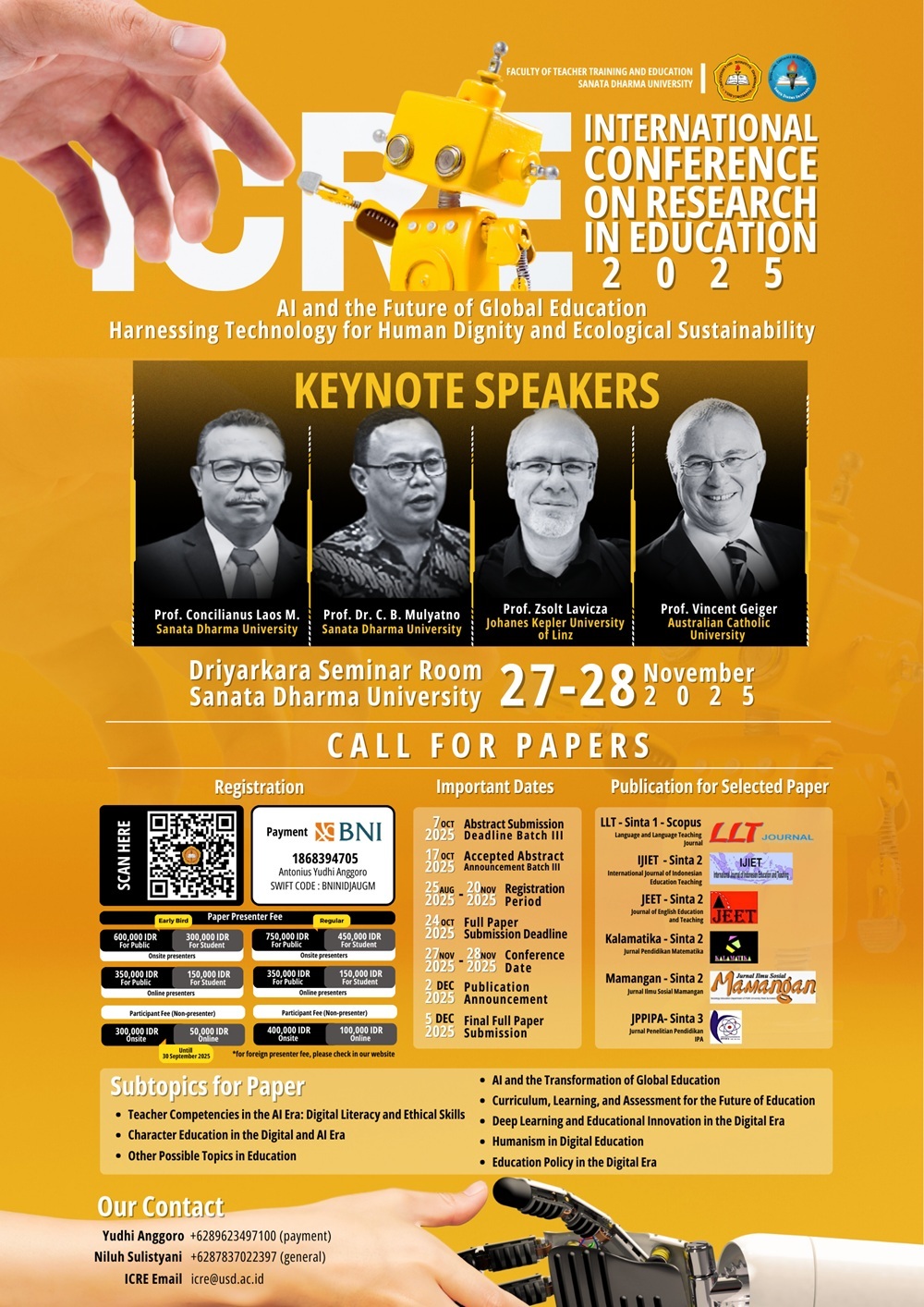




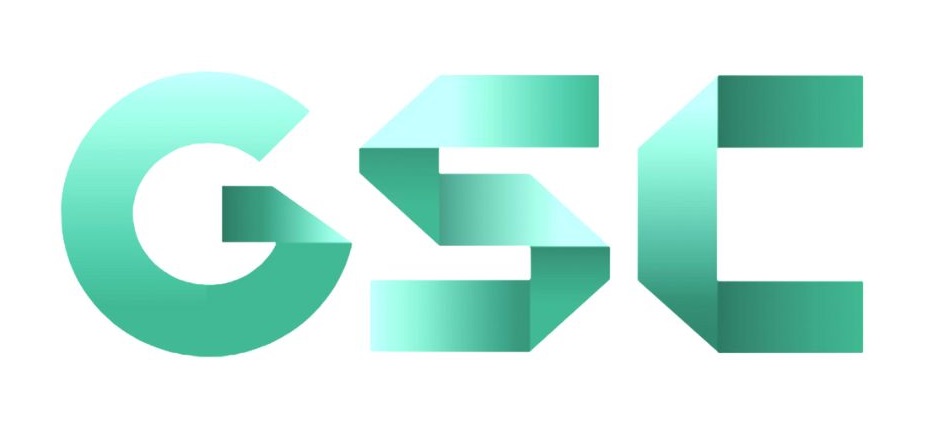 Graduate Student Conference (GSC) is organized by the Graduate Program in English Language Studies, Sanata Dharma University, Yogyakarta, Indonesia.
Graduate Student Conference (GSC) is organized by the Graduate Program in English Language Studies, Sanata Dharma University, Yogyakarta, Indonesia.